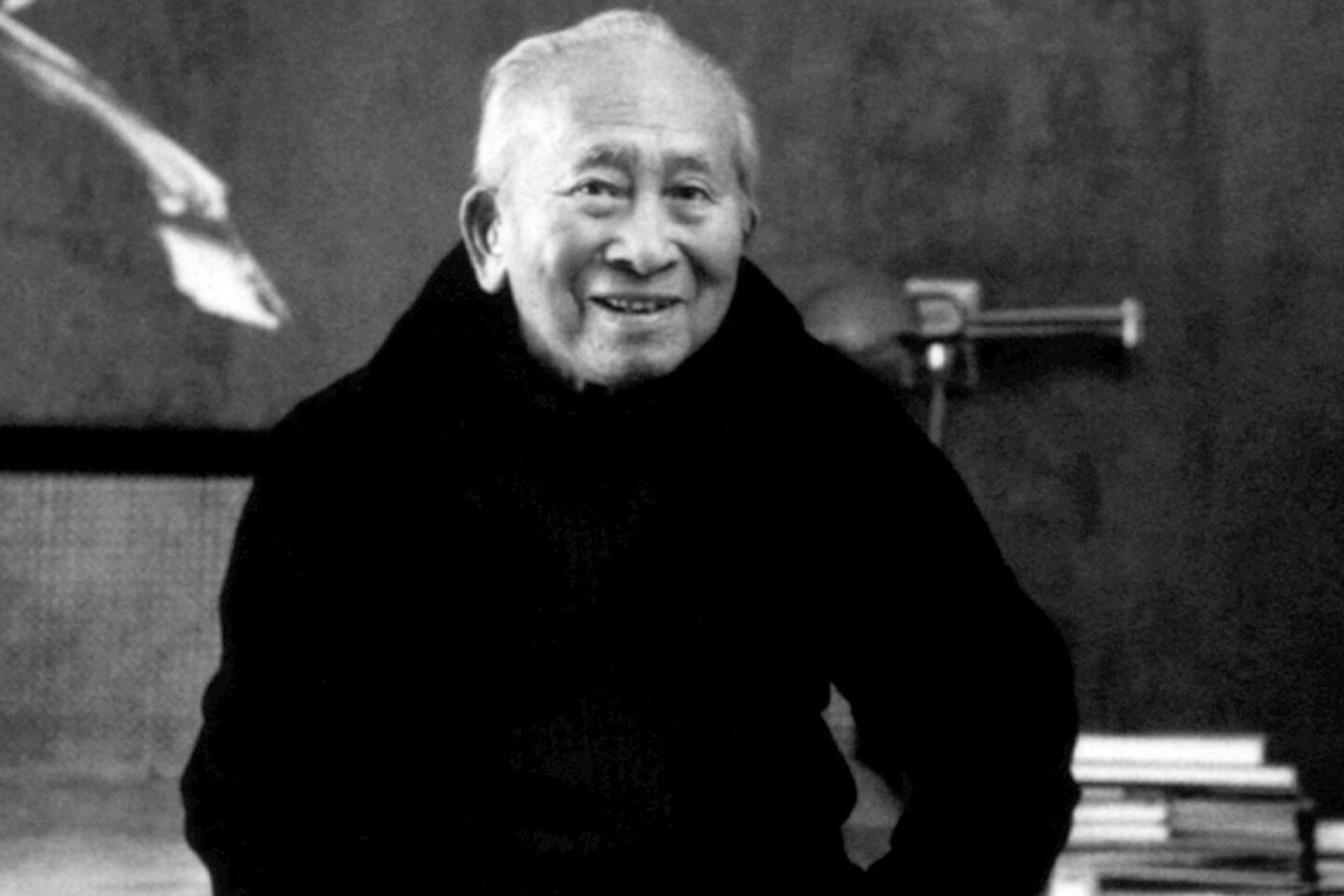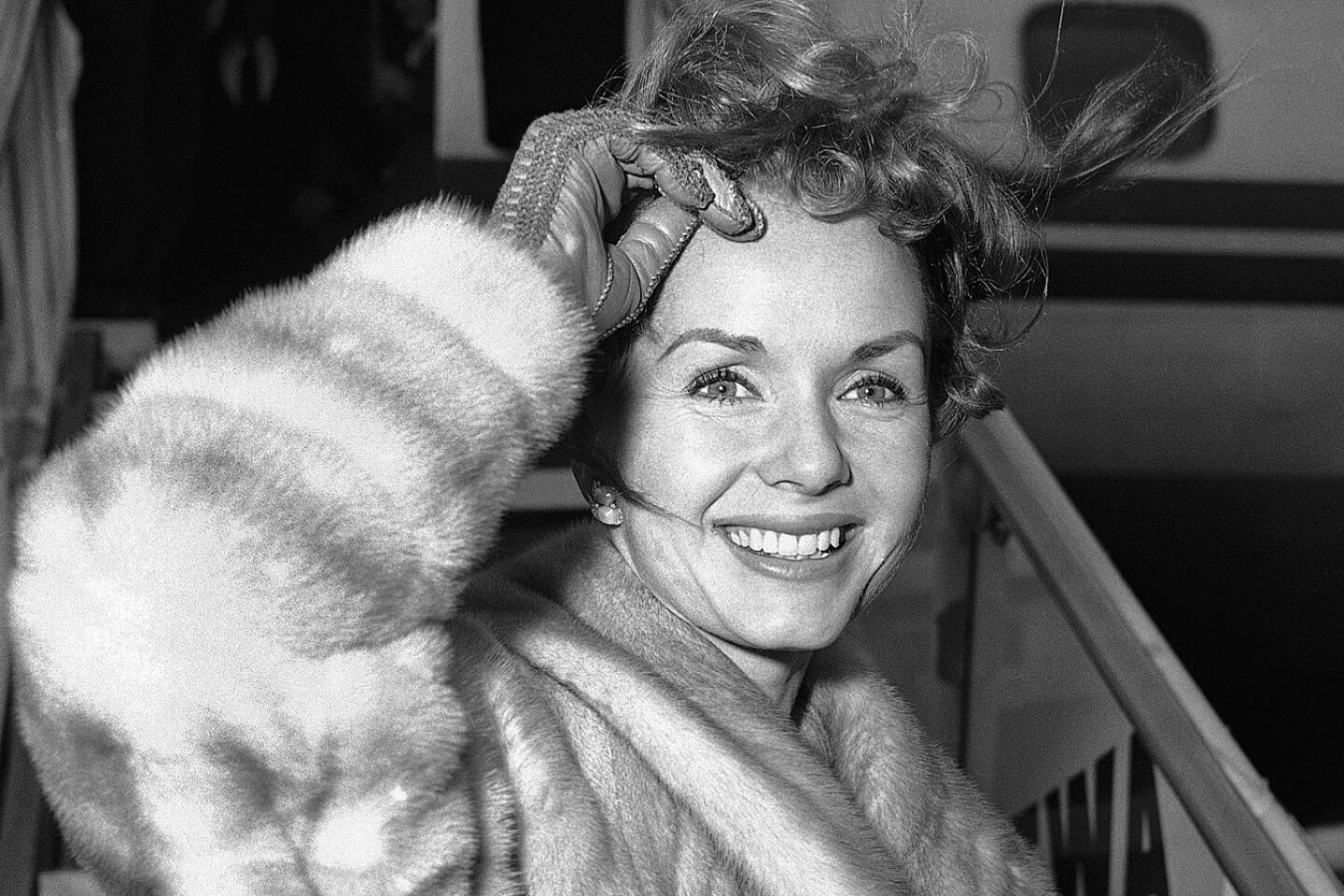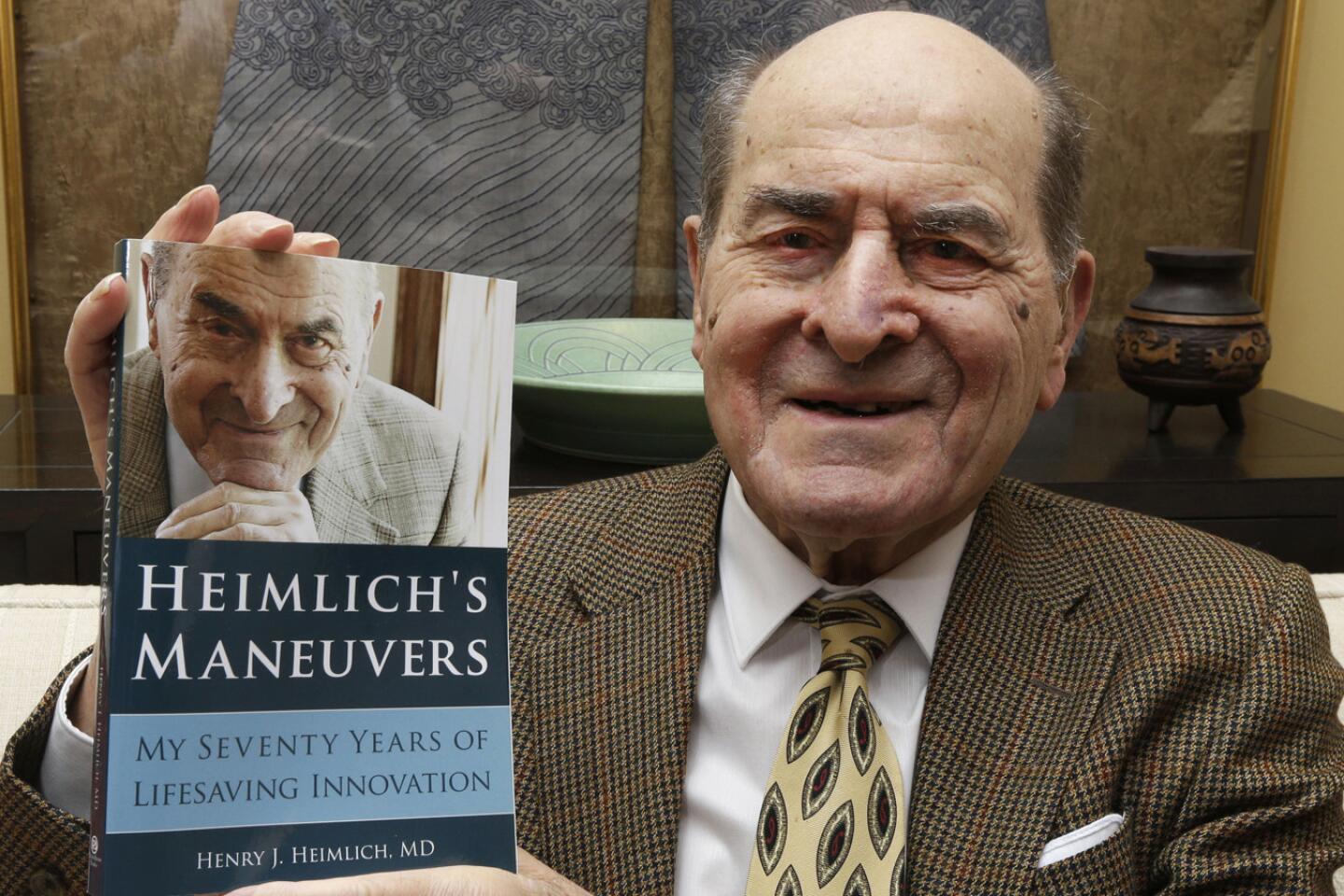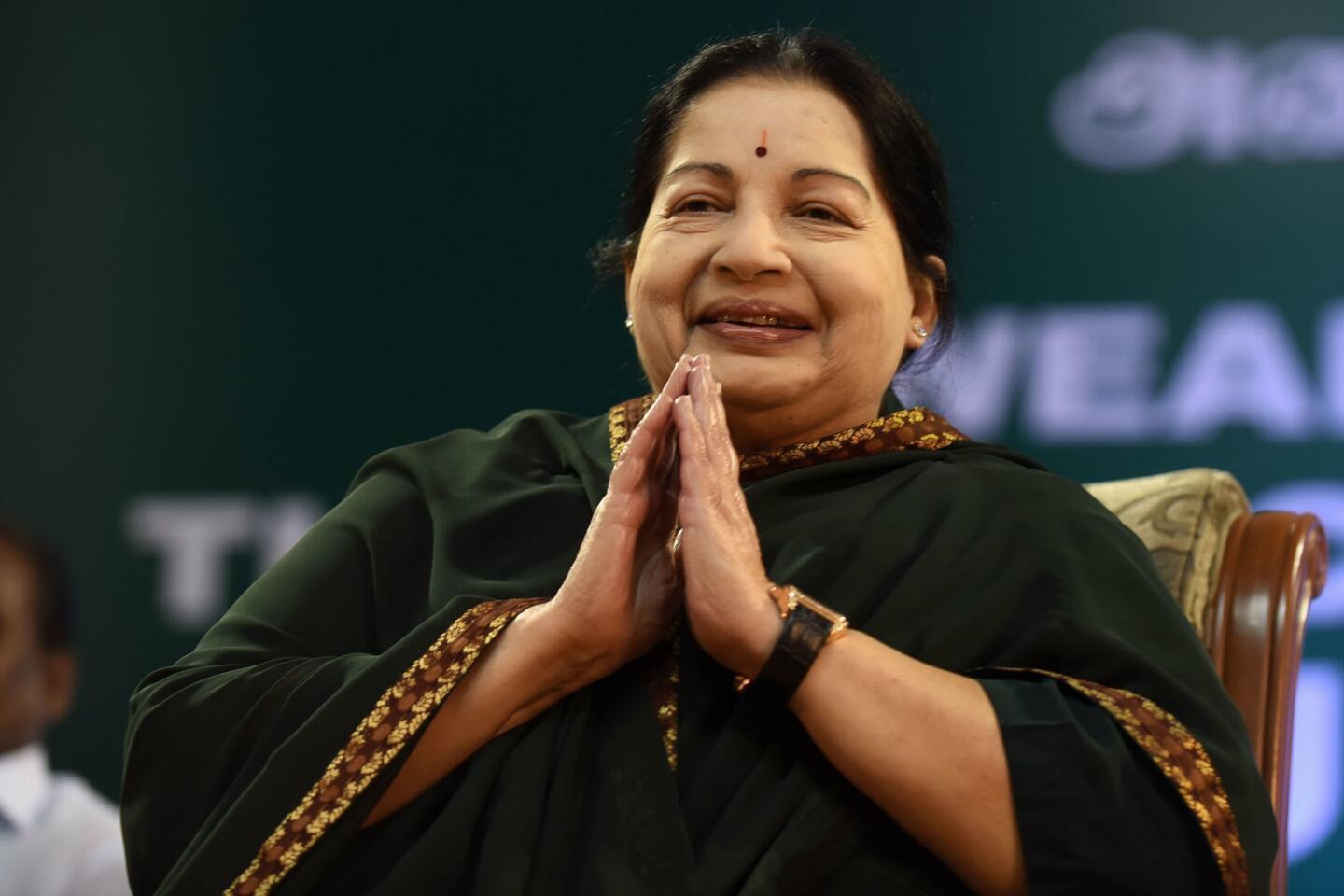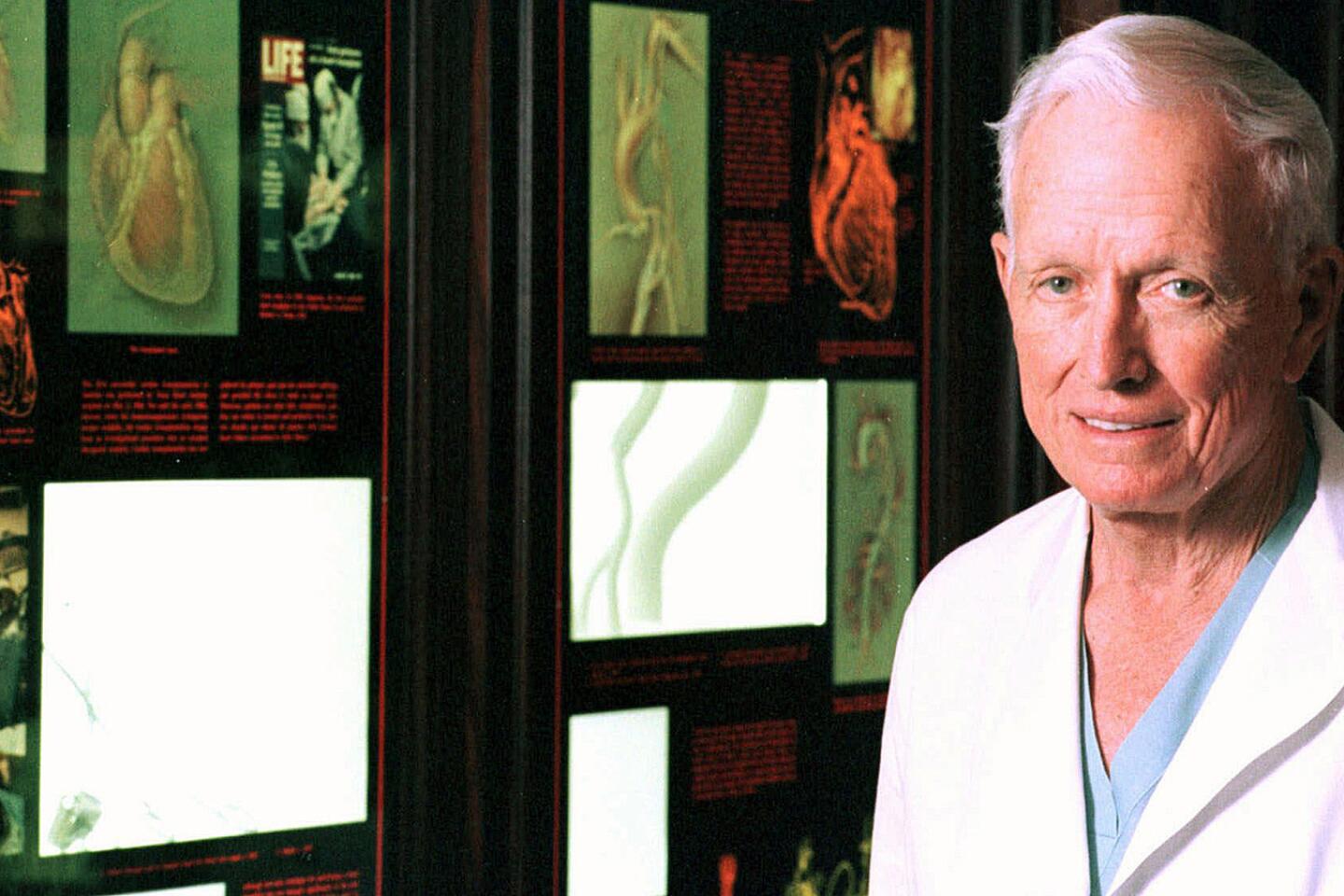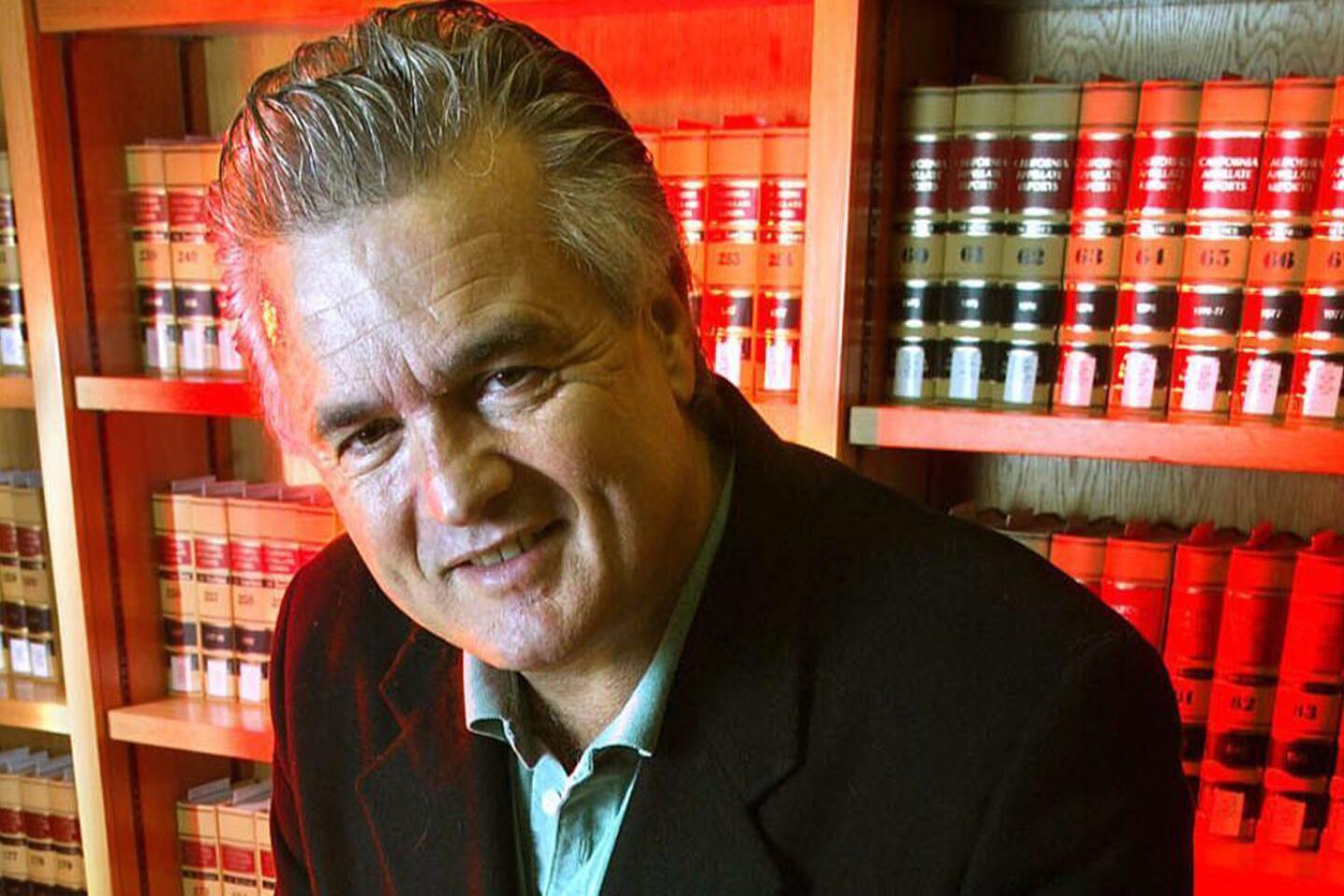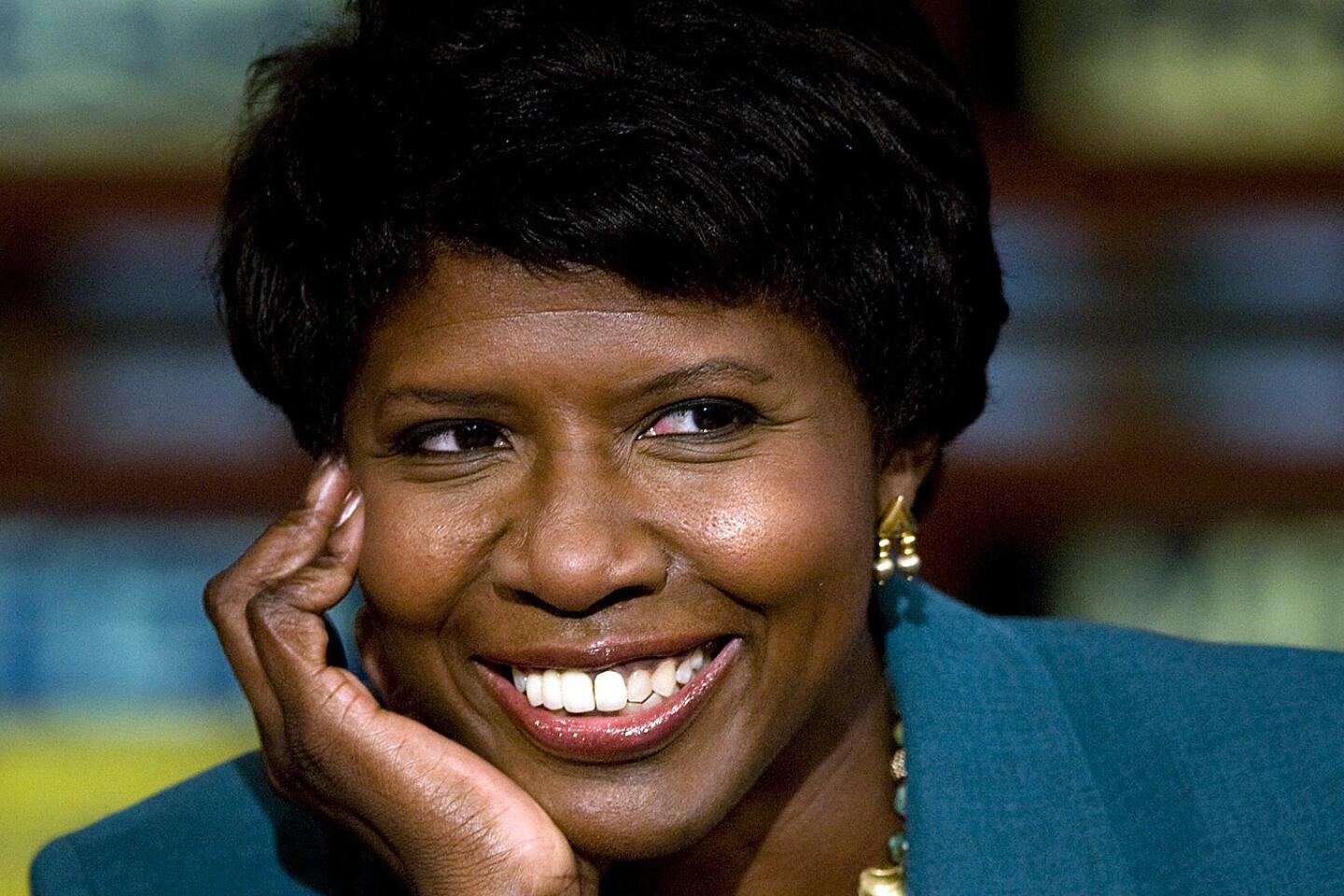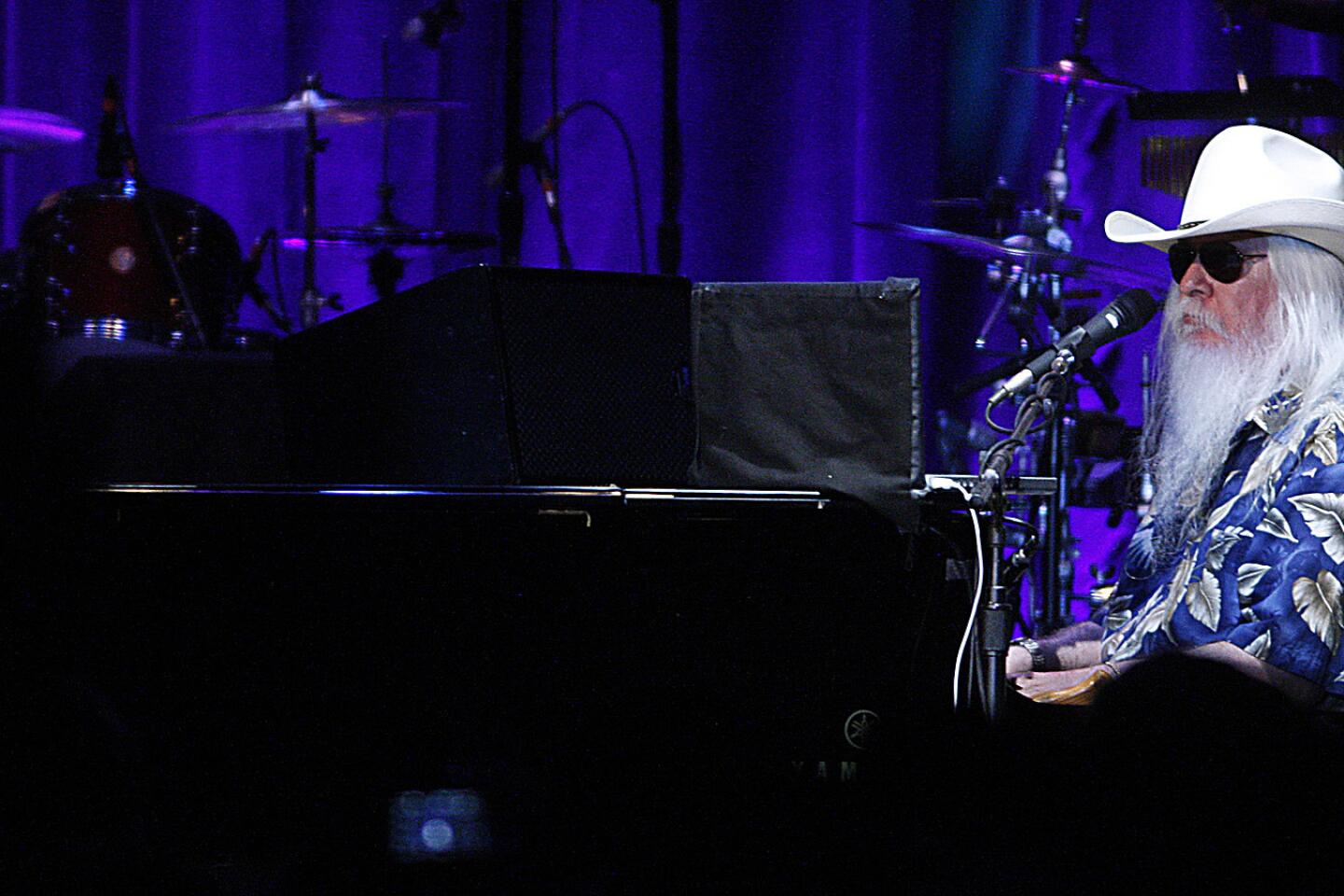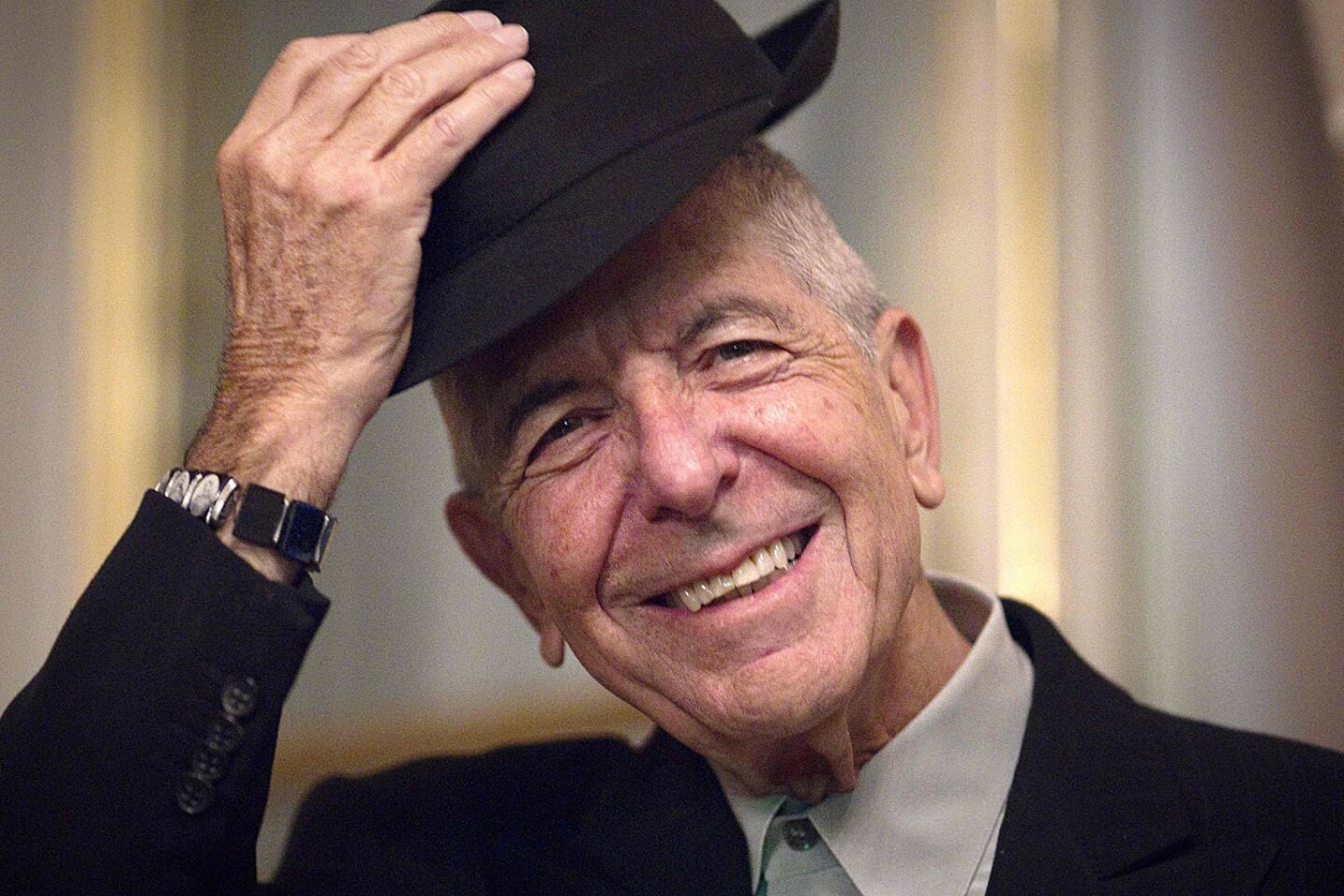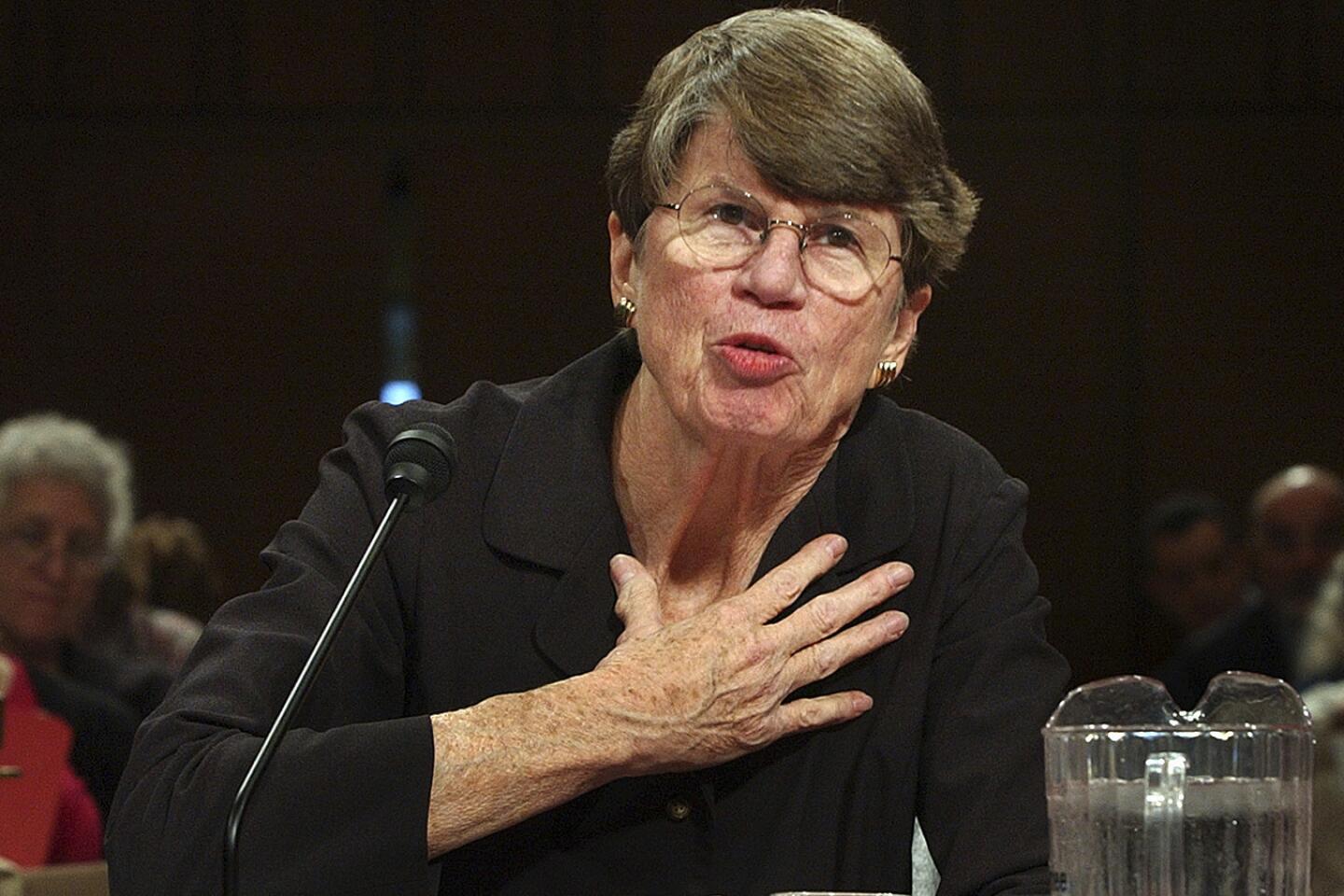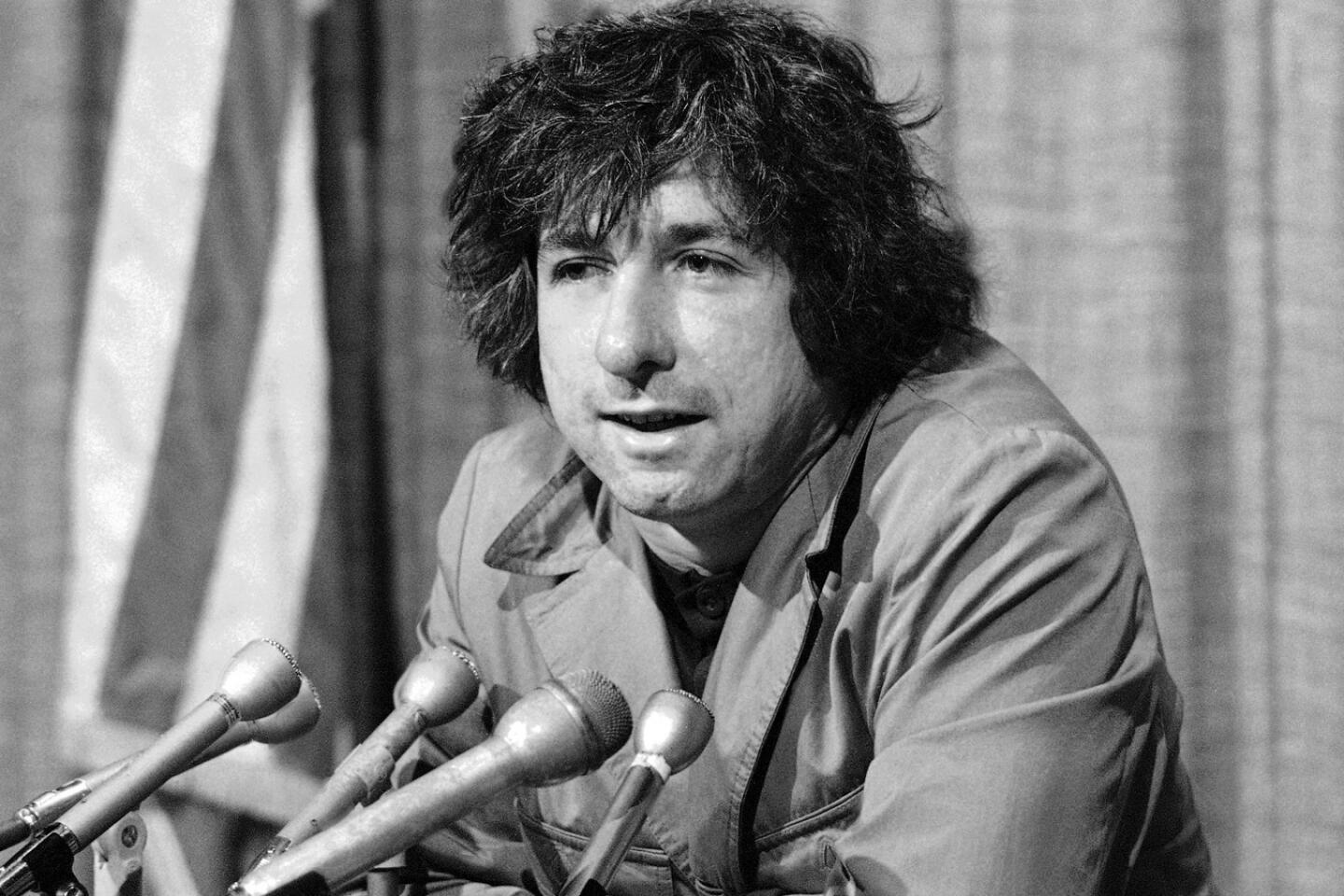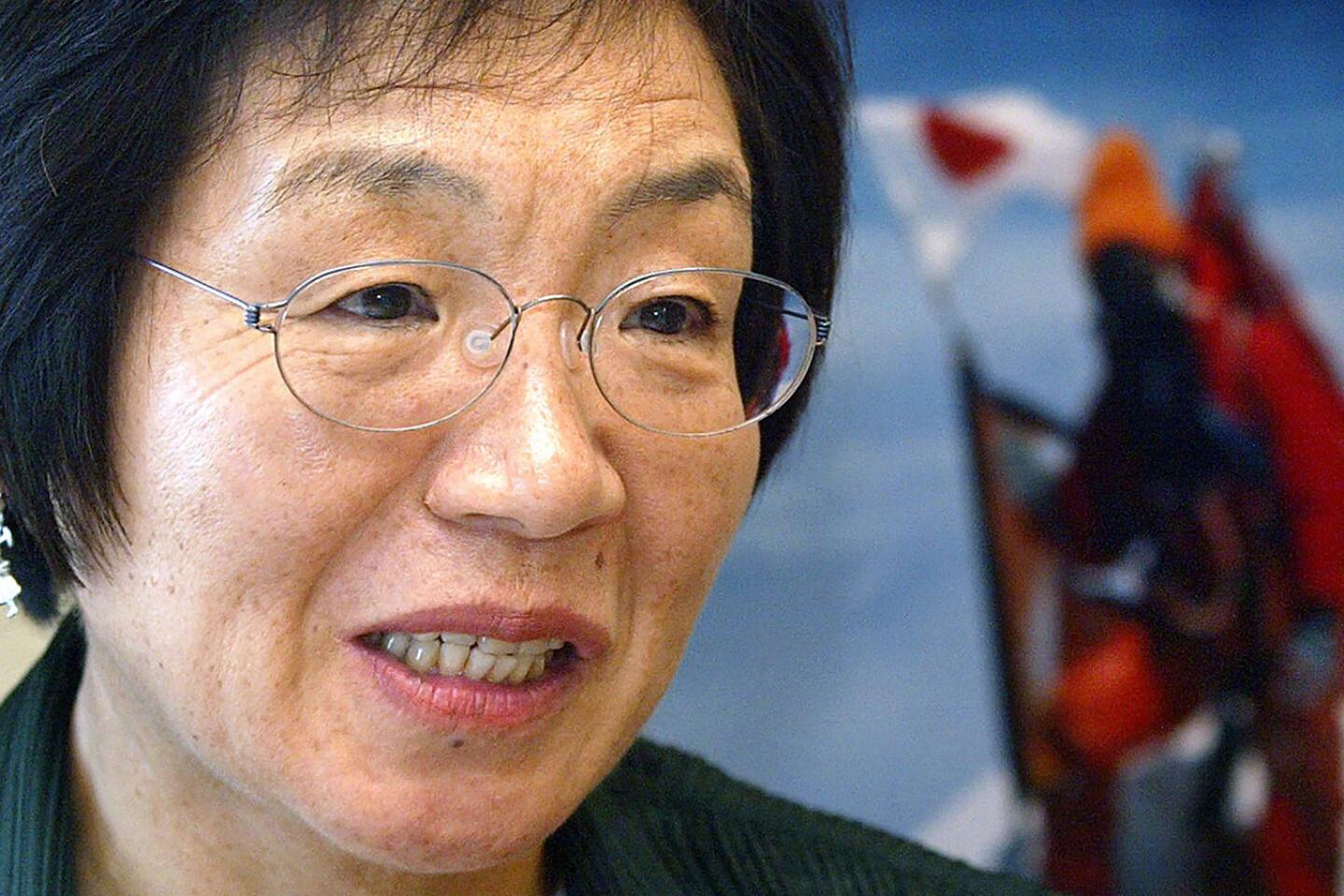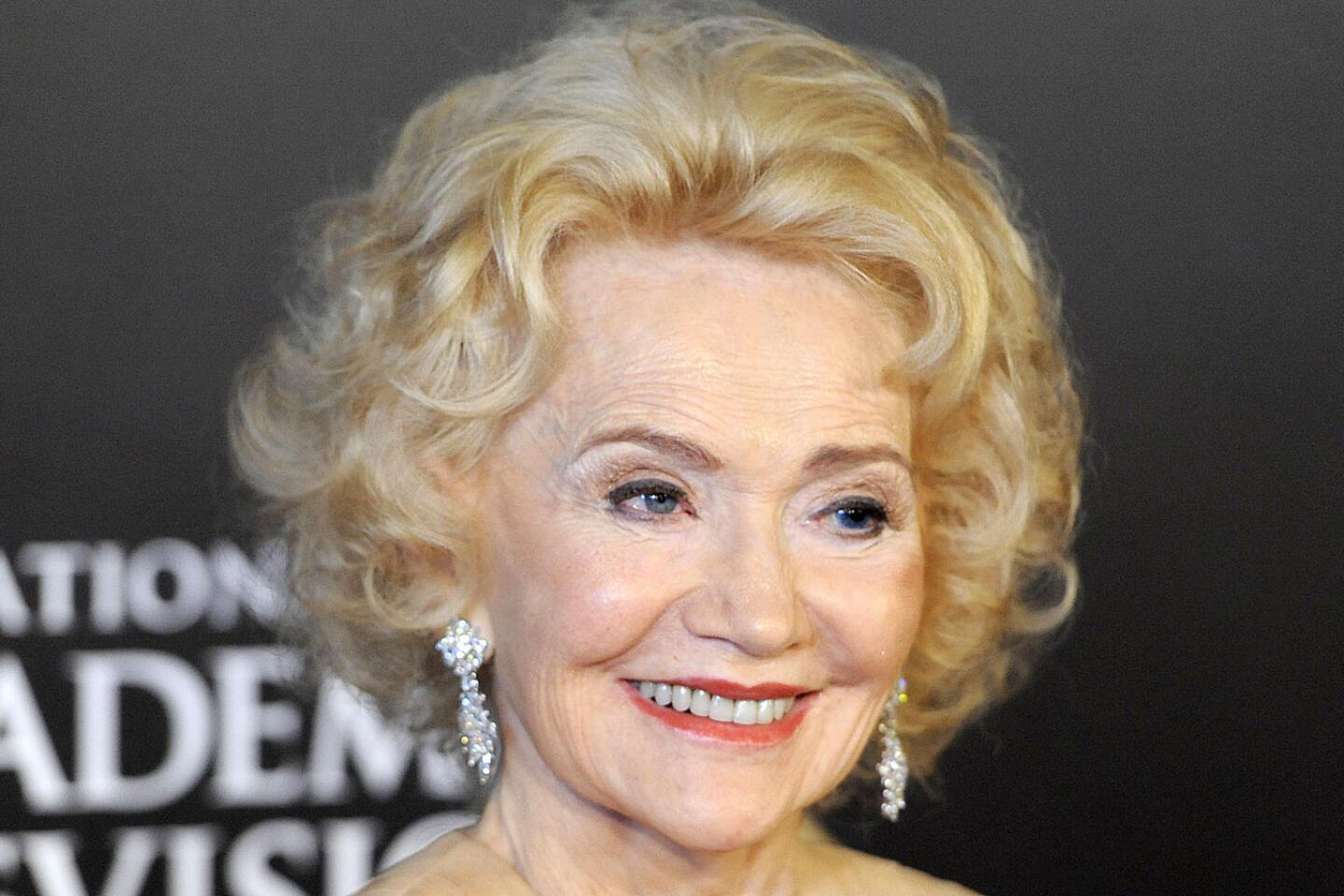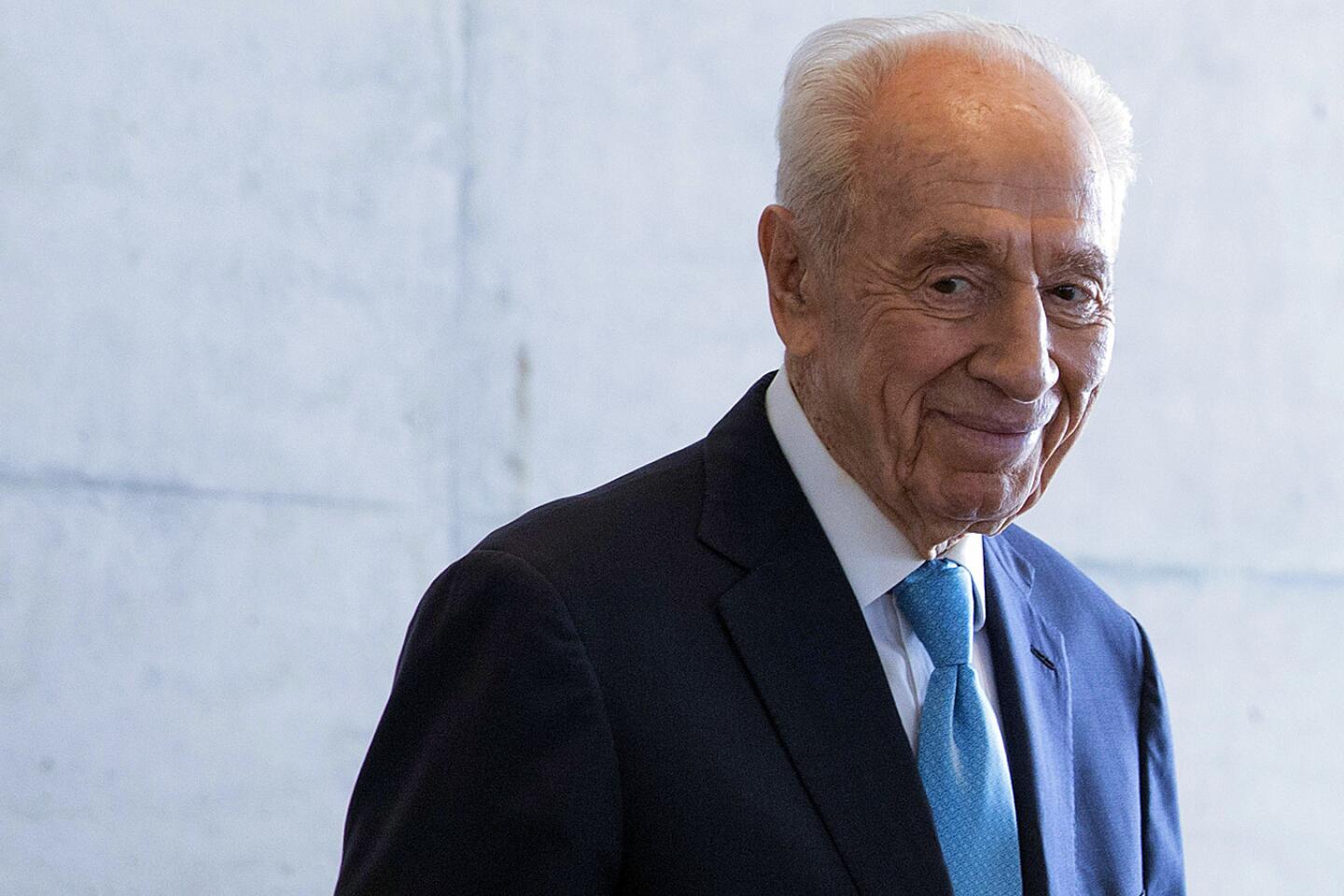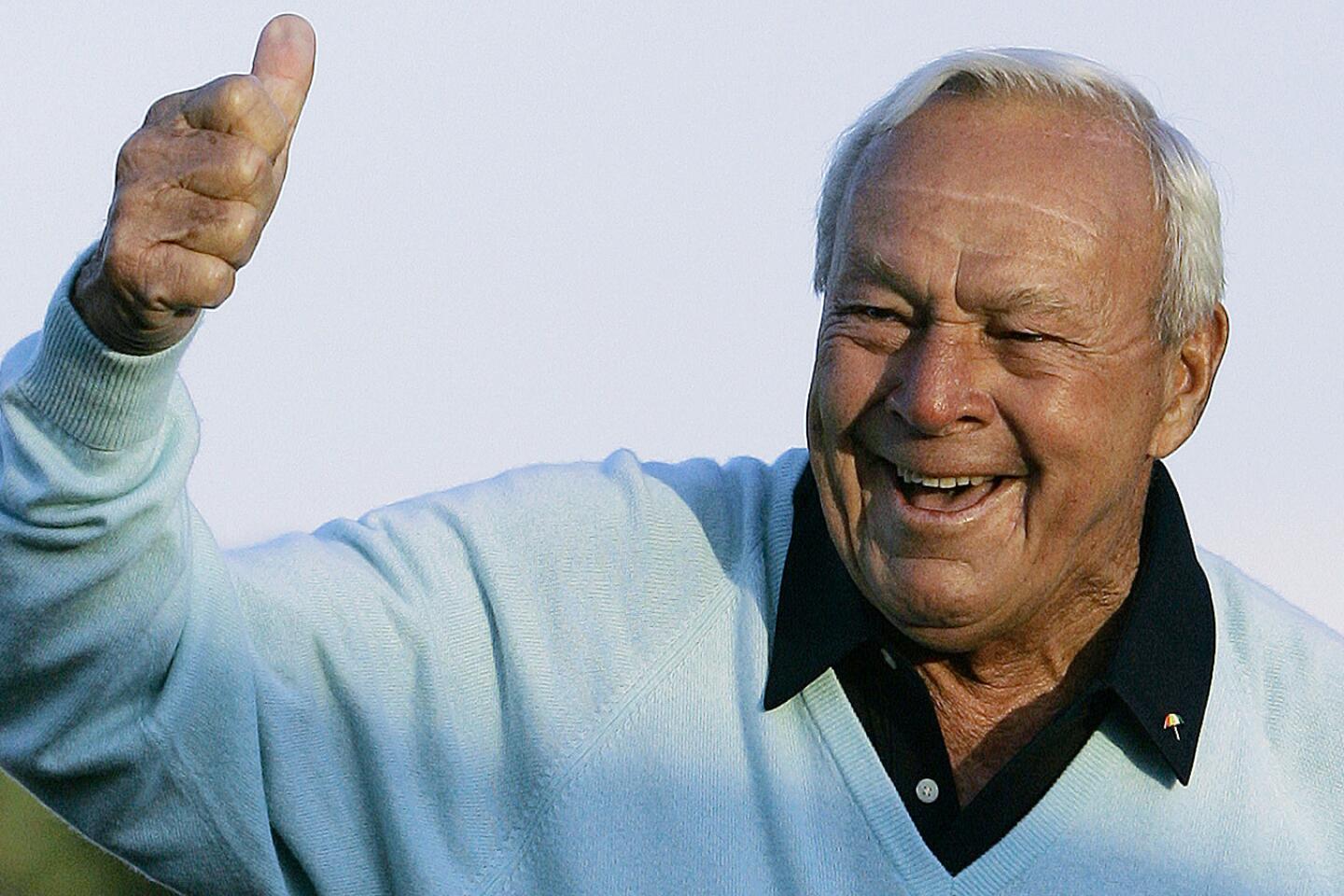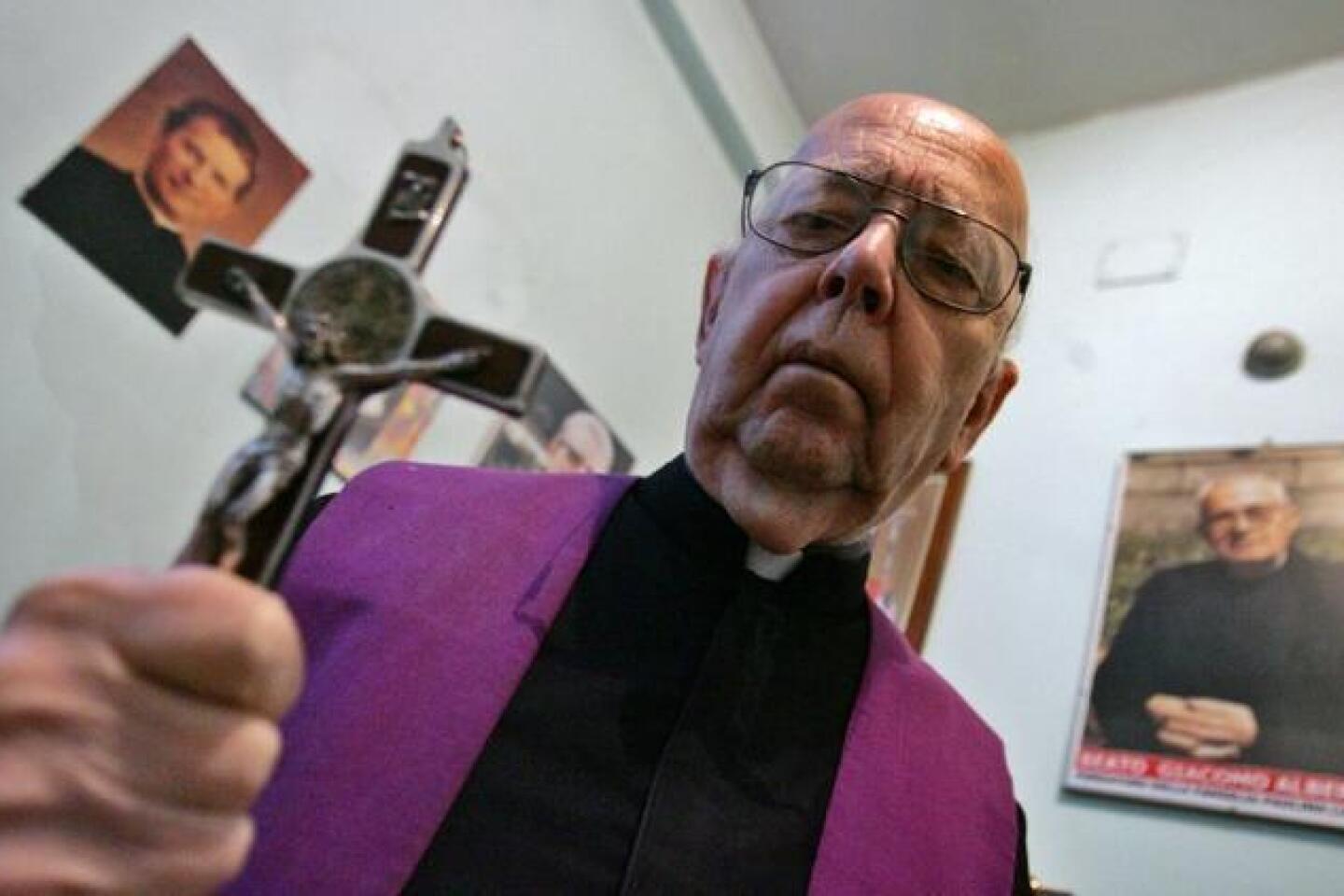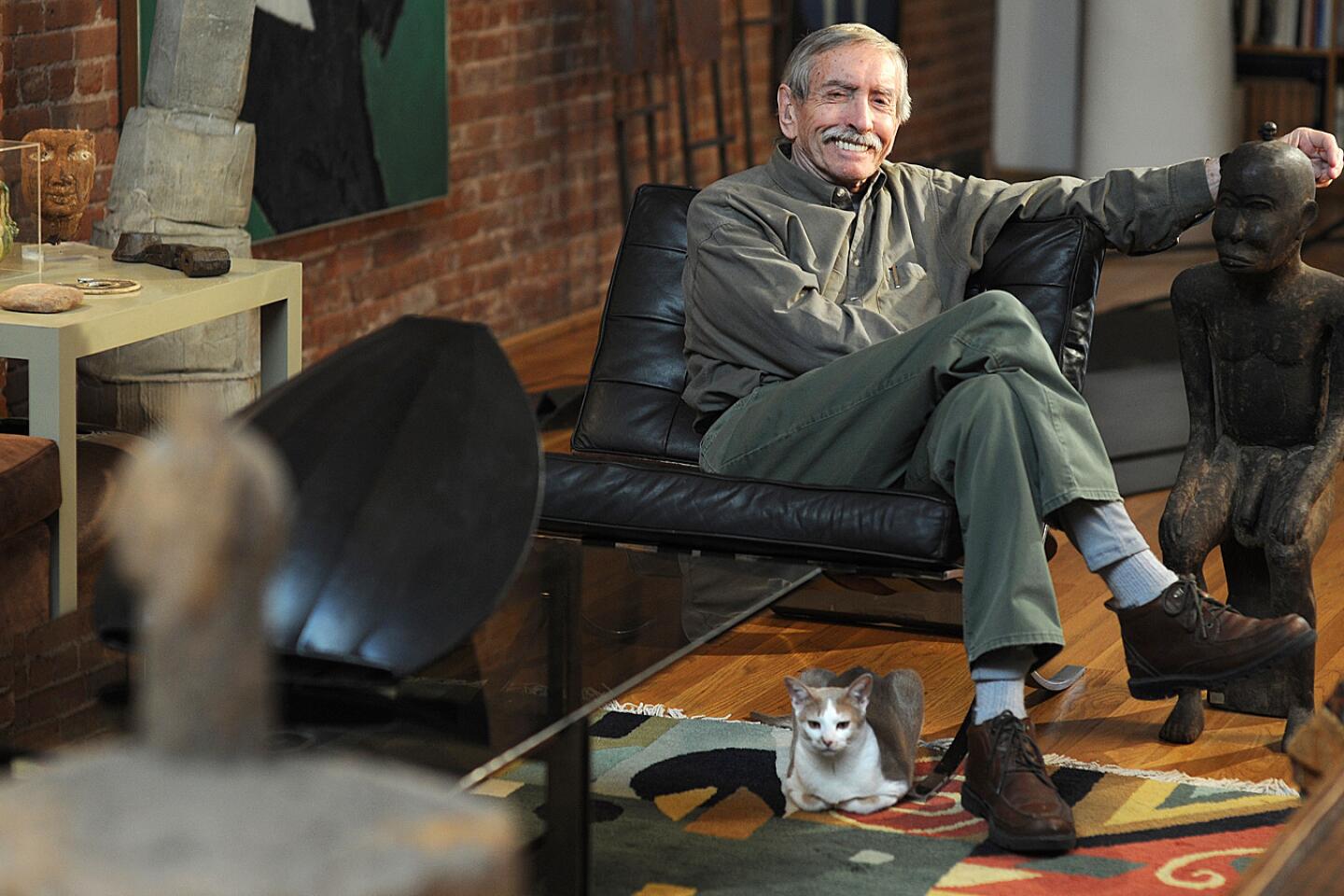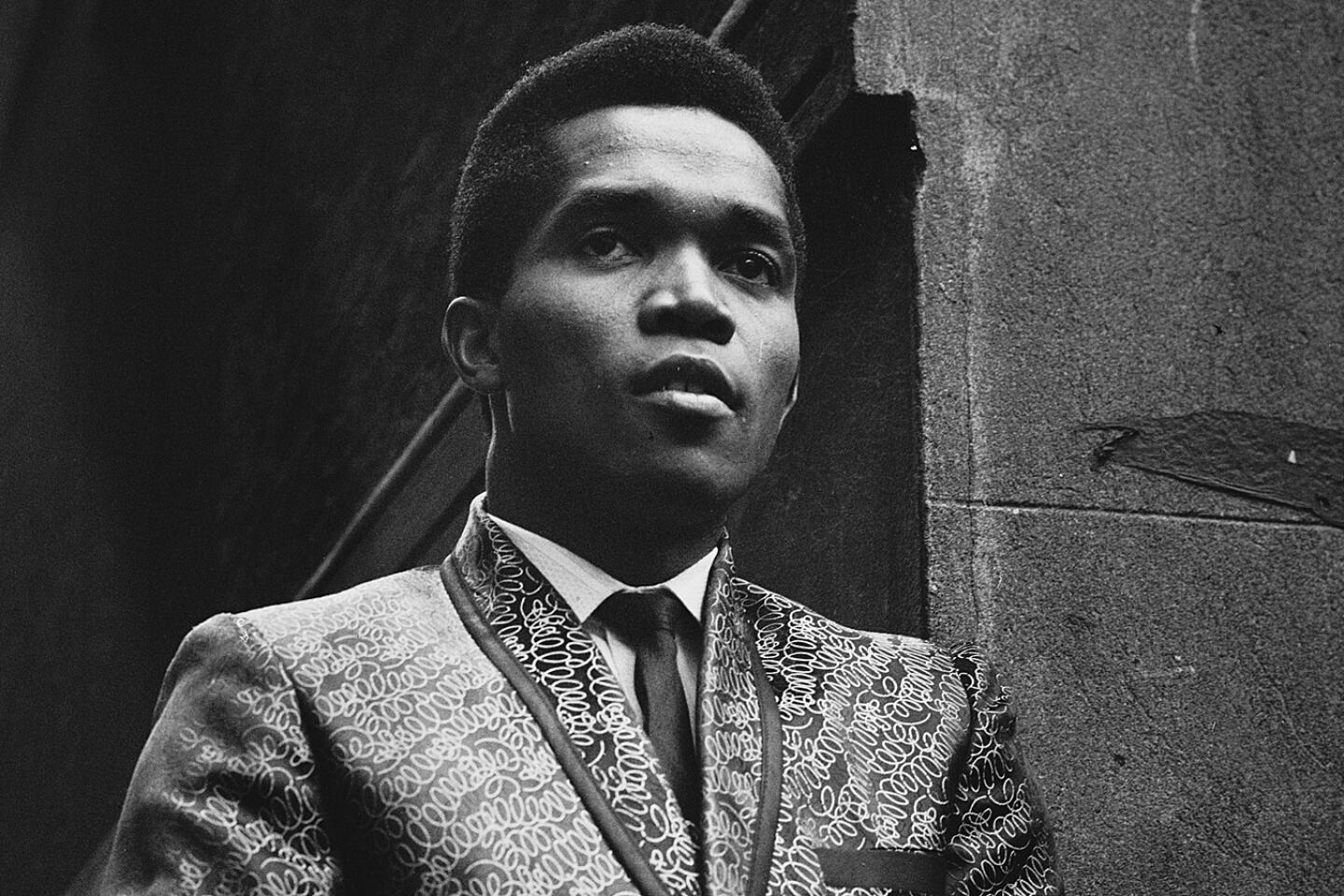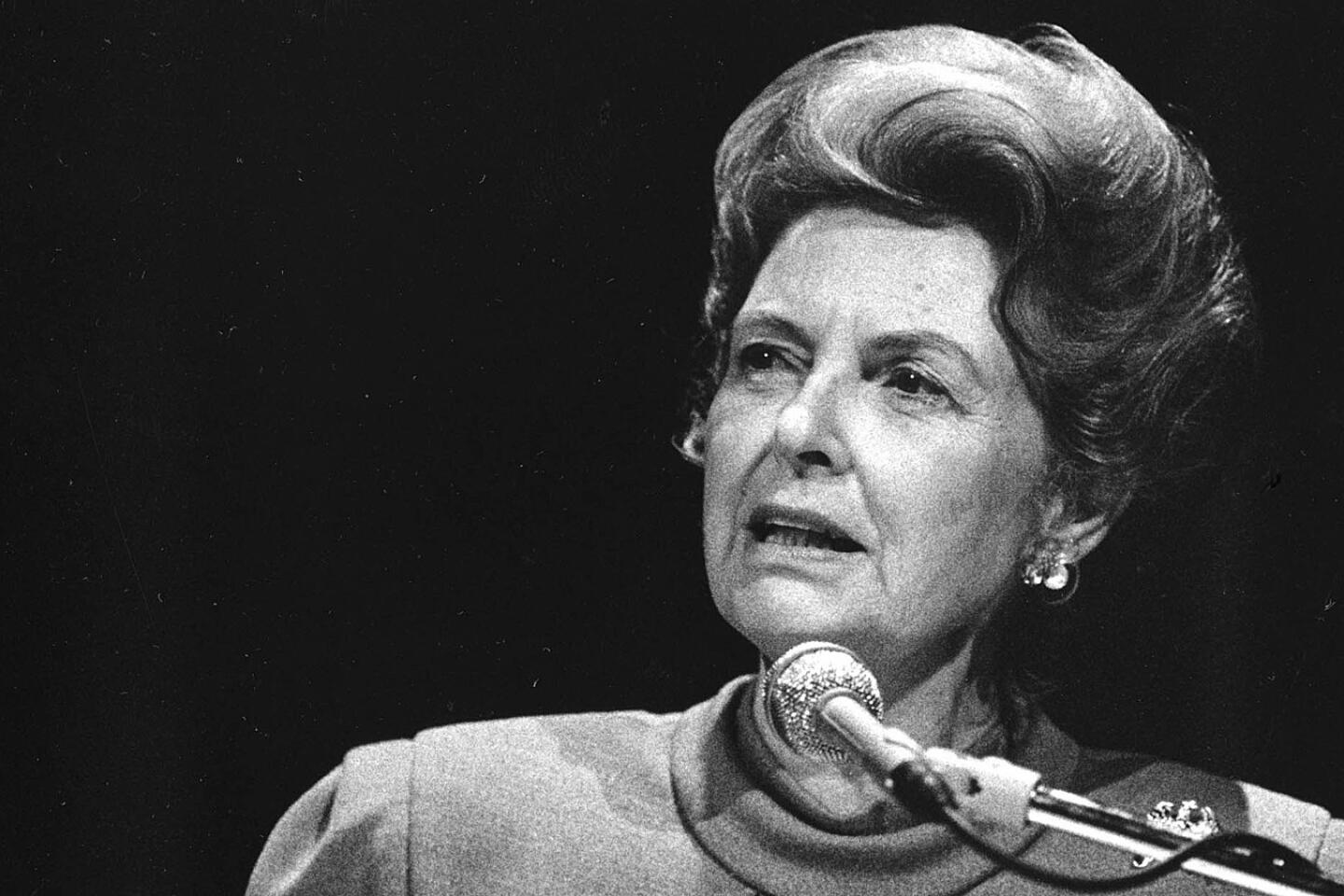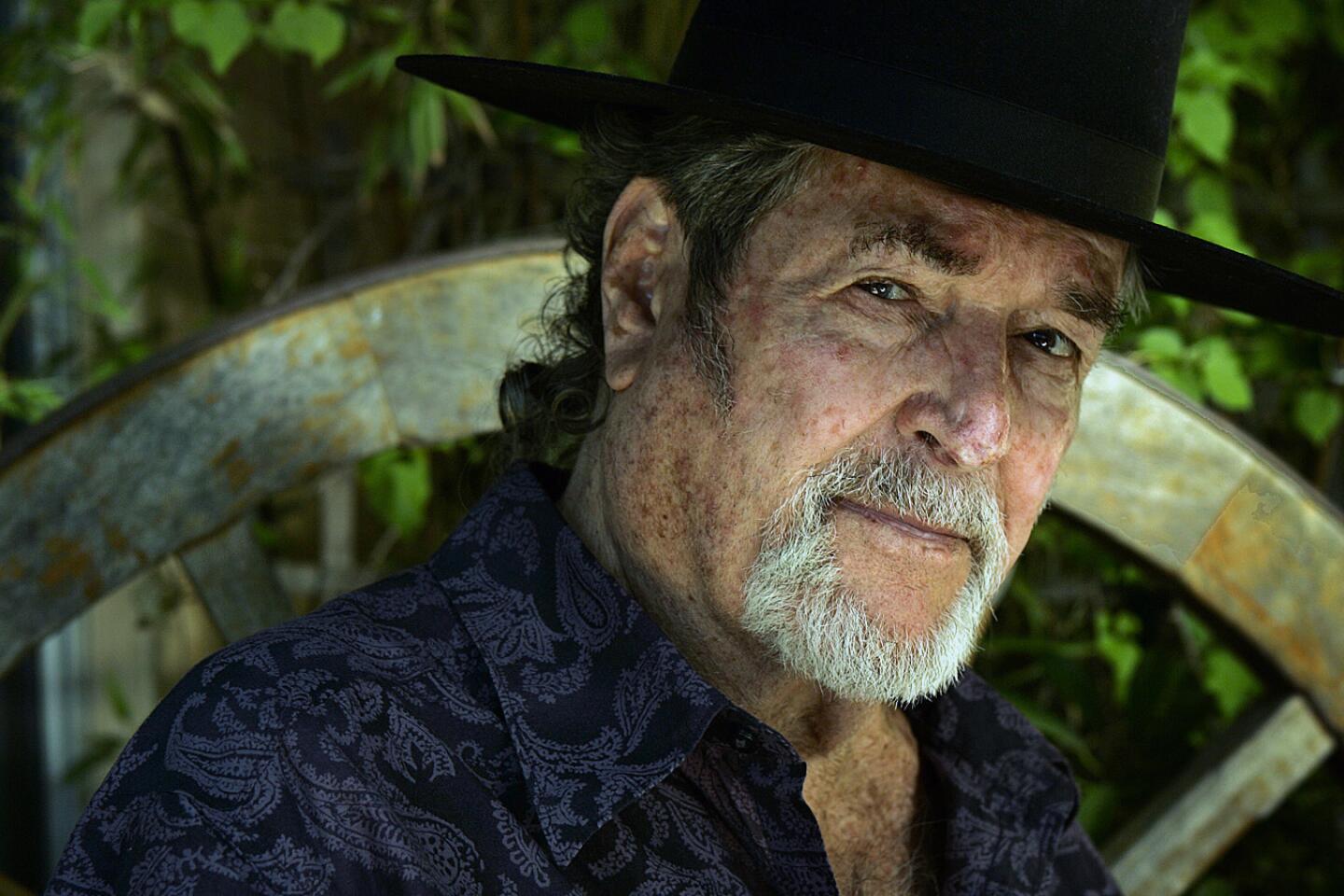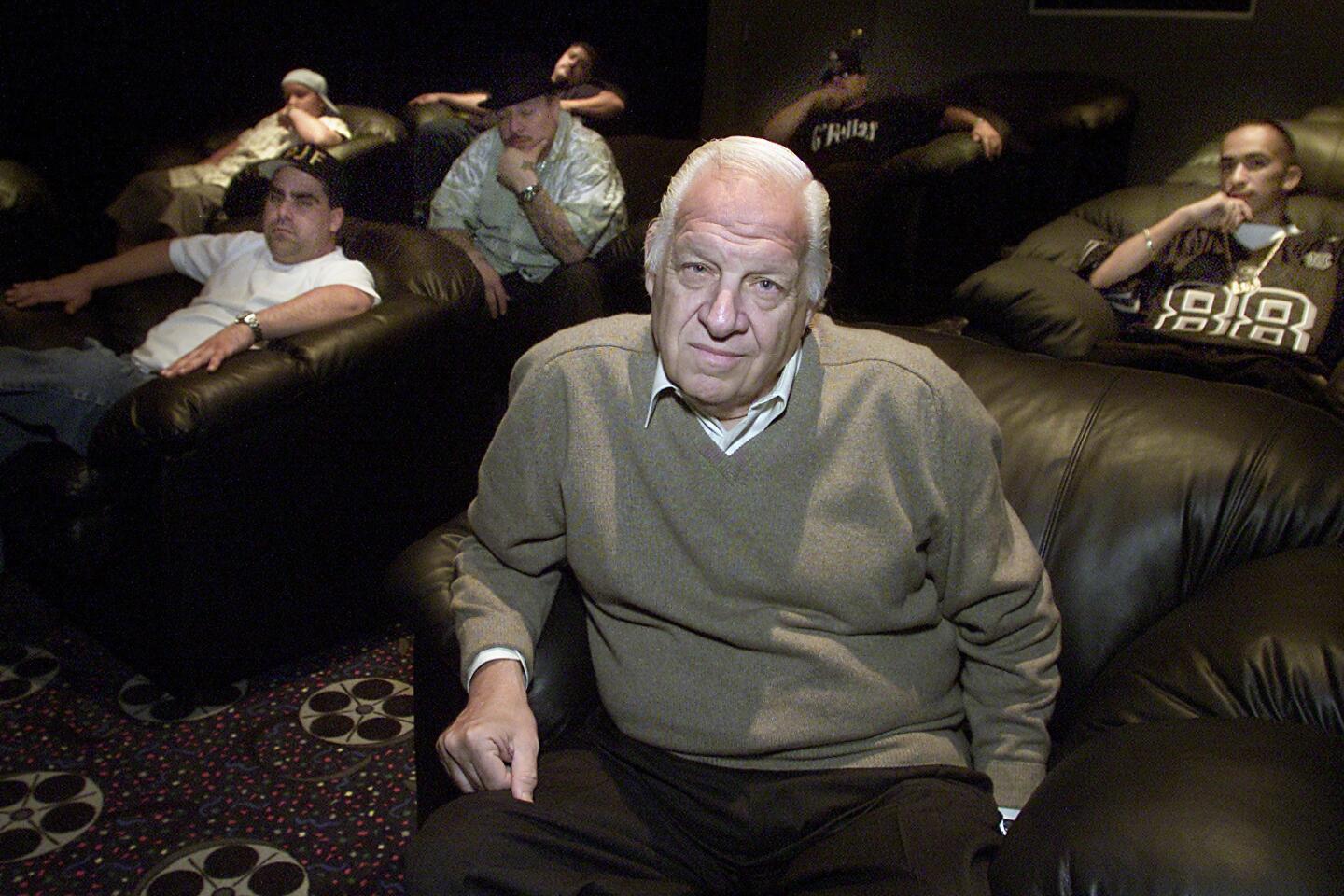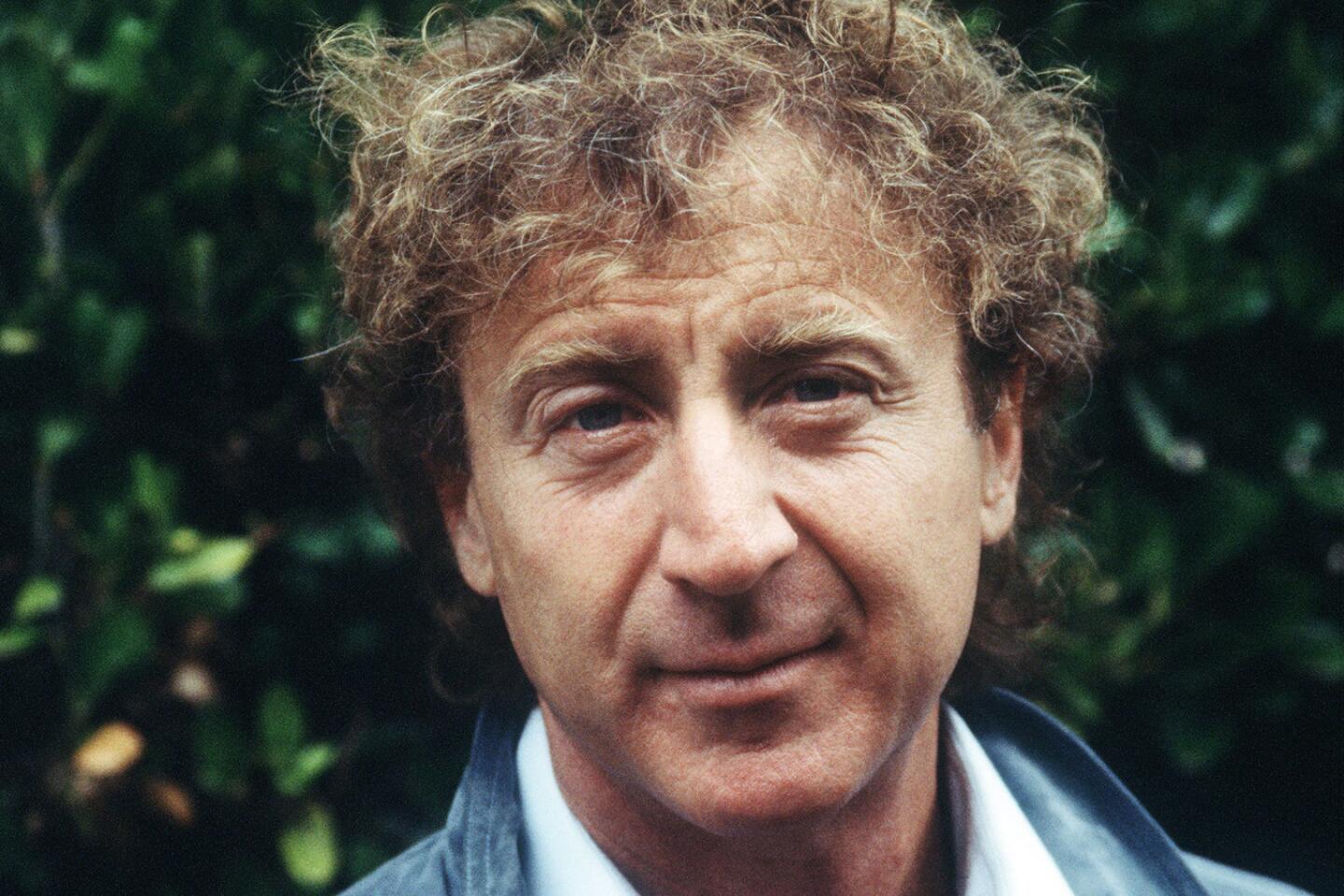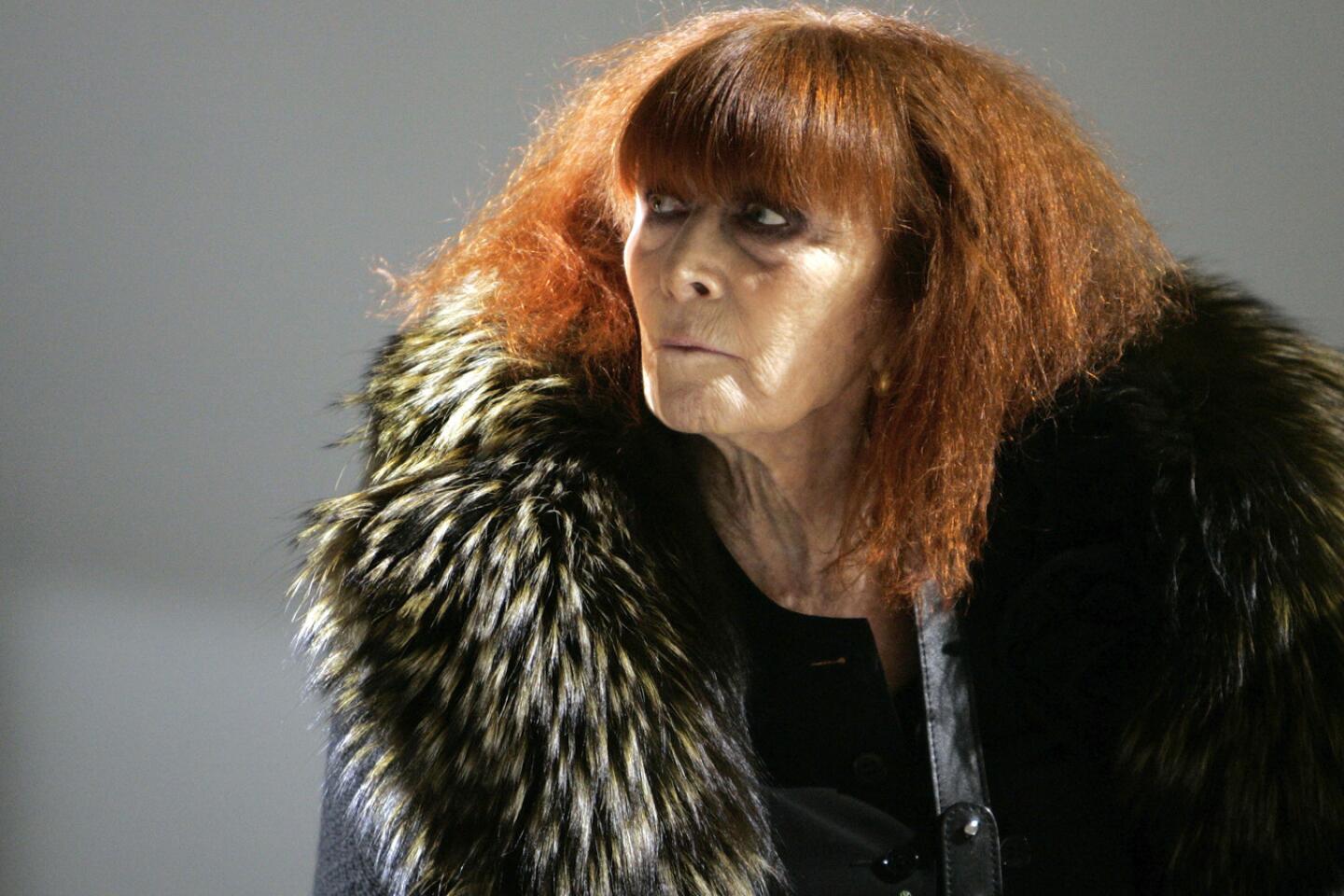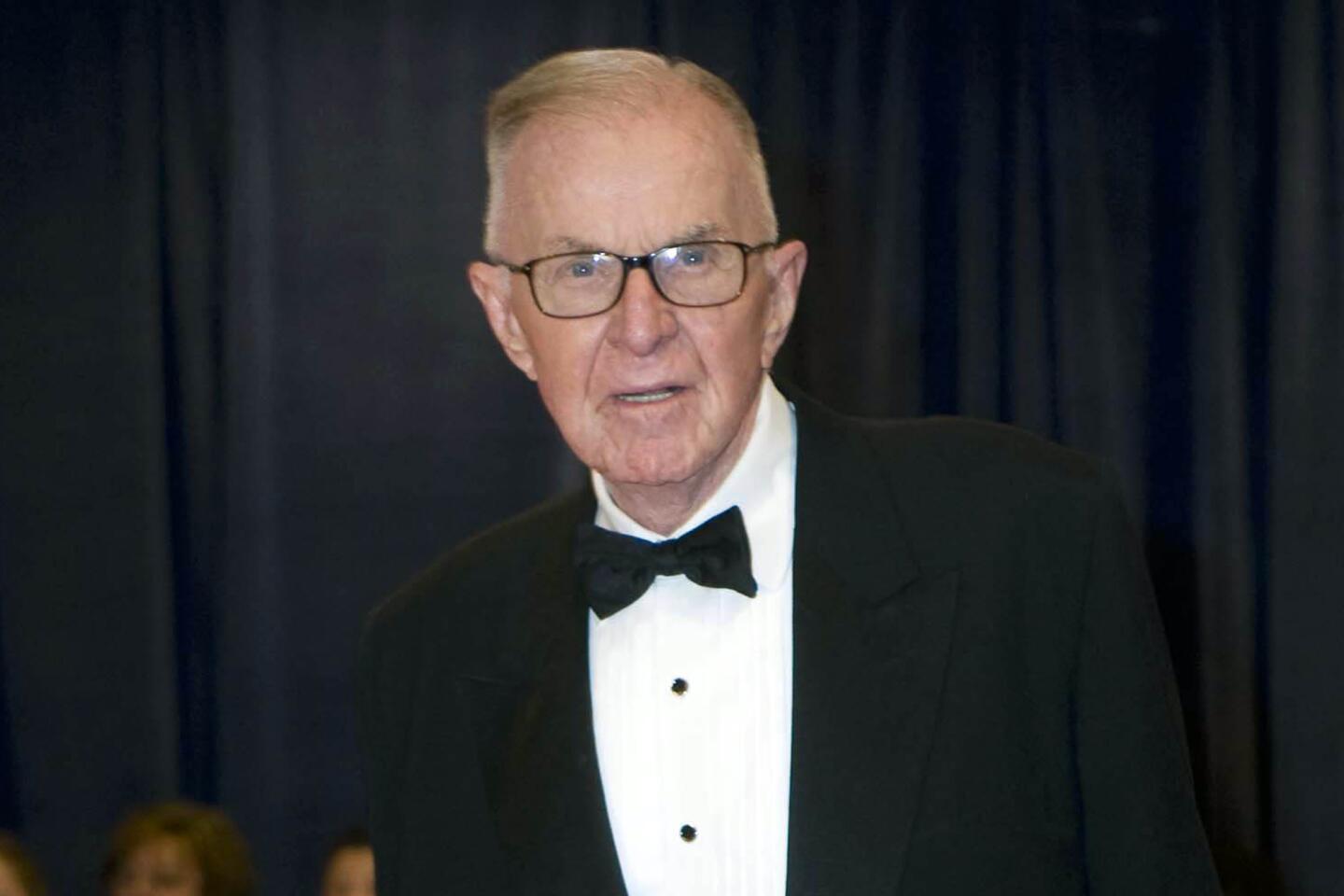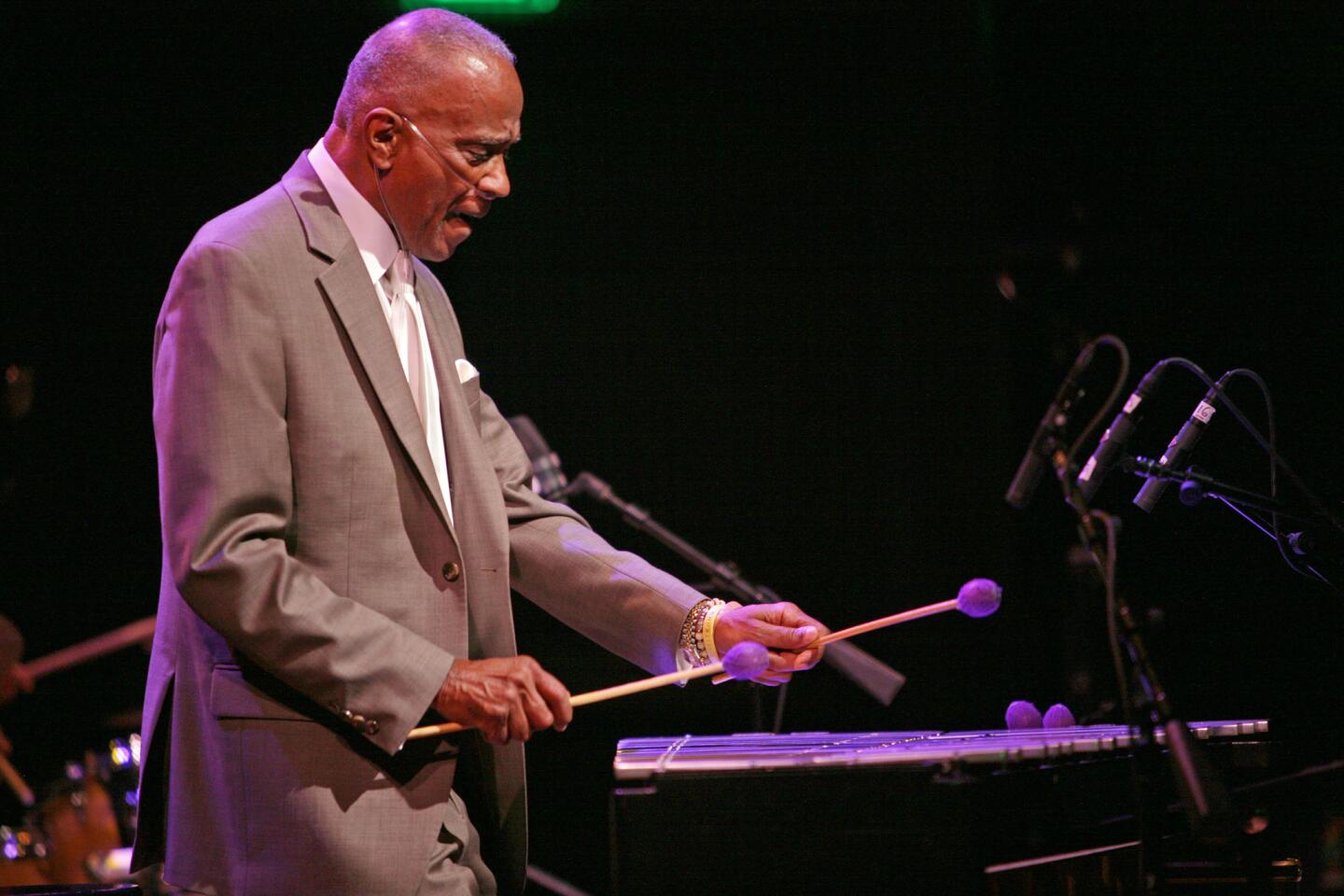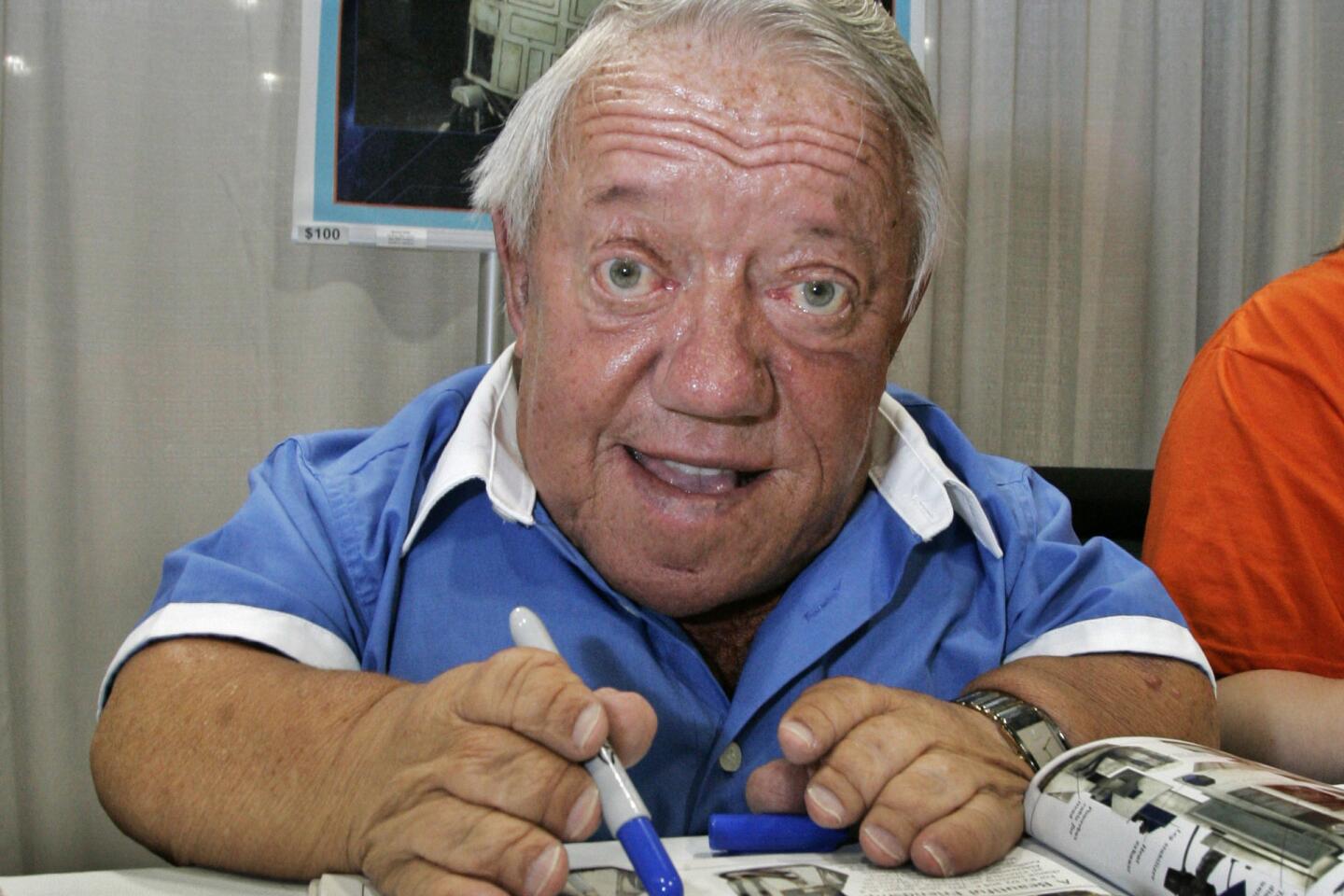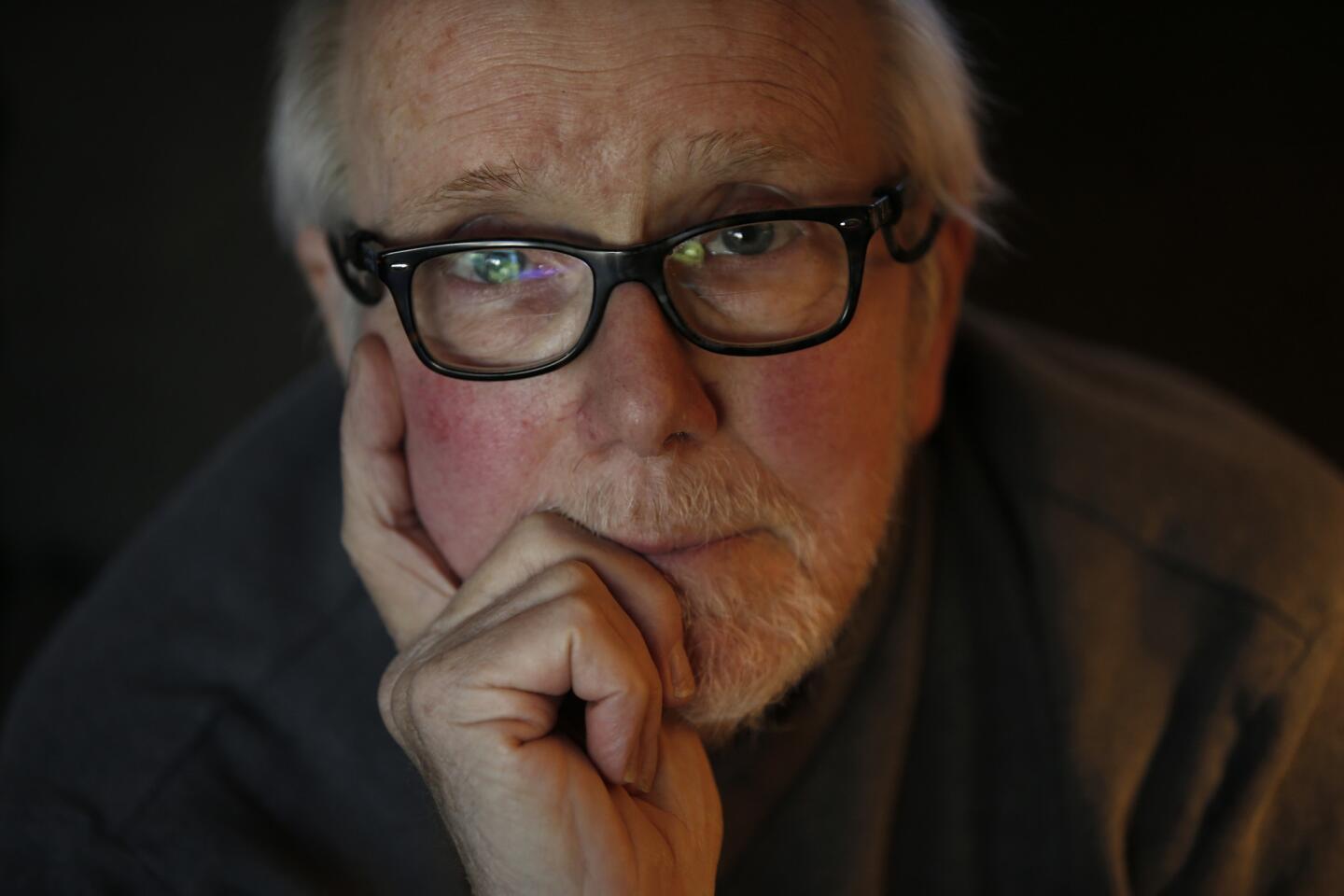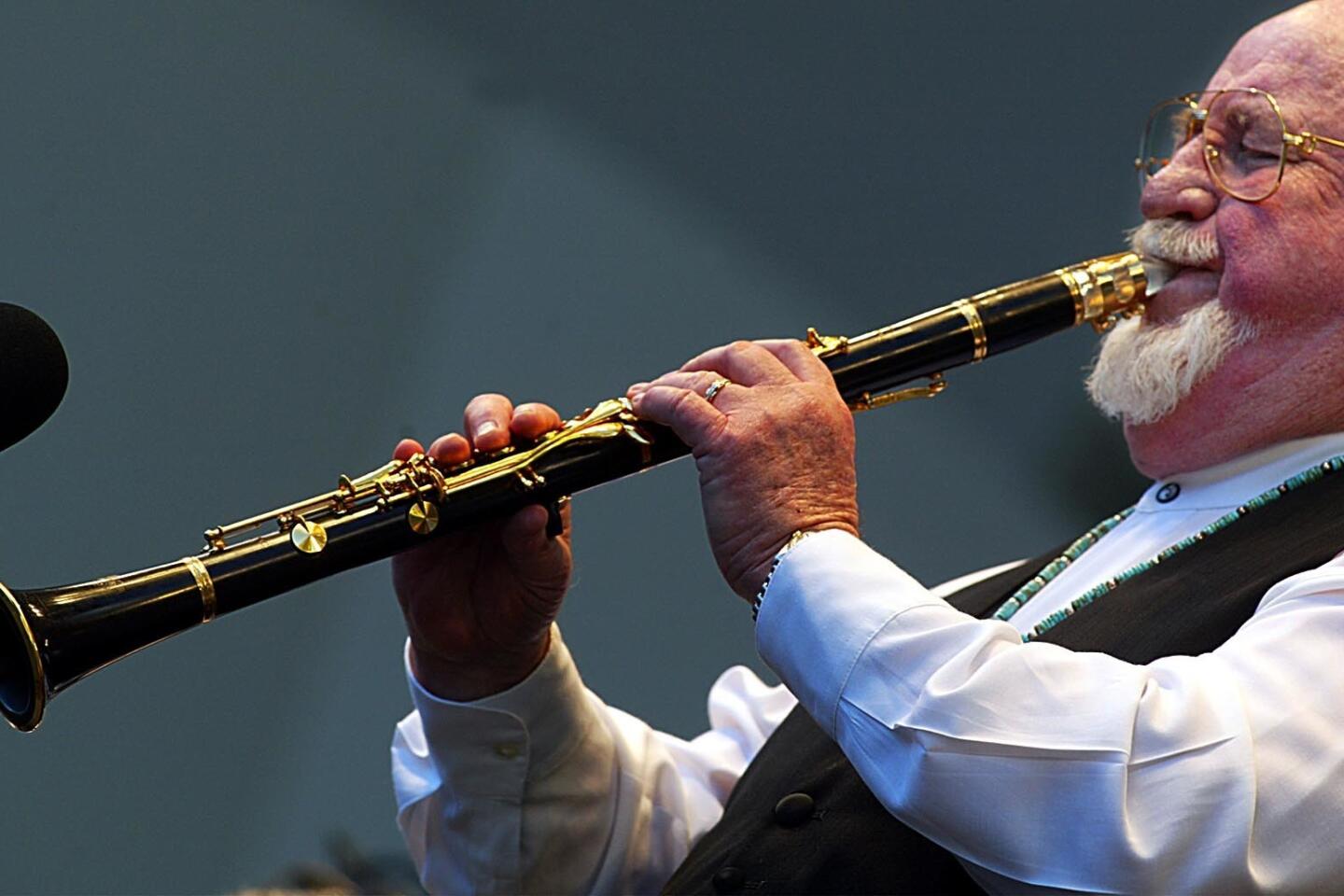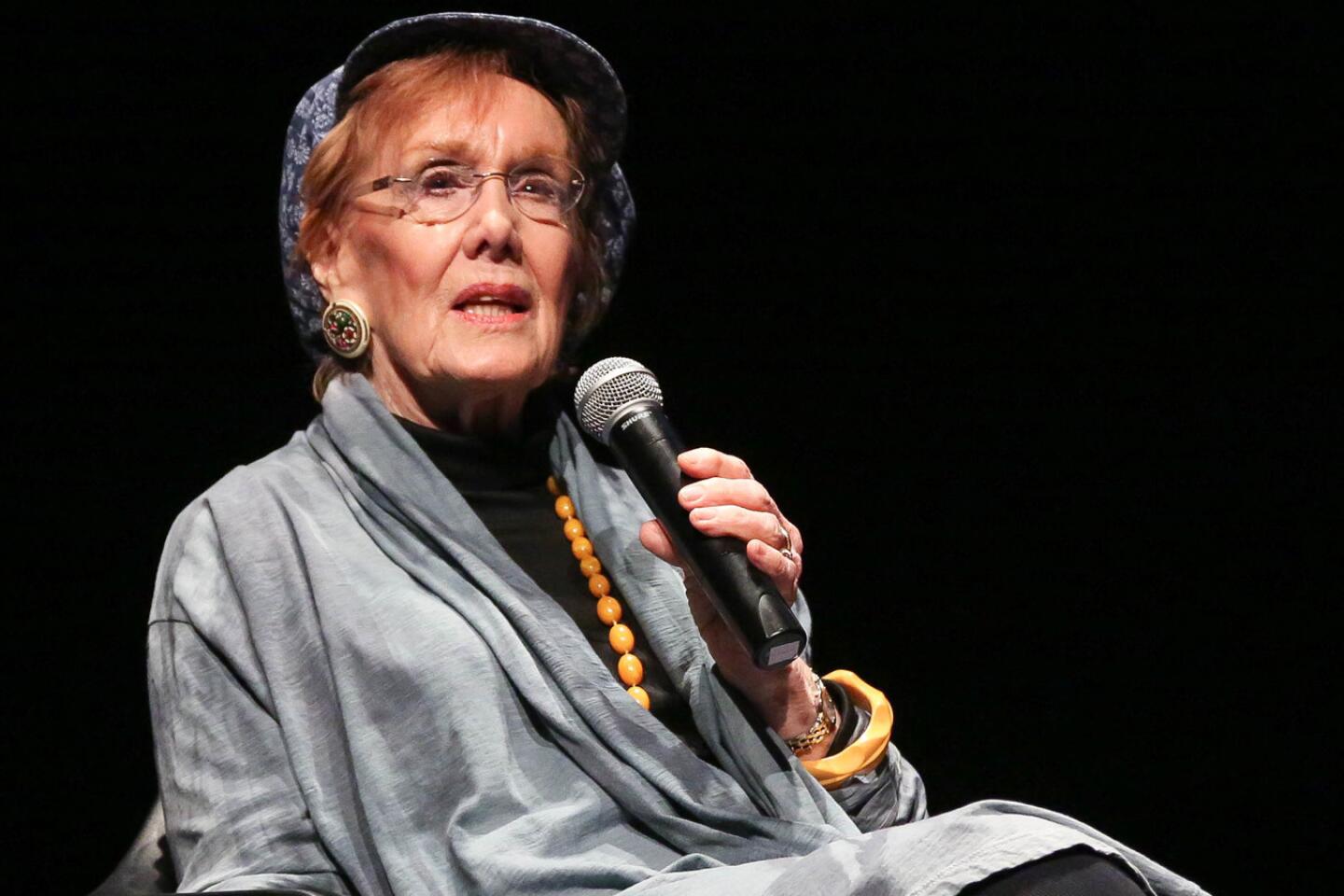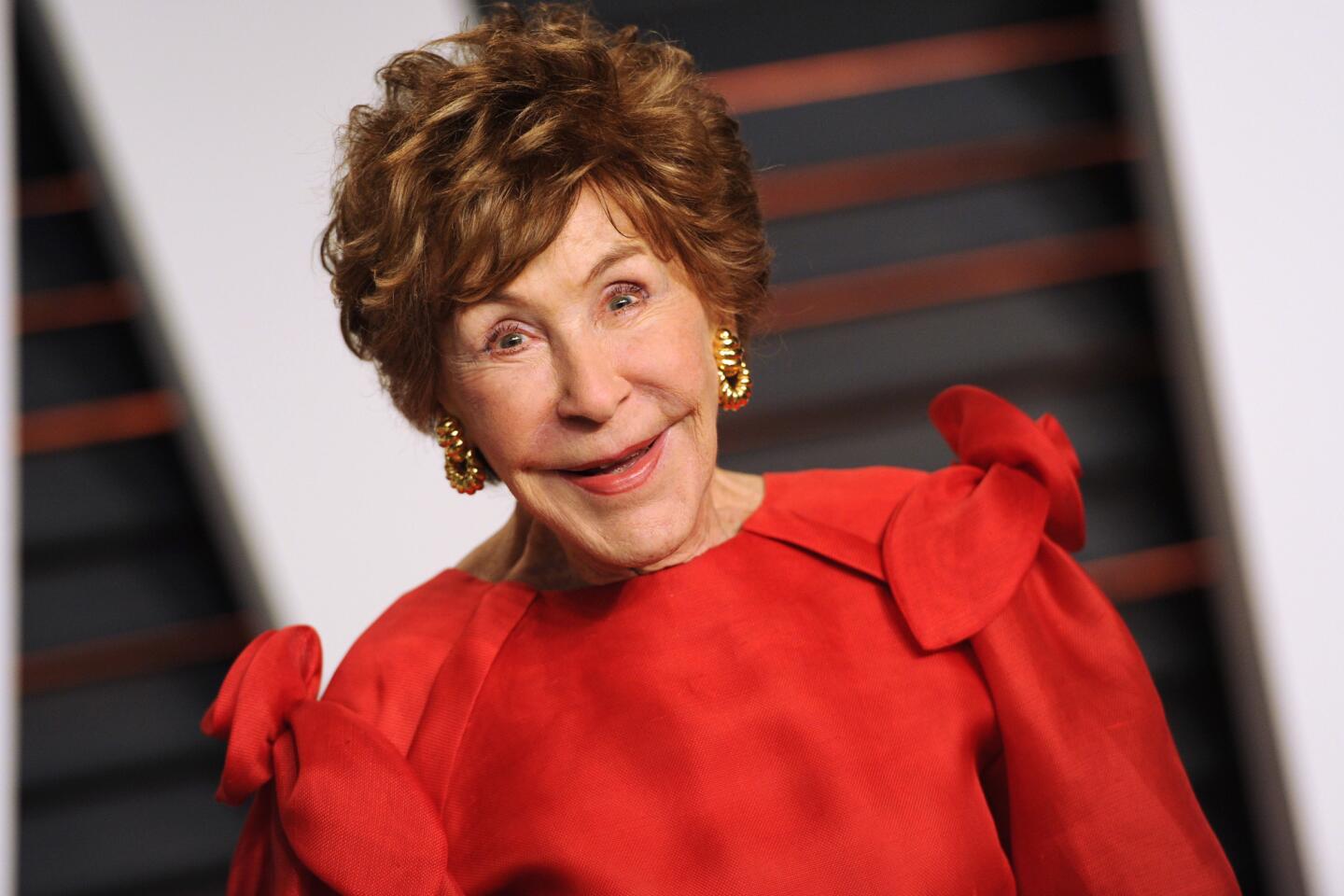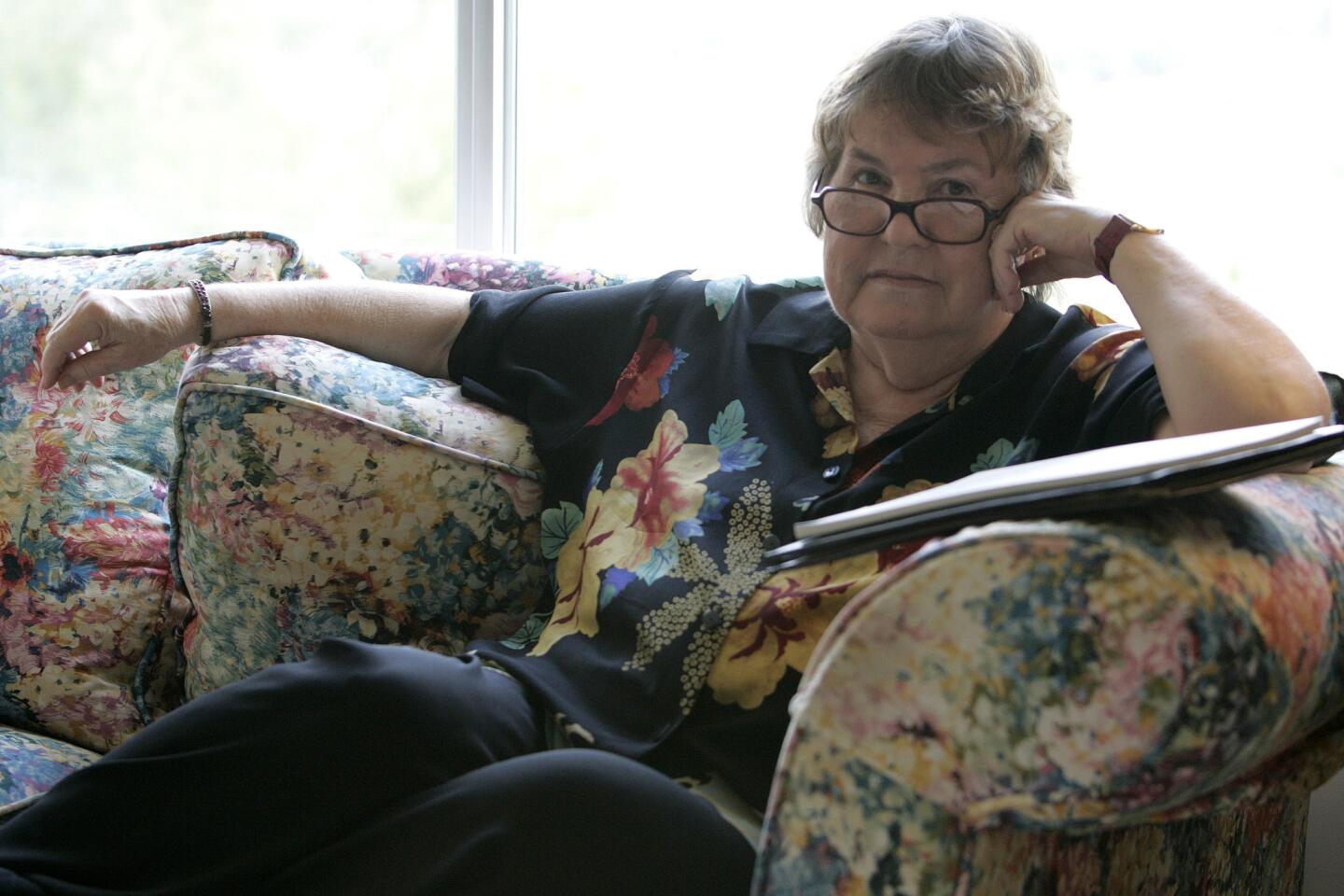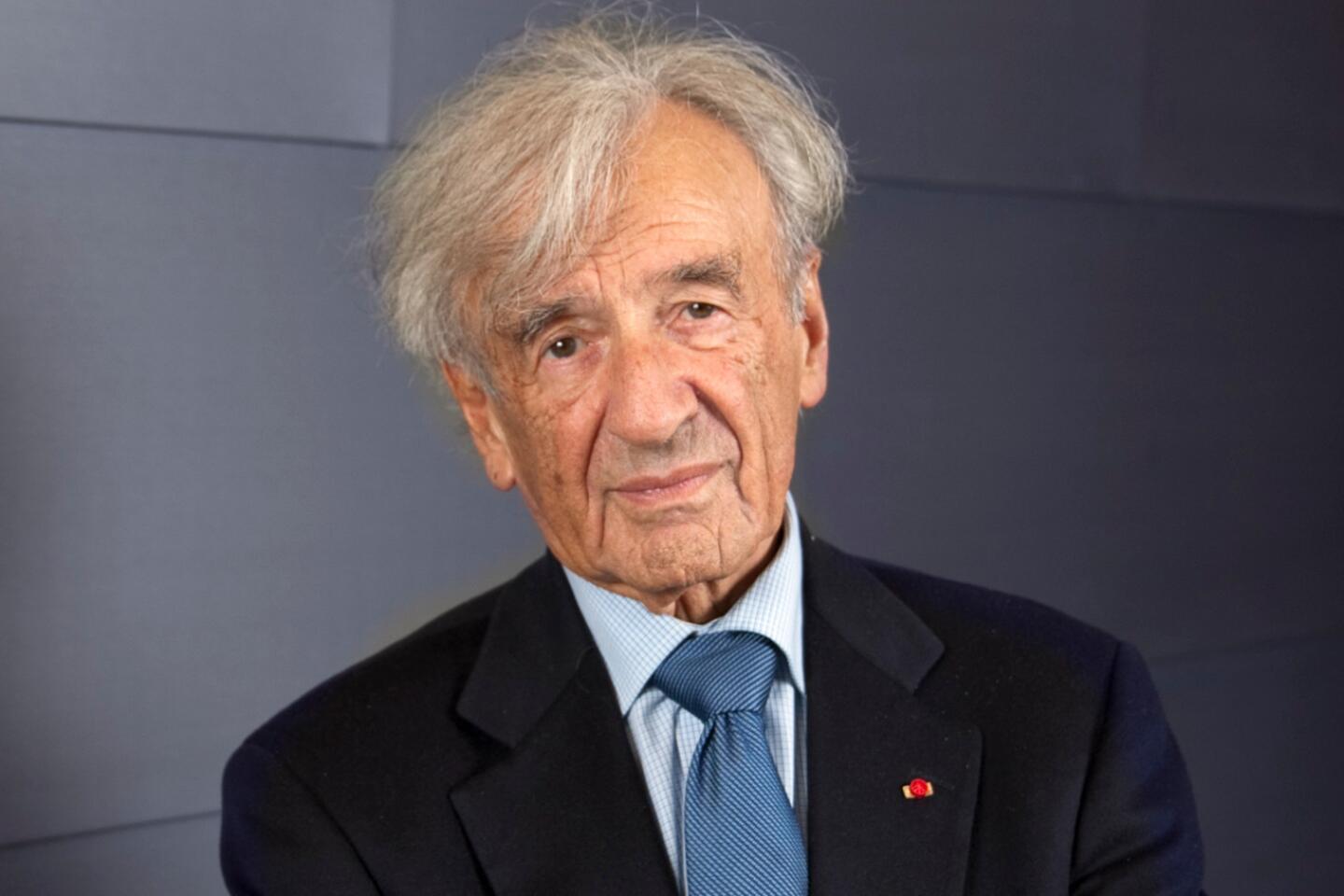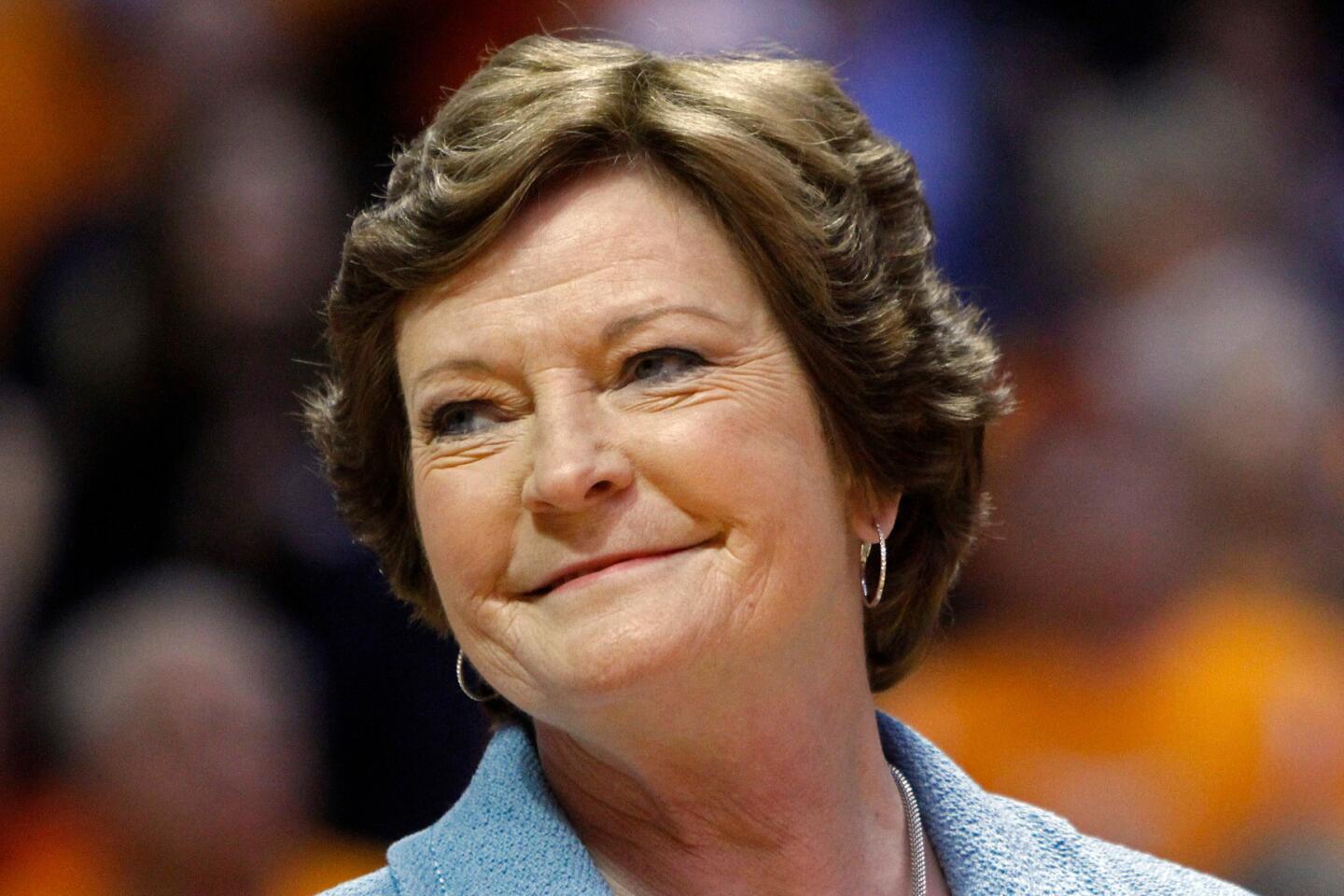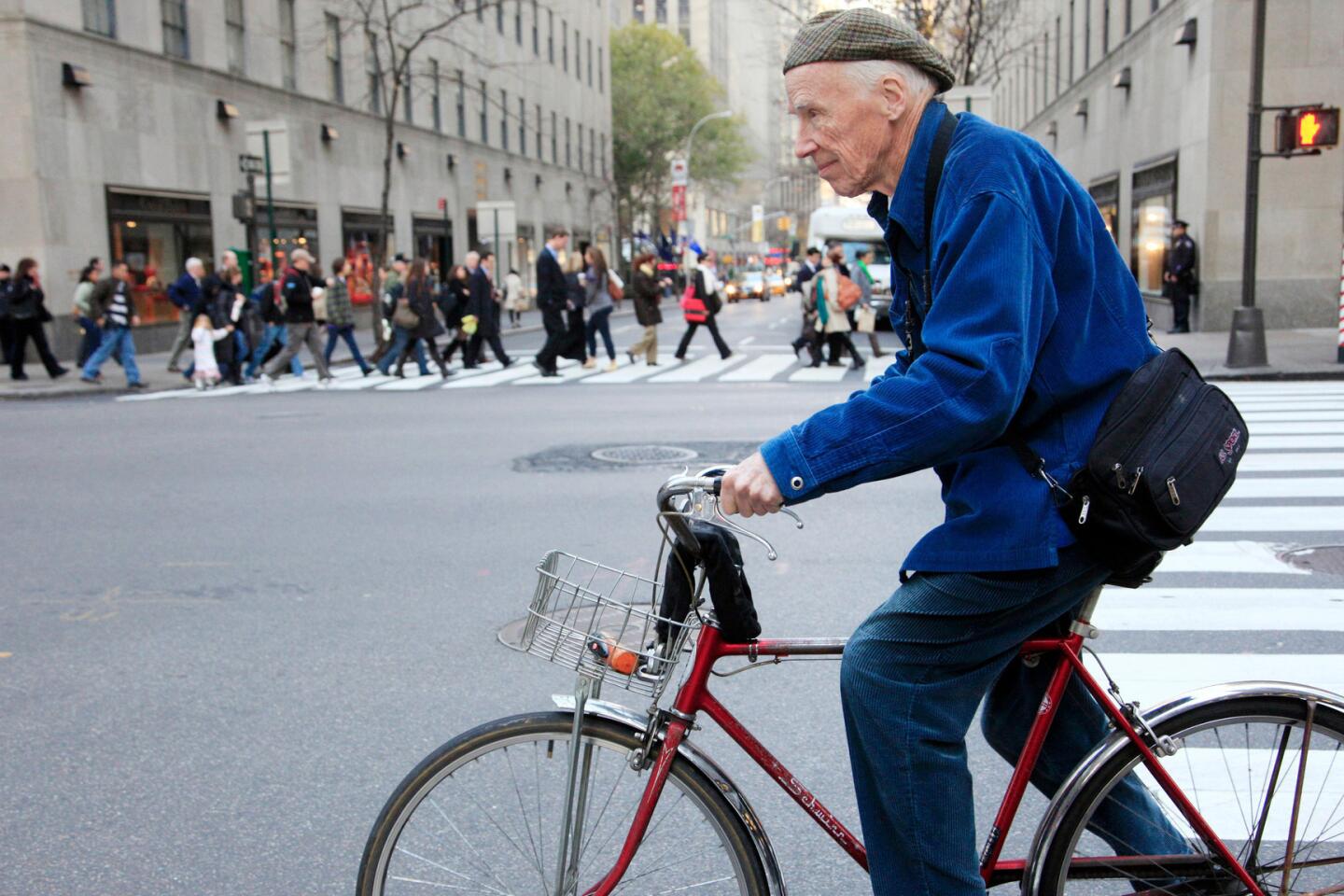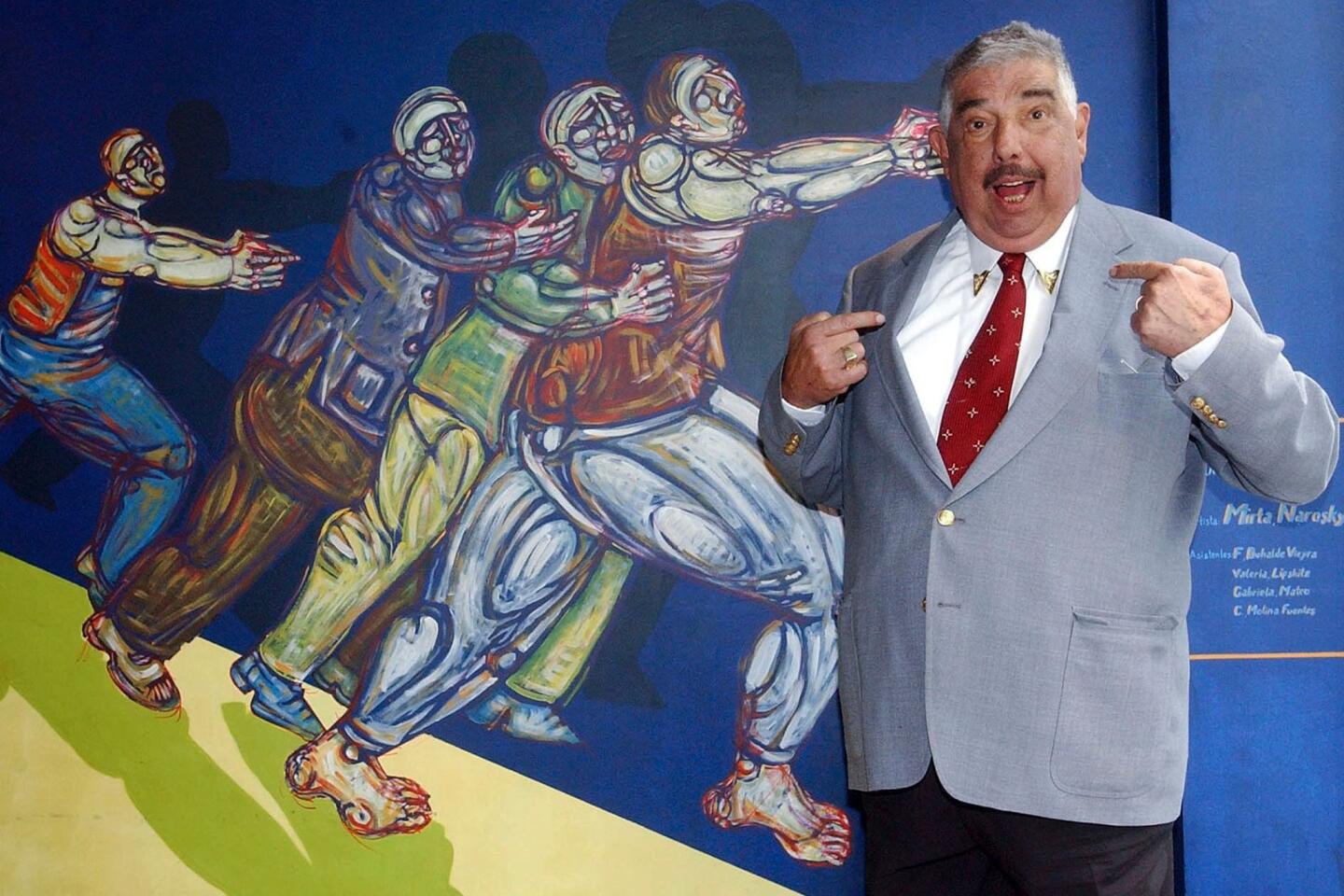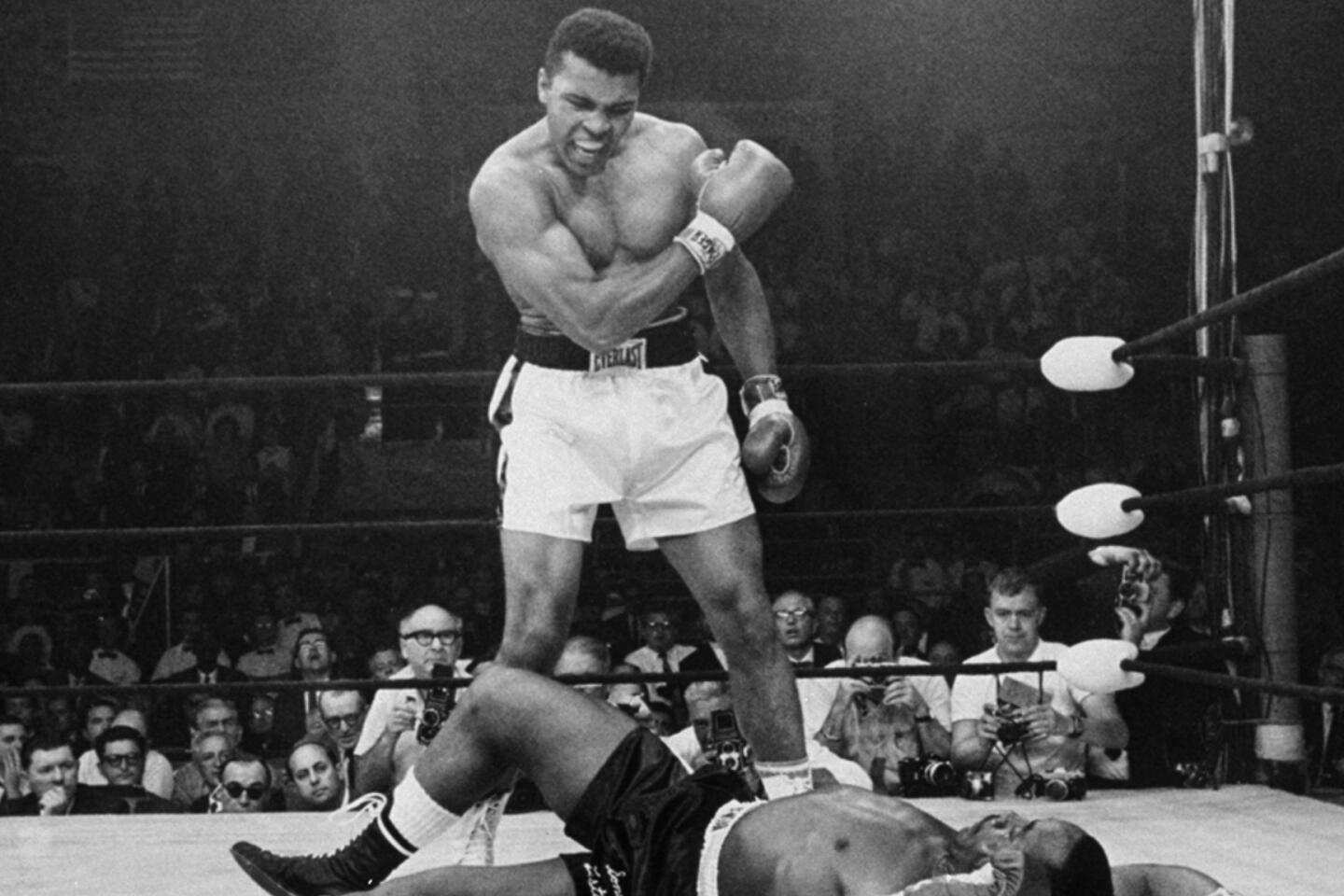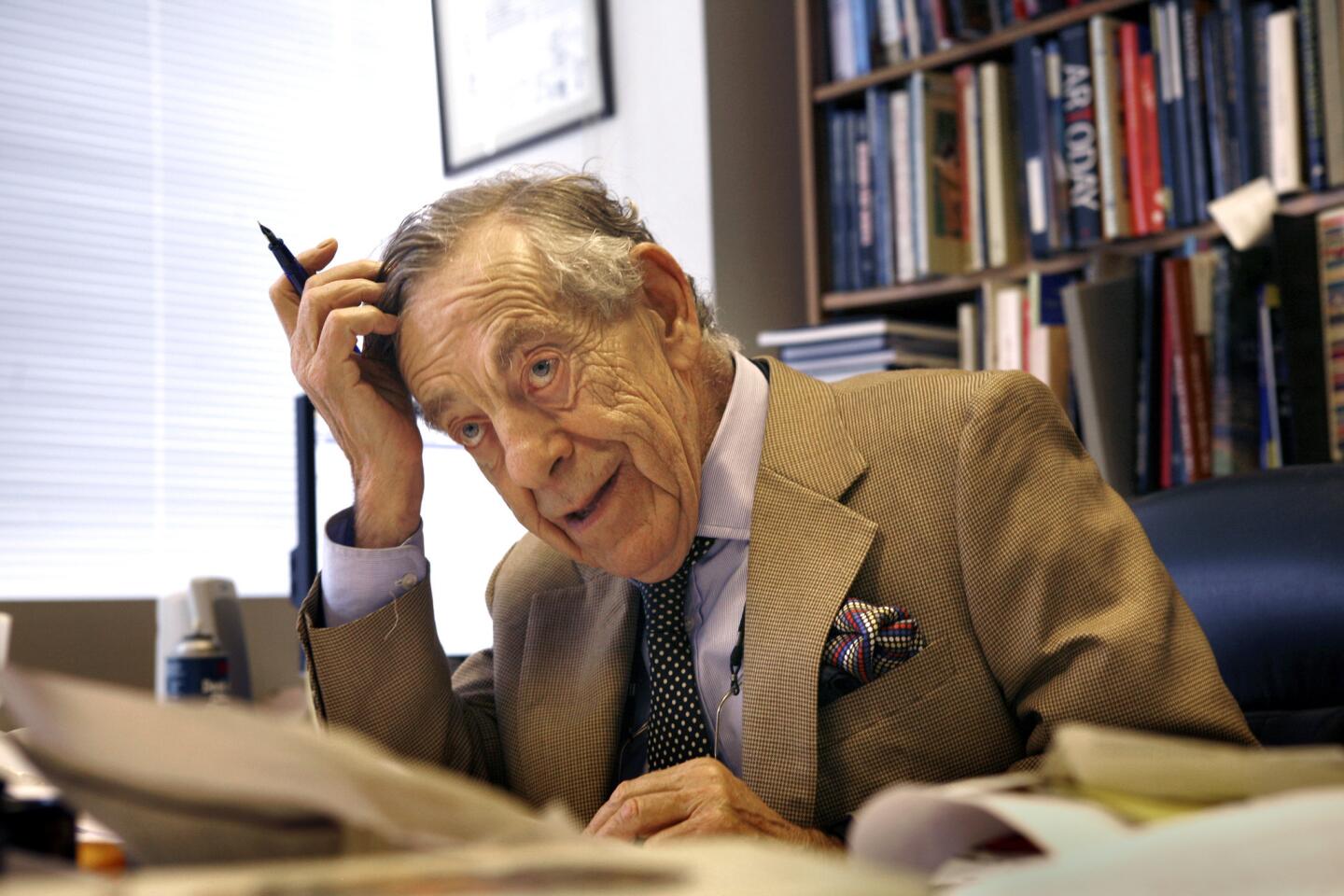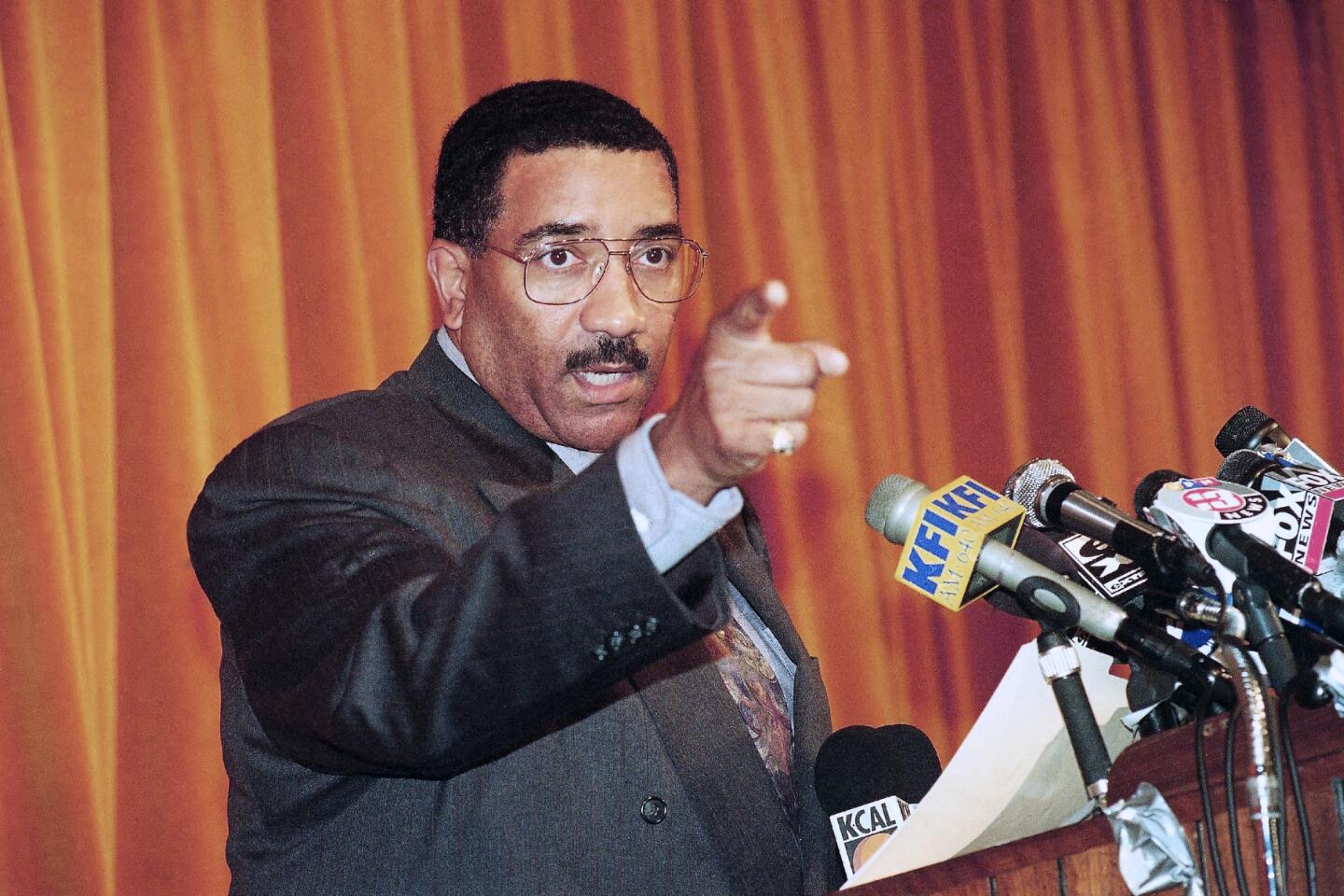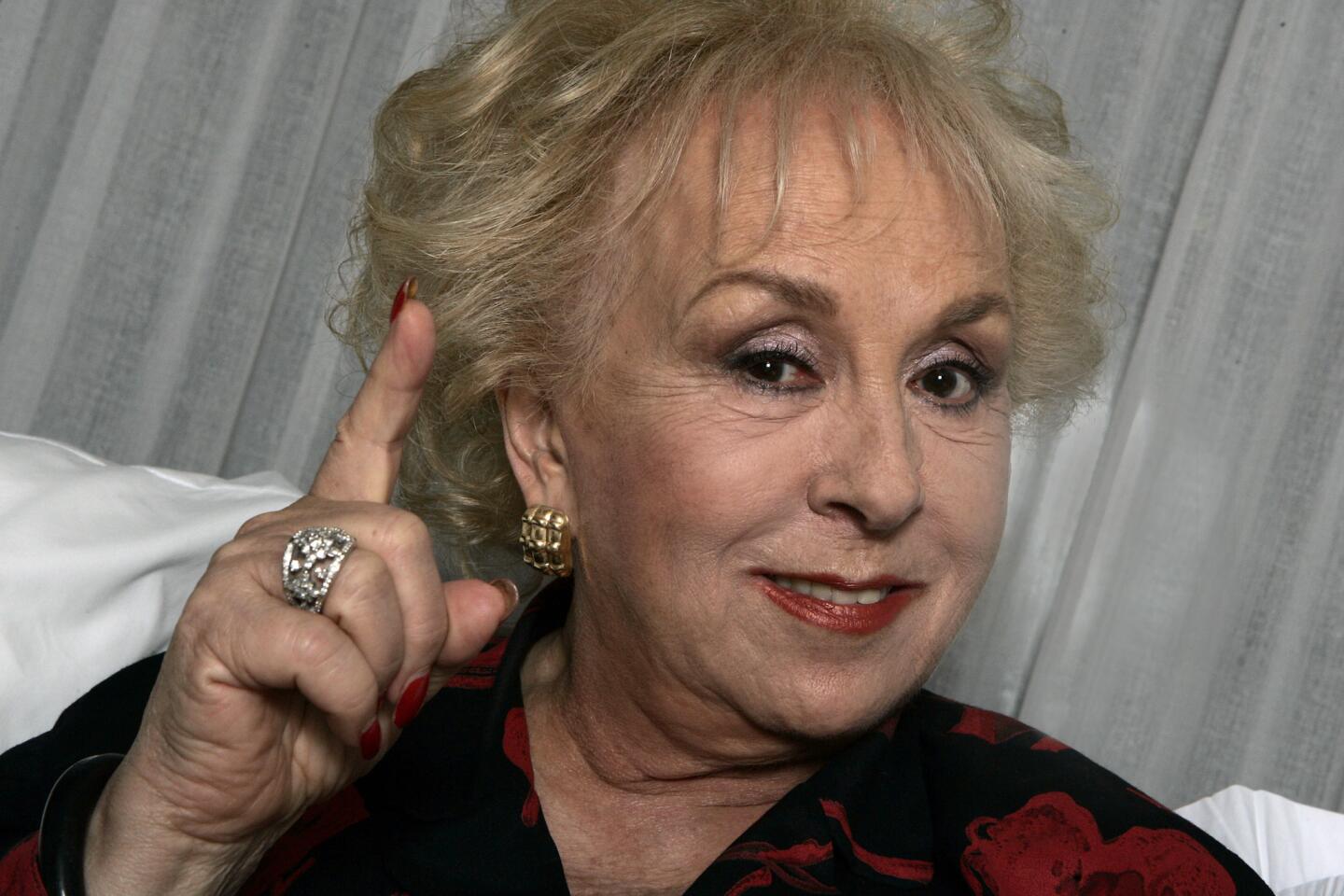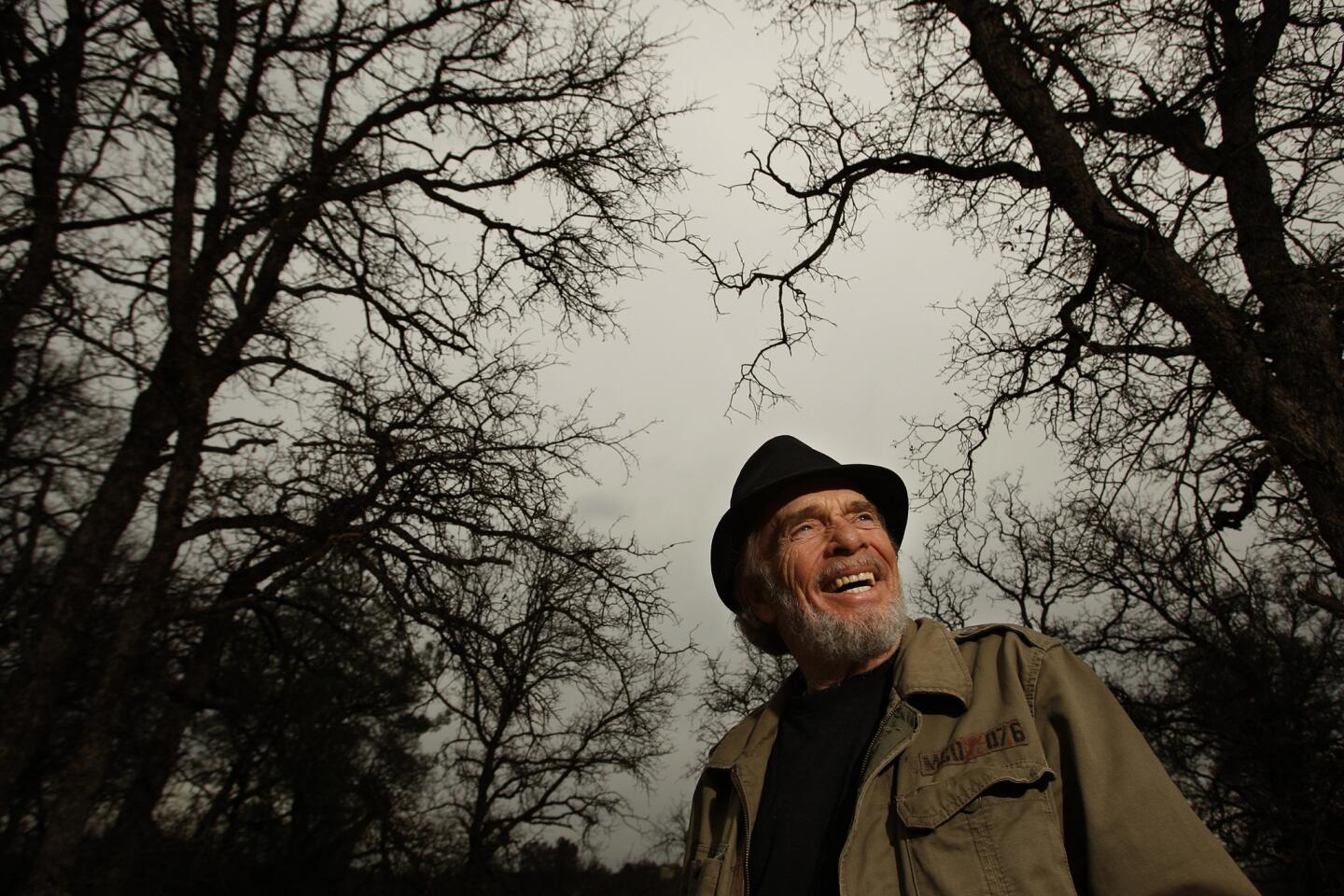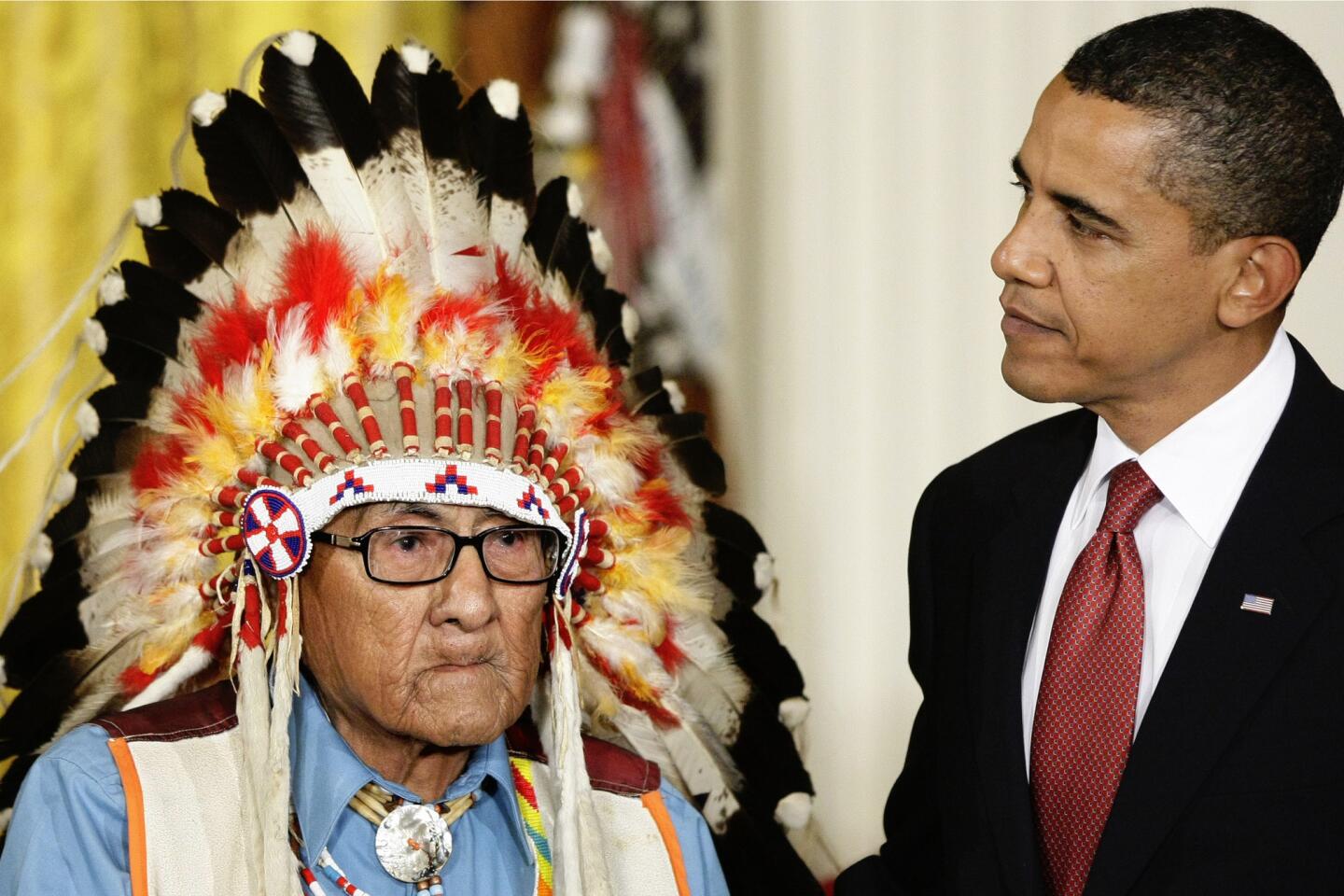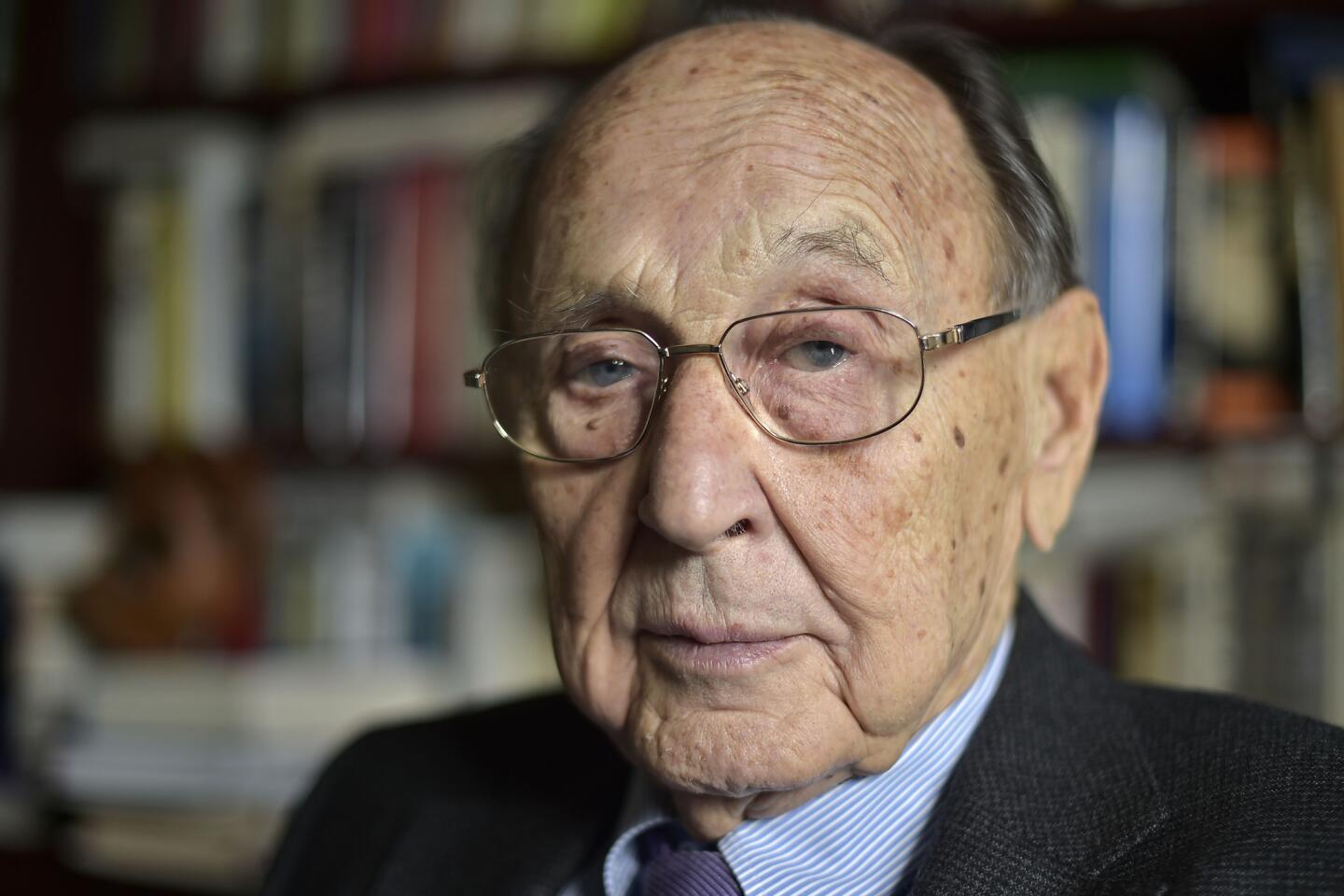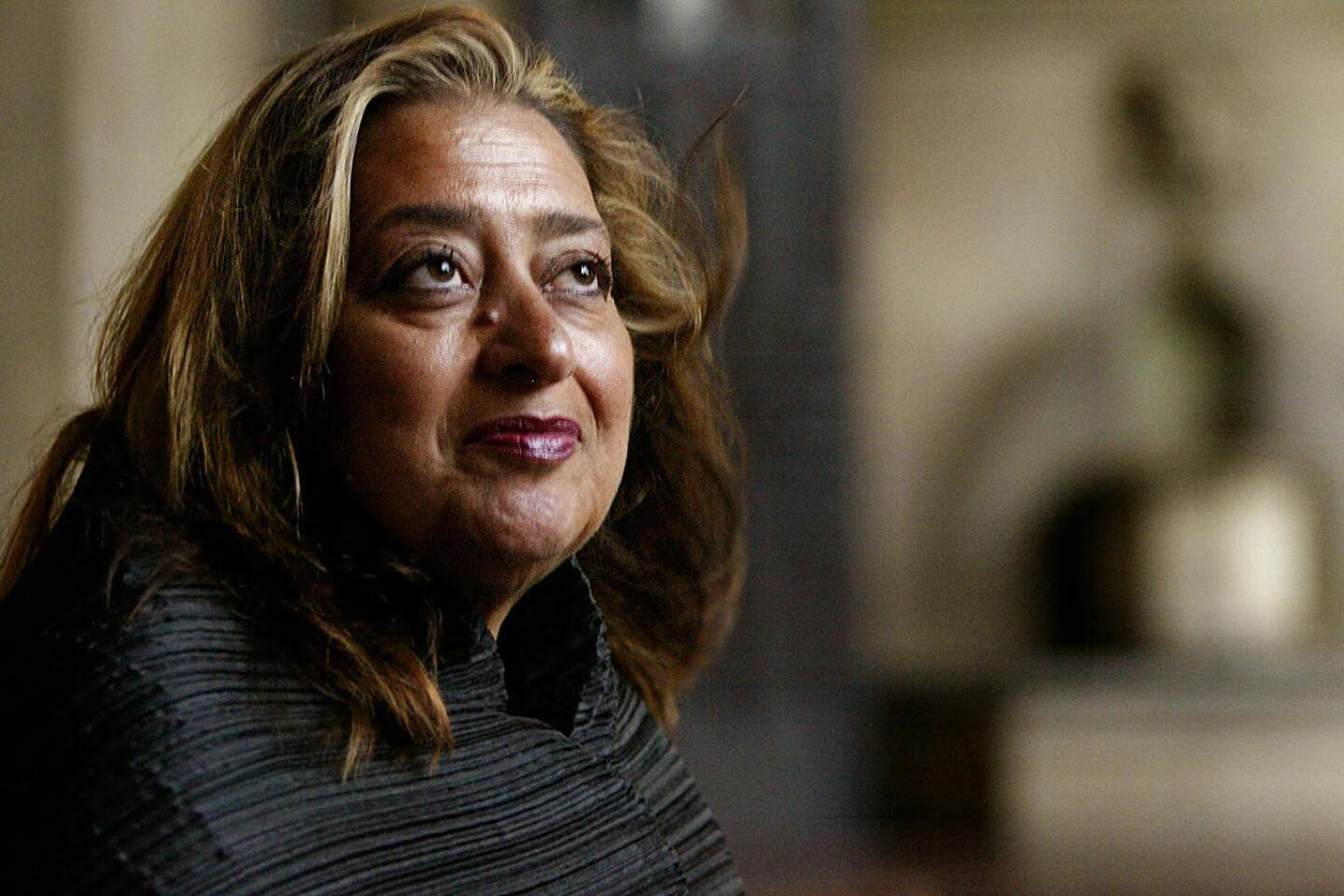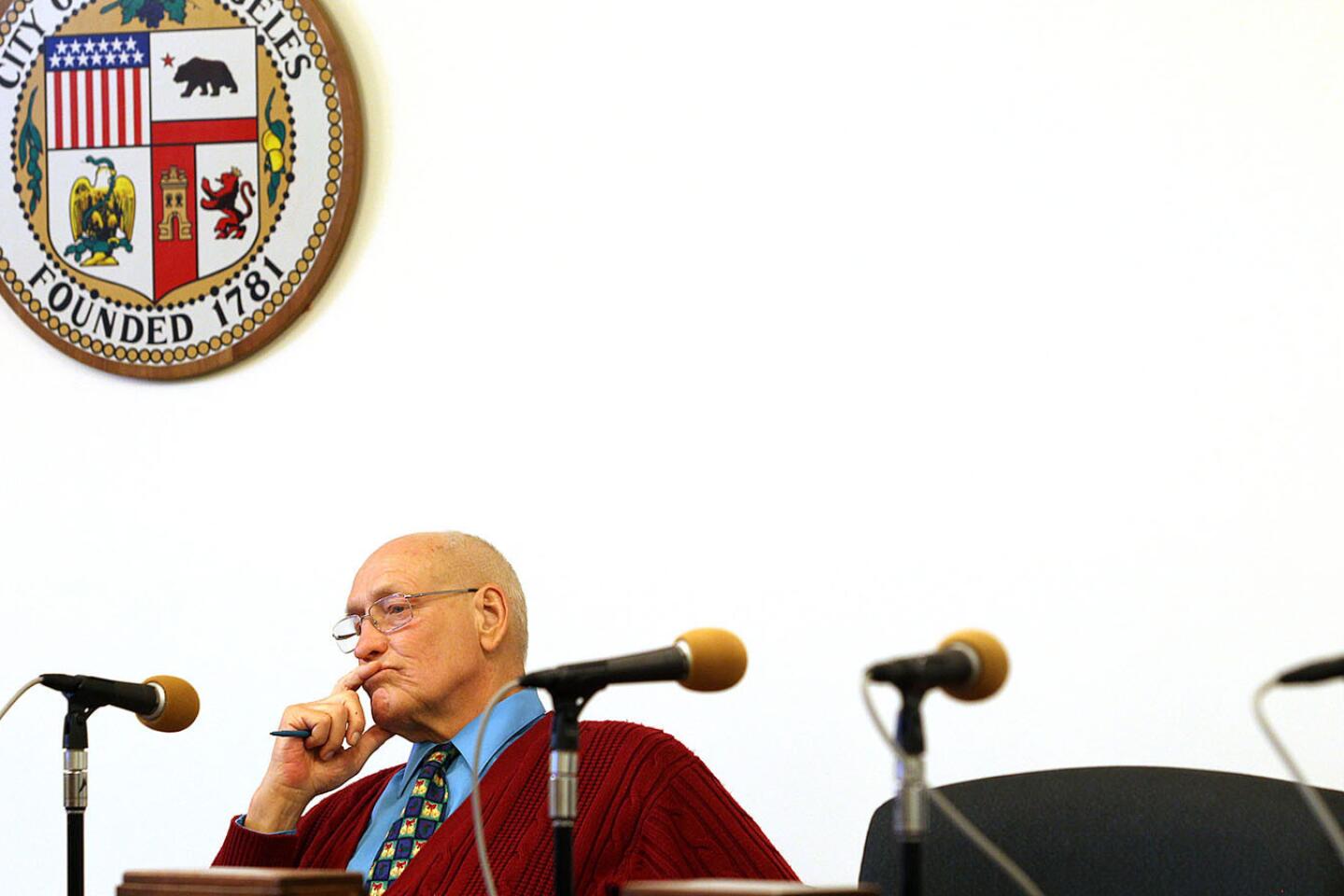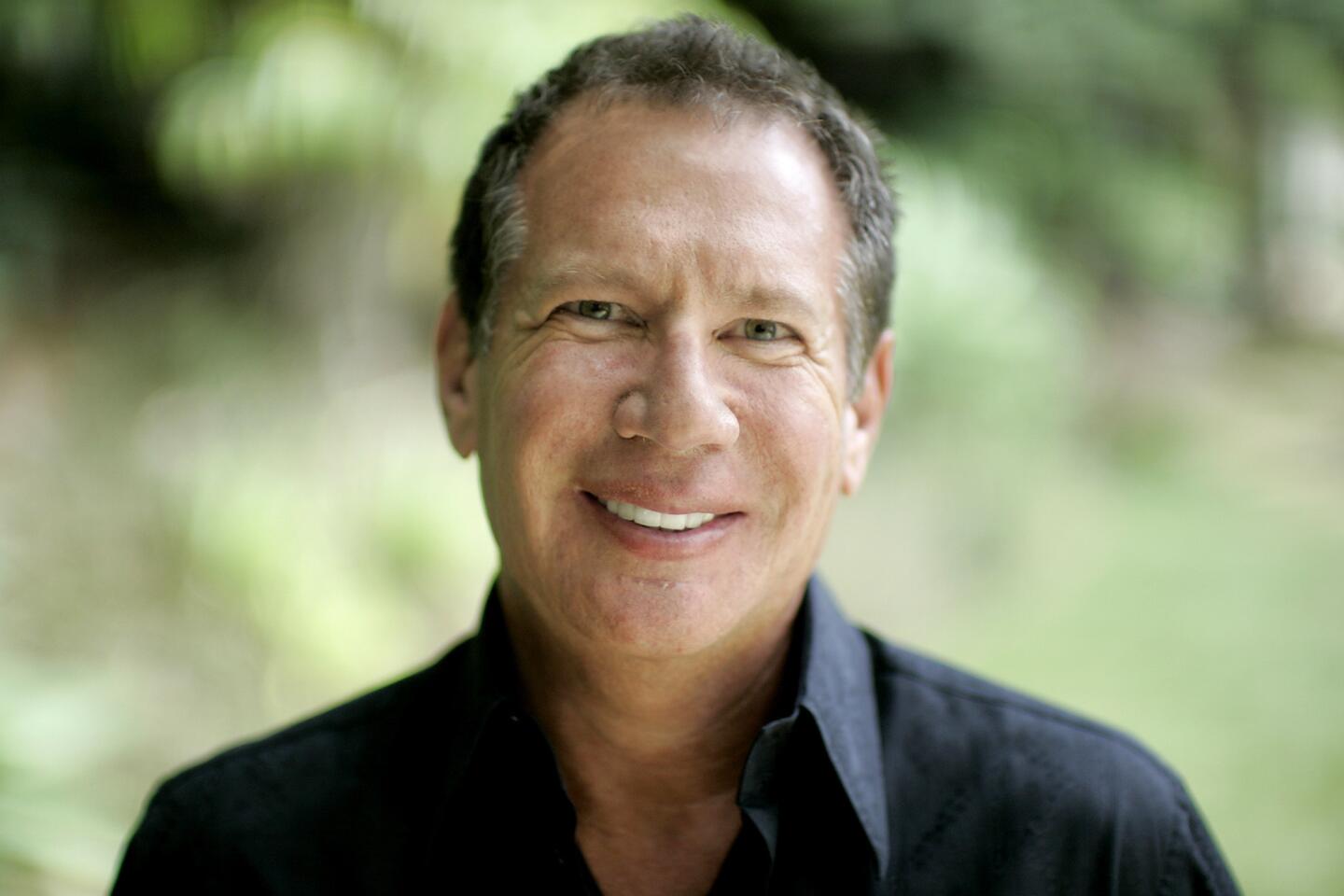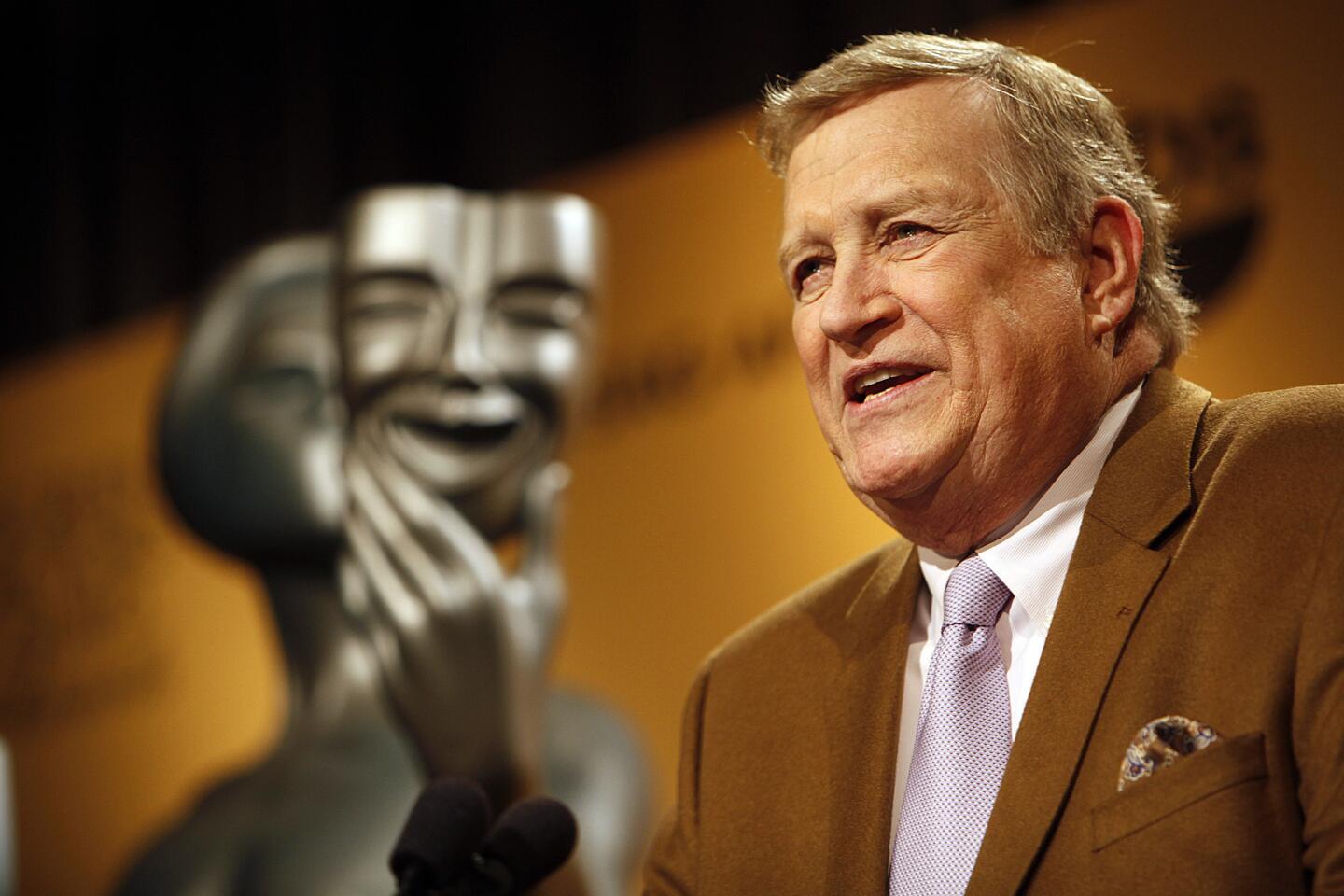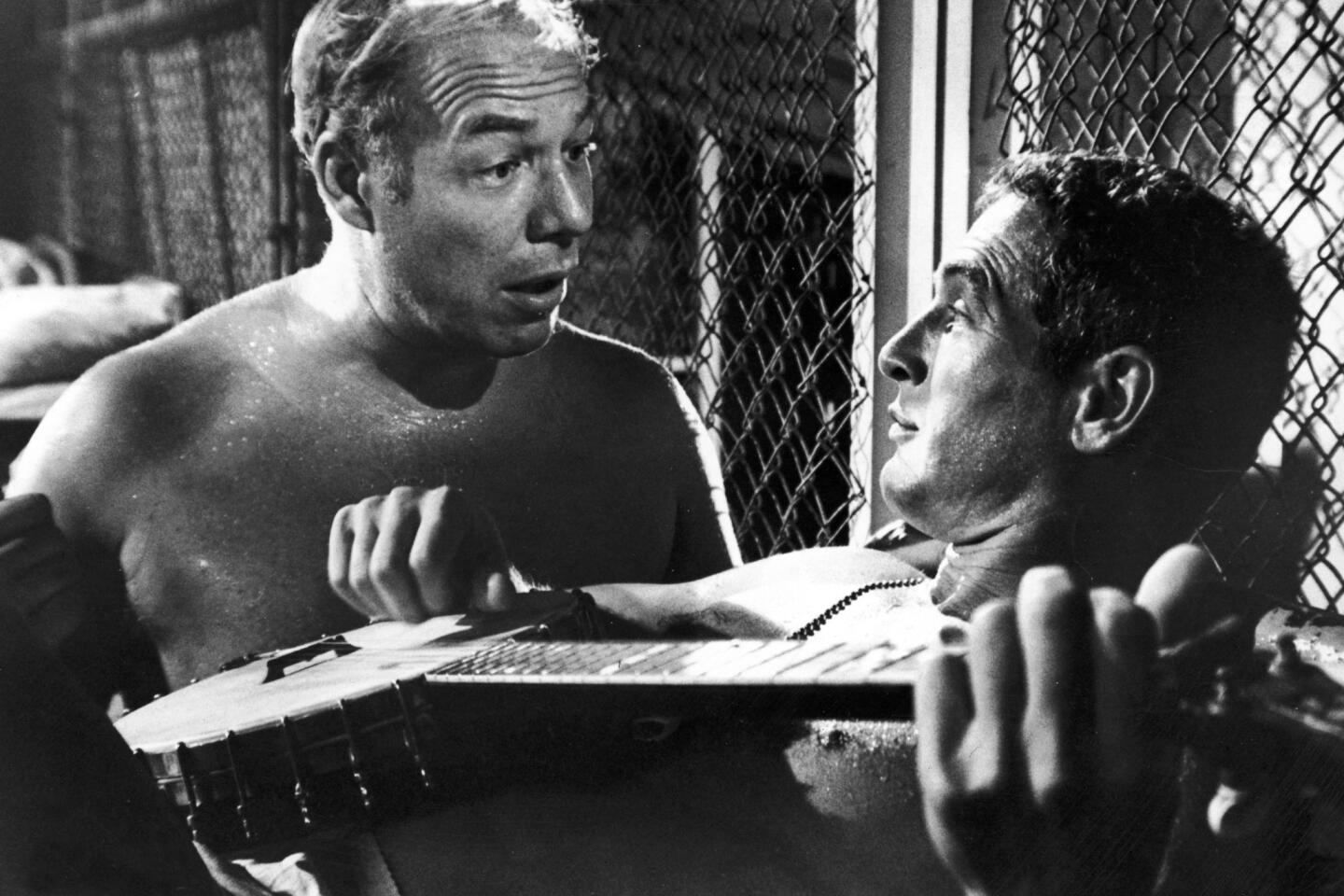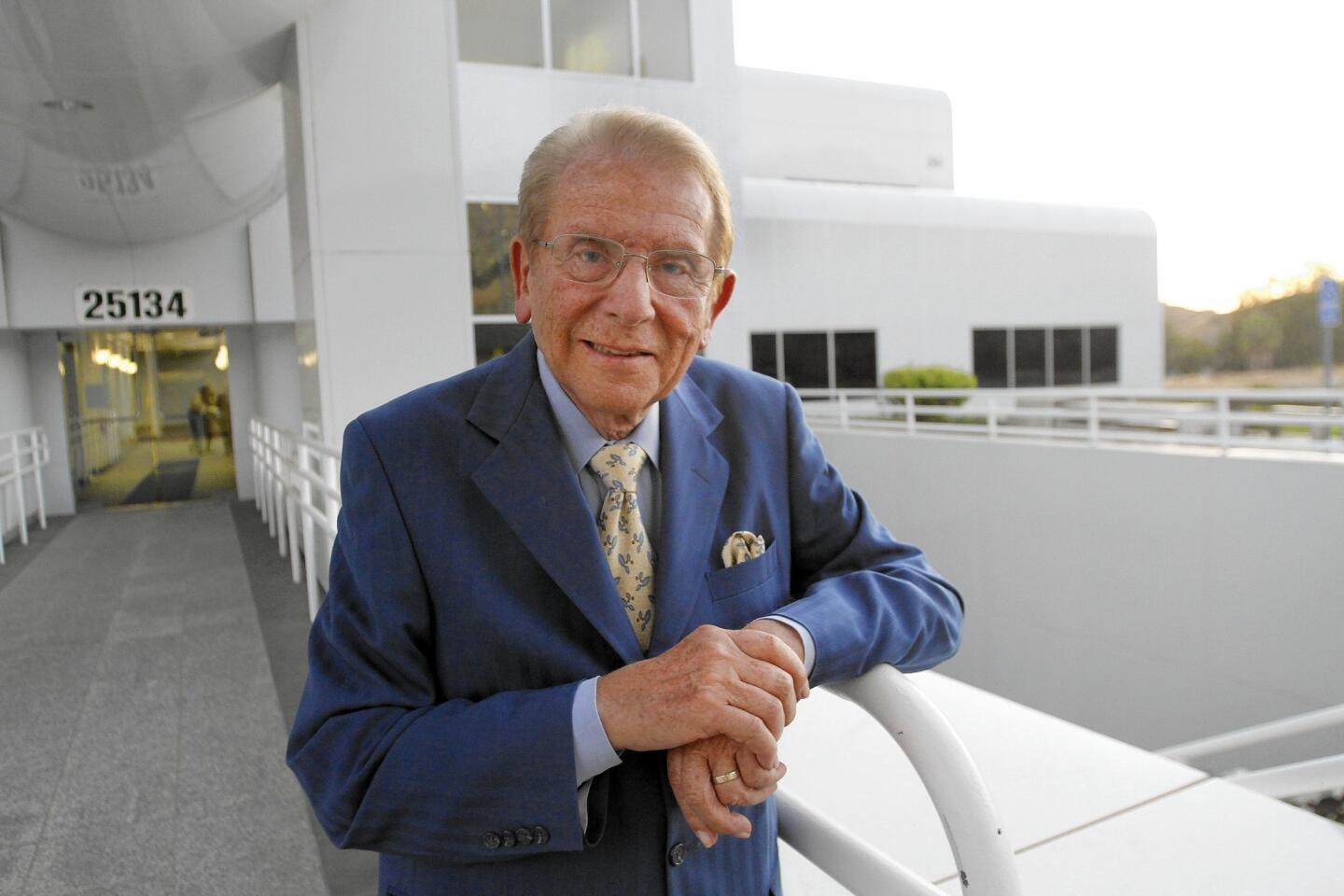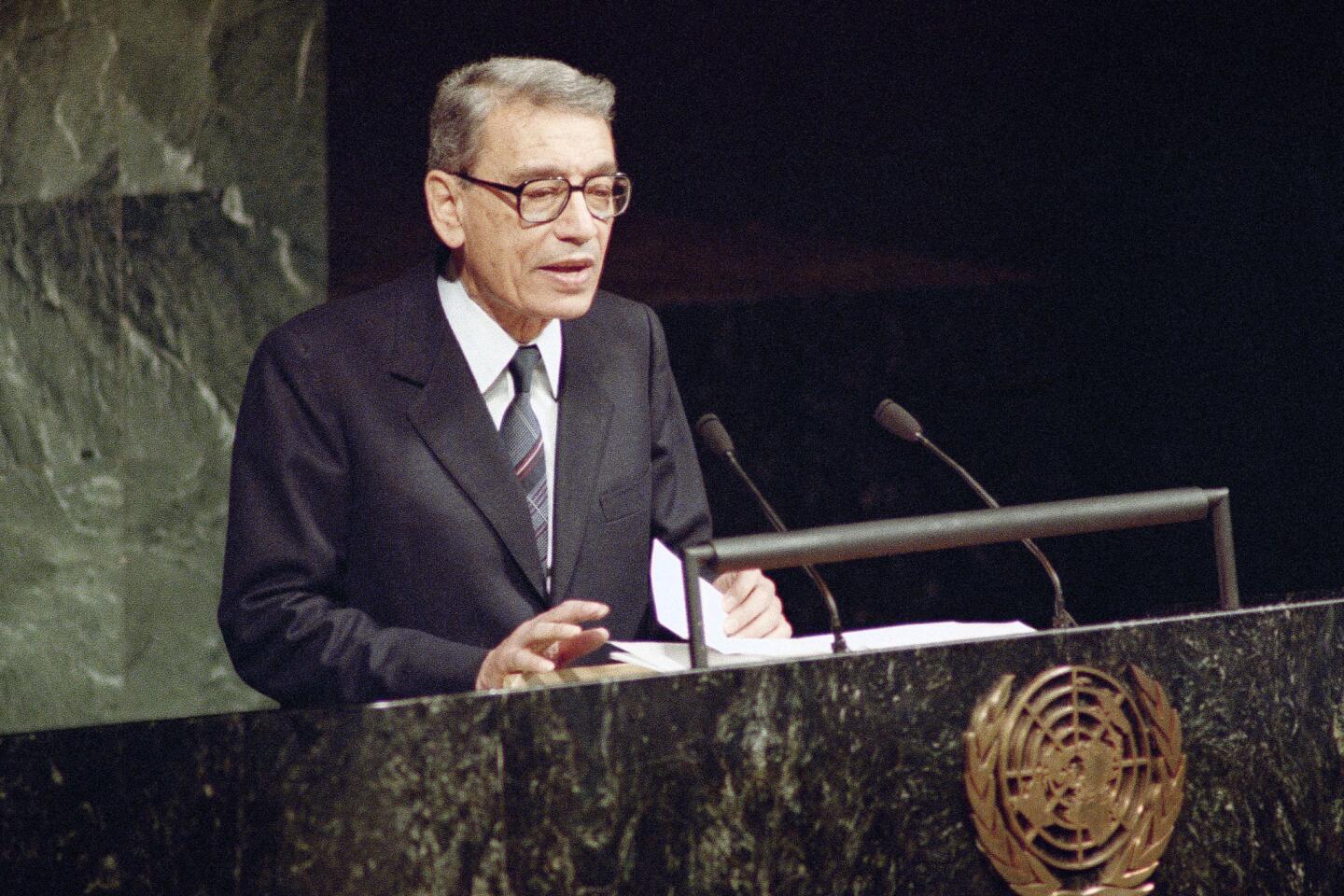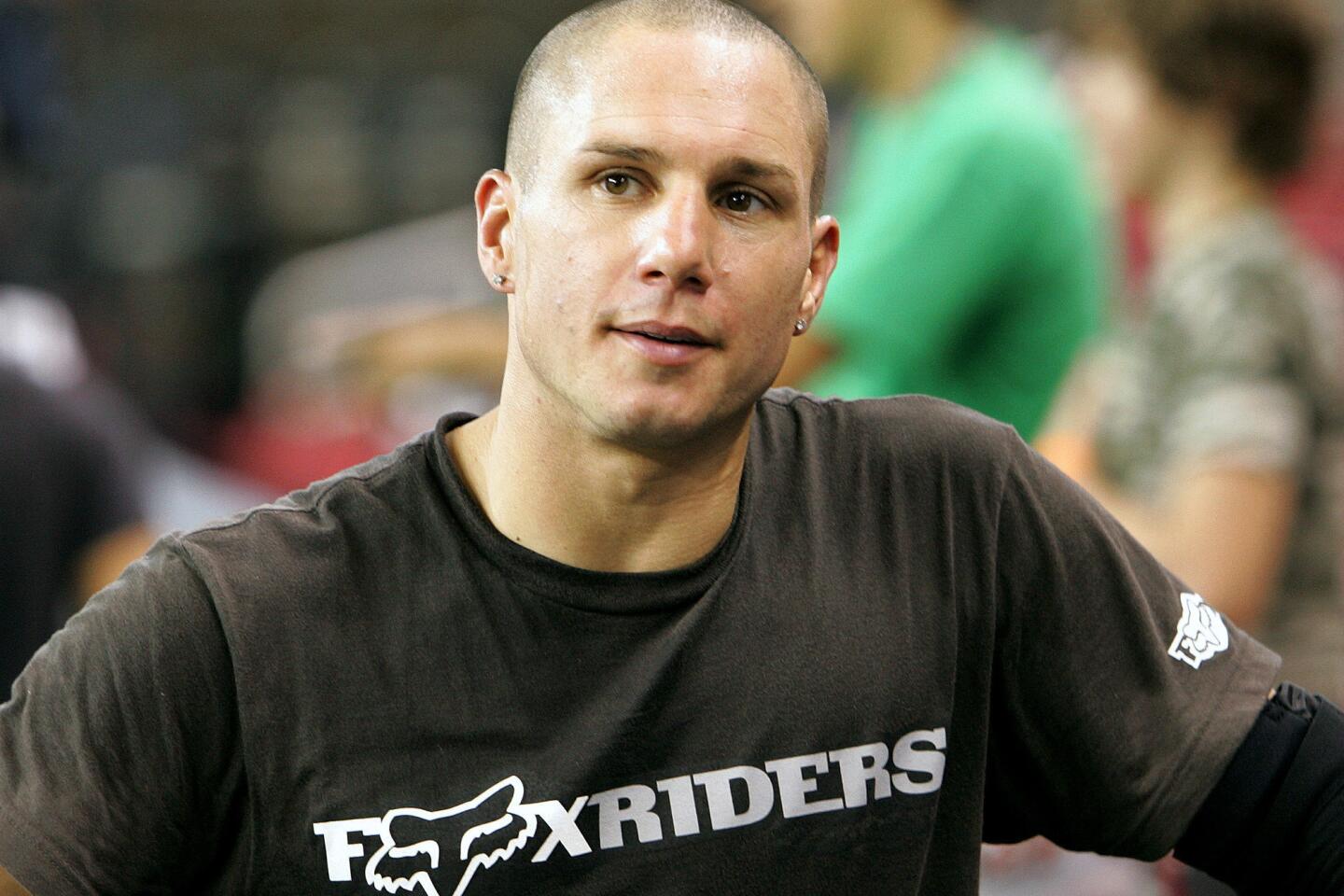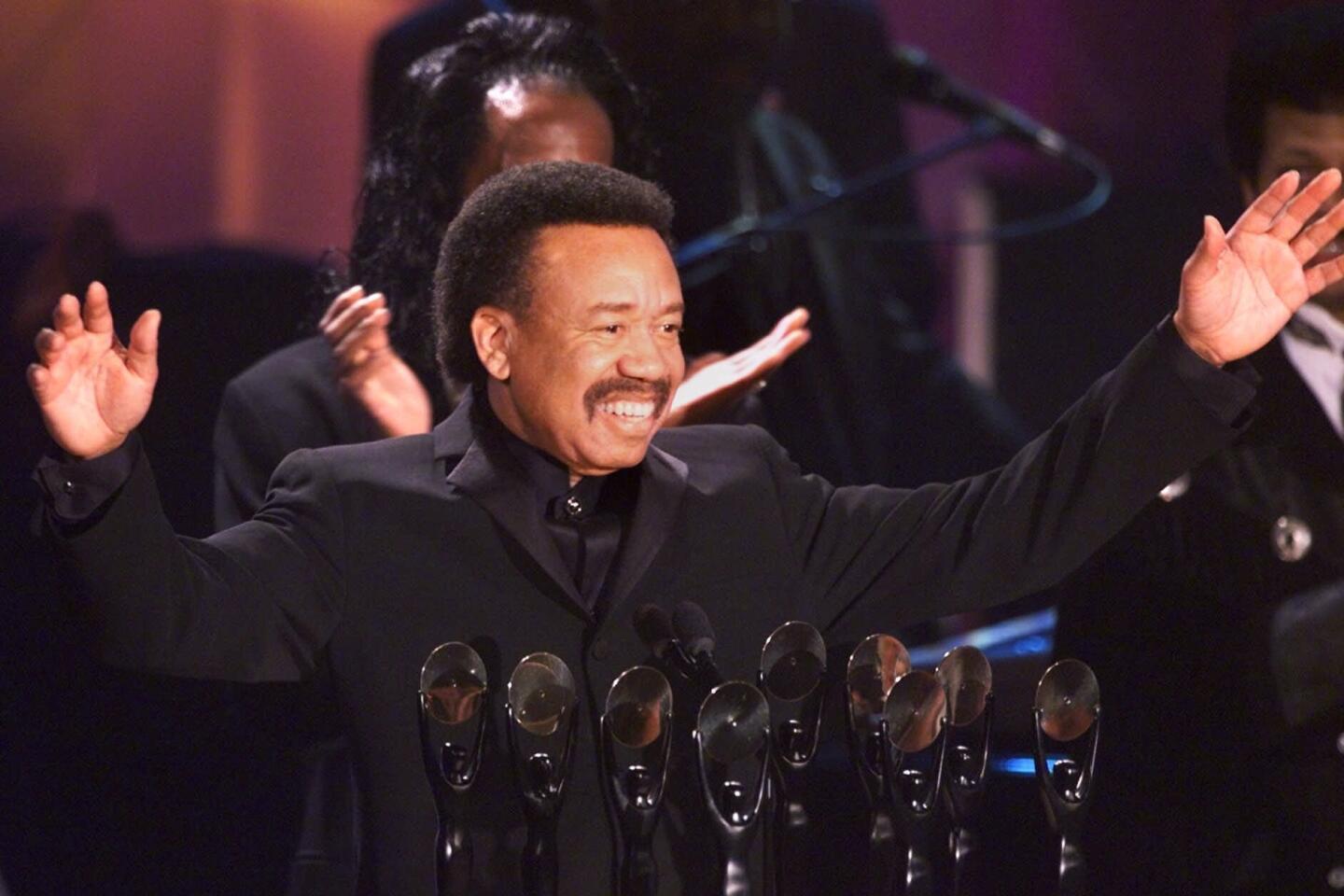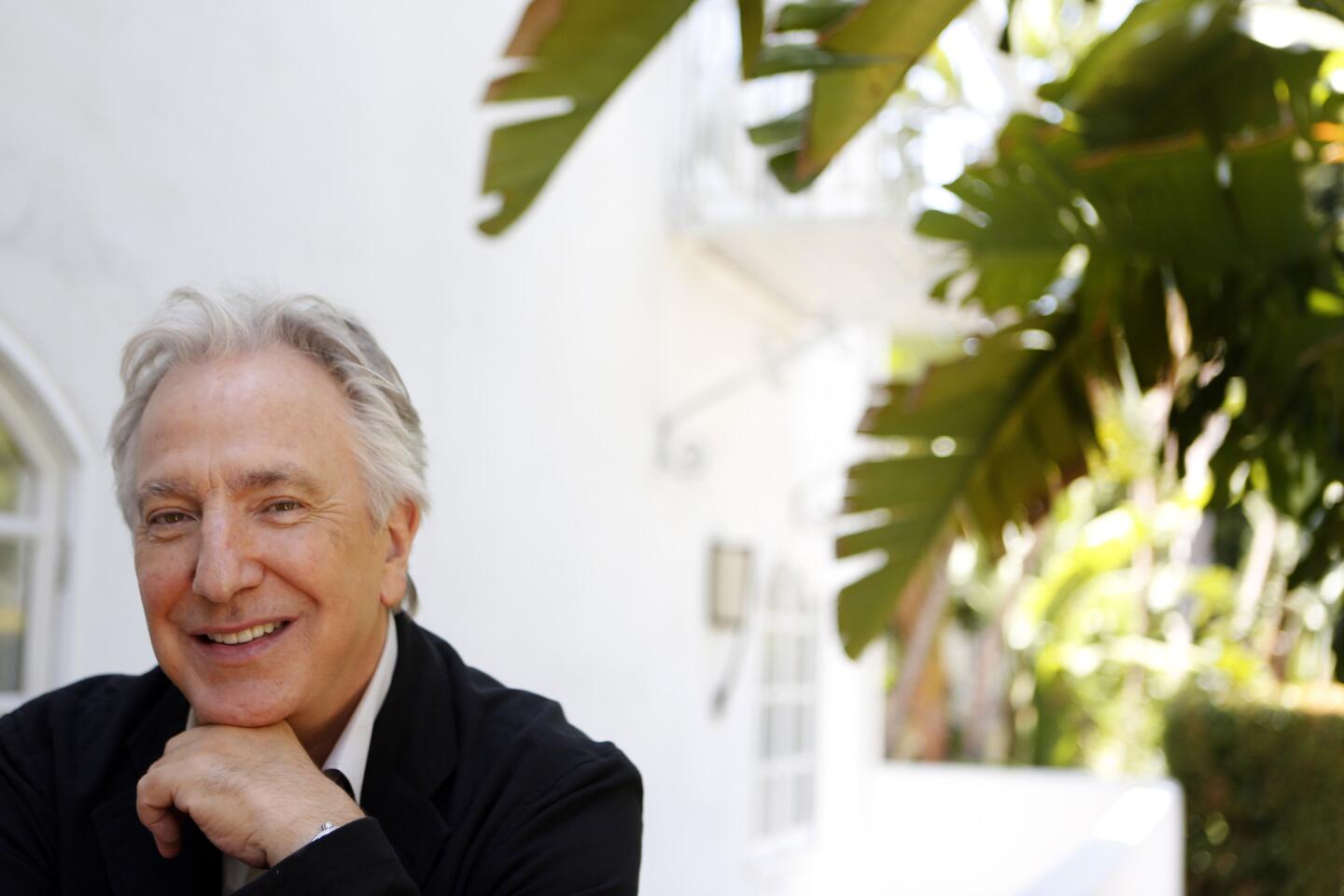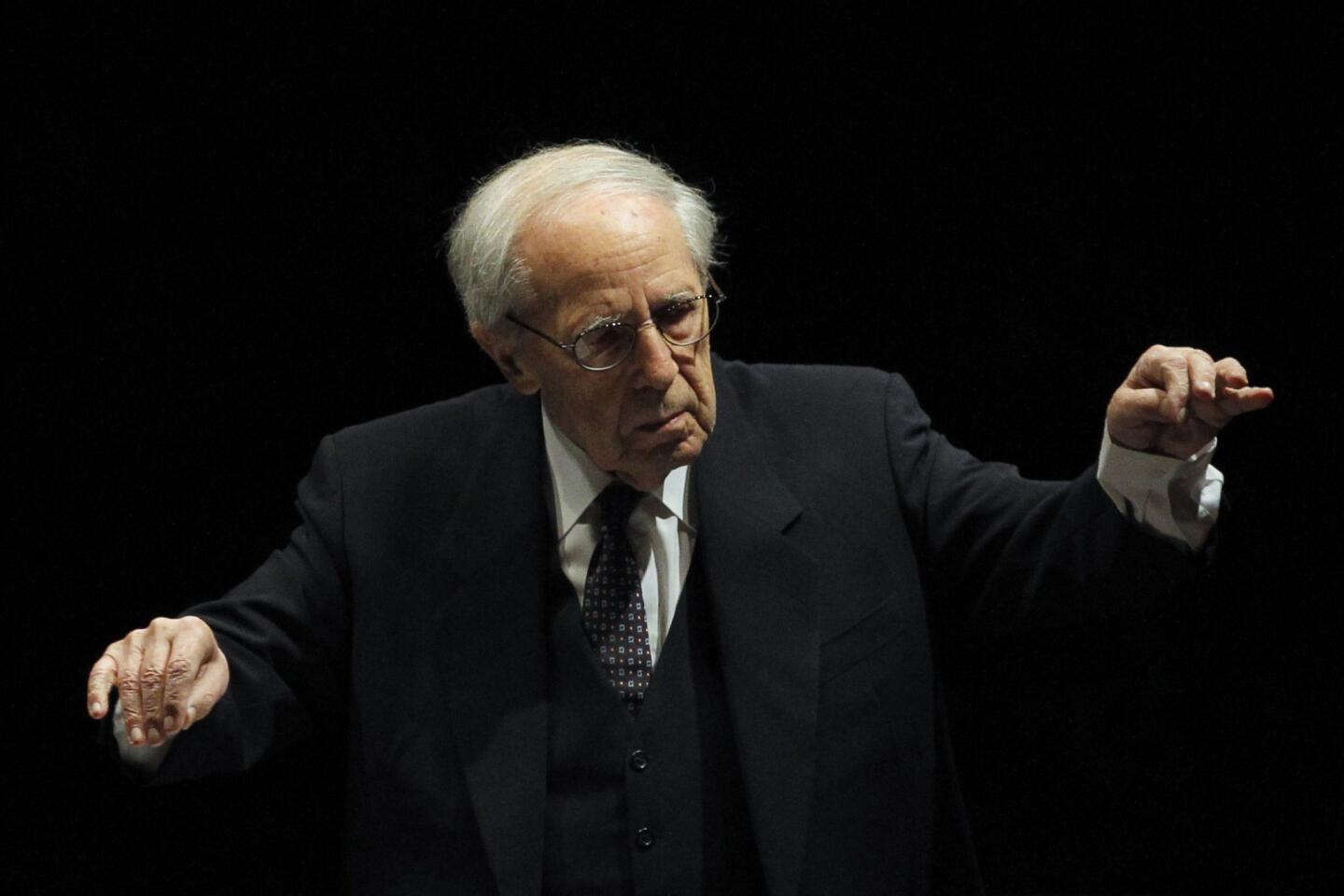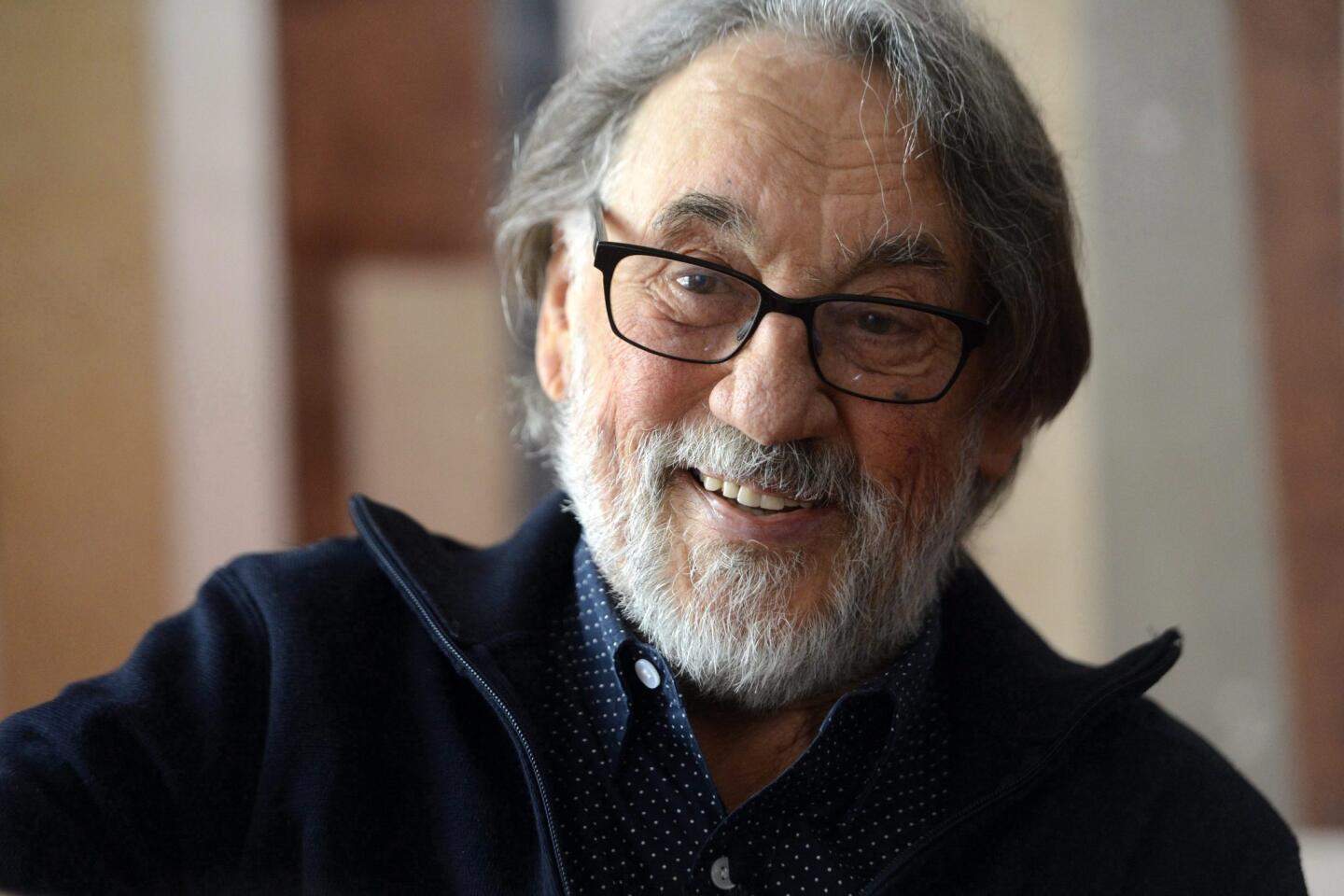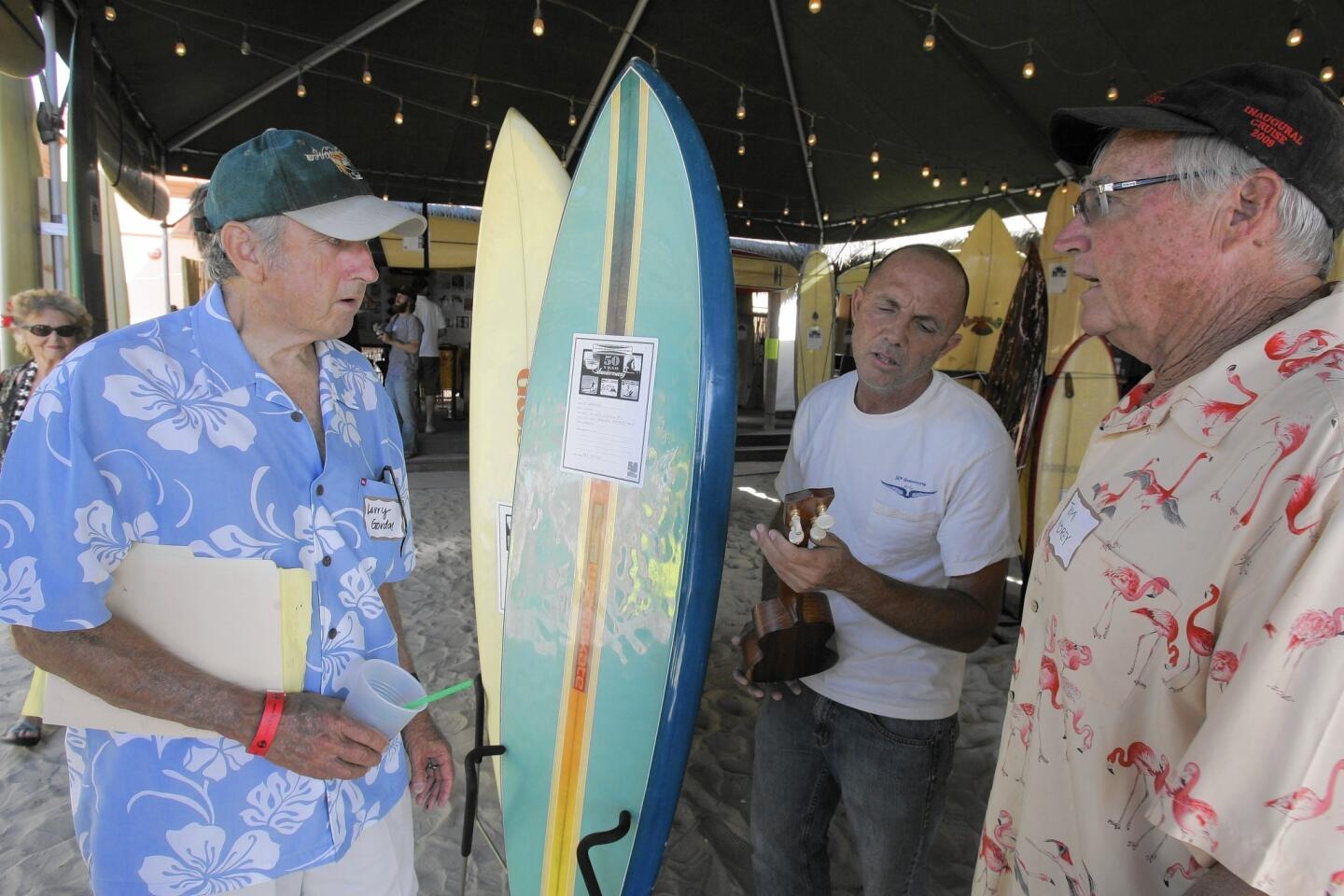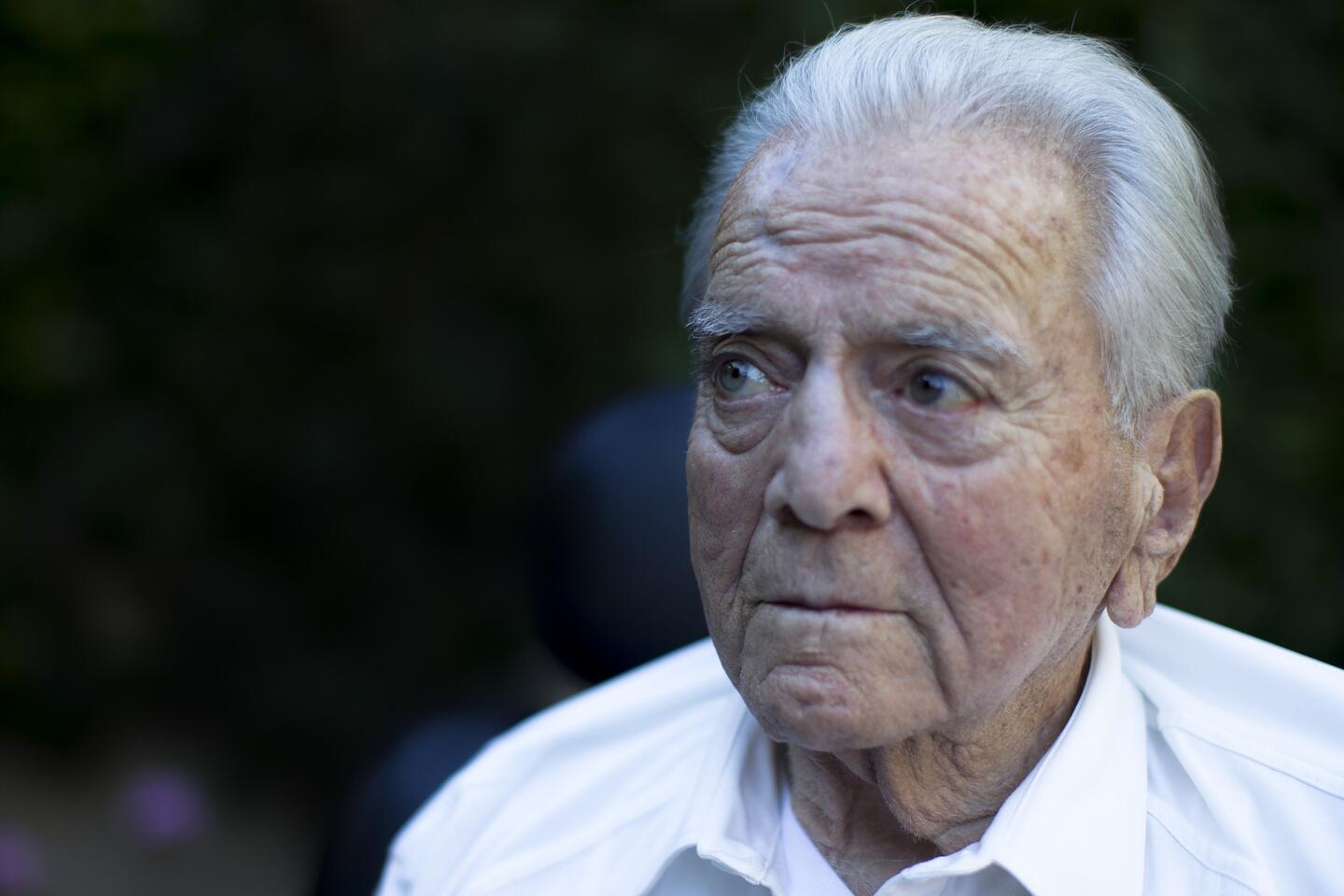Nat Hentoff, the venerable political and cultural columnist who distinguished himself as a preeminent jazz critic for DownBeat magazine in the 1950s and, in later decades, as a passionate defender of 1st Amendment freedoms in columns for the Village Voice, the New Yorker, the Washington Post and the Washington Times, has died. He was 91.
His son, Tom Hentoff, told the Associated Press that his father died from natural causes at his Manhattan apartment.
For his 60-plus-year career as a journalist, Hentoff was preoccupied with authenticity and truth — no matter how uncomfortable or unvarnished. And while he would point to jazz and “being Jewish” as deep influences in his writing and thinking, it was his unbending protection of the 1st Amendment and civil liberties that he considered “of all of my obsessions ... the strongest.”
The author of more than three dozen books, and the subject of the 2014 documentary “The Pleasures of Being Out of Step: Notes on the Life of Nat Hentoff,” Hentoff moved seamlessly from discourses on jazz and politics, adult and young-adult fiction, mysteries and memoir.
Considered a fiercely independent thinker, Hentoff consistently concerned himself with America’s conscience and how it was publicly expressed — both through its home-grown musical traditions (jazz in particular, but later, a swath of American vernacular music — folk, blues, bluegrass) and in his strict, to-the-letter and often controversial interpretation of the Constitution.
“I think we’re in a perilous state,” Hentoff told the New York Times in 2009, “in that, to paraphrase [President] Madison, the way to keep this republic is to have an informed electorate.” Instead, we have “constitutional illiteracy, which is rampant.”
Hentoff’s long career was built around agitating, challenging what he often saw as faulty rhetoric and party-line thinking — a convenient tailoring (or silencing) of language to meet the needs of the crisis of the moment — including book banning and abortion.
An often self-described member of “The Proud and Ancient Order of Stiff-Necked Jewish Atheists,” Hentoff dodged nothing. He believed not in fewer words, but better ones: a clear, concise argument, supported with research and reporting.
In a San Francisco Chronicle review of his 1993 book, “Free Speech For Me — But Not For Thee,” Patricia Holt wrote: “He’s self-righteous, preachy and pompous — but as is true with his book ... Hentoff is also one of the most accessible enlightening authors in the country.”
Over the years, in his books, newspaper and magazine columns, or behind the lectern (he held adjunct positions at New York University and the New School for Social Research), Hentoff had often described himself as a “man of the left,” yet persistently confounded those who identified similarly. This was due primarily to his unwavering stance on hot-button issues such as abortion (he opposed the practice), capital punishment (he supported the death penalty) and freedom of speech (he opposed hate-crime laws because he said they “dangerously” punish thought).
“Nat had a way of pissing off the writers and editors of two generations of lefties ... by which, I mean just about everyone who came of age from the Vietnam era on,” Village Voice contributor Allen Barra wrote in 2008, when Hentoff was laid off after a 60-year association with the paper. “[It] was unmatched by anyone I know of.”
For many, it was difficult to square the hard-line columnist with his earlier incarnation: the bearded Greenwich Village denizen who spent many after-the-last-set hours talking with African American jazz legends — among them John Coltrane and Max Roach, who struggled with and articulated oppression within their music.
When discussing his opposition to abortion in a 1985 piece for the New Republic, he declared that he was not just a “a pro-lifer,” but “a Jewish, atheist, civil libertarian, left-wing pro-lifer,” causing a furor. “The New Republic got 30 or 40 letters on that one, mostly negative,” he recalled in a 1995 interview with the Washington Post. “My wife agrees with them, too. She tells me I’m enslaving women.”
Hentoff didn’t see these hyphenated positions as mutually exclusive: As part of being a multifaceted citizen of the United States, it was his right.
Eschewing easy categorization, Hentoff’s positions weren’t provocative for controversy’s sake, but were a rigorous exercise in exploring the very fiber of what defined and connected the country. His deep explorations often led him to be ostracized by critics and colleagues, but for him, it was simply a consequence that he saw as part of the territory of truth-telling.
“I used to consider myself a liberal,” he told the Jewish Week in 1997, “but in an area that means a lot to me, liberals were just as much censors as conservatives. They wanted to kill free speech.”
It was too risky, he believed, to toe what he saw as the party line, if these freedoms implicit in the very definition of what it is to be American were qualified: “If children do not get the sense that the Constitution, very much including the Bill of Rights, actually belongs to them, they will grow up indifferent to their own — and other’s — liberties and rights. And if enough of the citizenry are careless in these matters, those liberties and rights will be suicidally lost.”
The son of Jewish immigrants from Russia, Nathan Irving Hentoff was born in Boston on June 10, 1925. His parents, Simon and Lena, settled in Roxbury, a predominantly Jewish neighborhood, to raise their son in their Old World traditions. In later years, Hentoff would characterize the surrounding environment’s anti-Semitism as “exuberant,” so virulent that he often fought for safe passage home or to school.
His time in Roxbury was a bitter, violent taste of American intolerance that would shape him. Those years became a crucible: “I was an outsider,” Hentoff once wrote, “and therefore I learned to be continually skeptical of what insiders with power said and believed.”
Being an outcast created a bridge-building empathy of understanding. From an early age, Hentoff made a connection between the forthright playing of jazz musicians and the outside-the-lines possibilities of an improvised life. Hentoff frequently related the story that he first heard jazz tumbling out a window of a downtown record store while on his way to classes at the prestigious Boston Latin Academy. “A fierce wailing of brass and reeds, a surging, pulsing cry that made me cry out too.” He was hooked. He would hide copies of DownBeat in his geography textbook, would frequent Boston’s jazz joints and befriended the musicians.
Hentoff’s journalism career was christened by a free speech battle. At Northeastern University, he became editor of the student newspaper. His staff had uncovered a corruption story that involved city government. The administration intervened, asking Hentoff to pull the story. Instead, the entire staff quit. From then on, Hentoff became passionately interested in the freedom of the press — and the attendant 1st Amendment freedoms.
1/61
Wong’s masterly touch brought a poetic quality to Disney’s “Bambi” that has helped it endure as a classic of animation. The pioneering Chinese American artist influenced later generations of animators. Full obituary
(Peter Brenner / Handout) 2/61
After bursting onto the scene opposite Gene Kelly in the classic 1952 musical “Singin’ in the Rain,” Reynolds became America’s Sweetheart and a potent box office star for years. Her passing came only one day after her daughter, Carrie Fisher, died at the age of 60. Reynolds was 84. Full obituary
(John Rooney / Associated Press) 3/61
George Michael, the English singer-songwriter who shot to stardom in the 1980s as half of the pop duo Wham!, went on to become one of the era’s biggest pop solo artists with hits such as “Faith” and “I Want Your Sex.” He was 53. Full obituary
(Francois Mori / Associated Press) 4/61
The thoracic surgeon came up with an anti-choking technique in 1974. So simple it could be performed by children, the eponymous maneuver made Heimlich a household name. He was 96. Full obituary
(Al Behrman / Associated Press) 5/61
The hugely popular south Indian actress later turned to politics and became the highest elected official in the state of Tamil Nadu. She was 68. Full obituary
(AFP / Getty Images) 6/61
Best known for her portrayal of Carol Brady on “The Brady Bunch,” Henderson
portrayed an idealized mother figure for an entire generation. Her character was the center of the show, cheerfully mothering her brood in an era when divorce was becoming more common. She was 82. Full obituary
(Jay L. Clendenin / Los Angeles Times) 7/61
Dubbed “Dr. Wonderful” by the media, the Texas surgeon performed the first successful heart transplant in the United States and the world’s first implantation of a wholly artificial heart. He also founded the Texas Heart Institute in Houston. He was 96. Full obituary
(David J. Phillip / Associated Press) 8/61
The prominent Los Angeles attorney went from defending his father, a powerful mob boss, to representing celebrities, corrupt businessmen, drug kingpins and the so-called Hollywood Madam, Heidi Fleiss. He was 70. Full obituary
(Ken Hively / Los Angeles Times) 9/61
The award-winning journalist wrote for the Washington Post and the New York Times before becoming an anchor of public television news programs “PBS NewsHour” and “Washington Week.” Her career also included moderating the vice presidential debates in 2004 and 2008. She was 61. Full obituary
(Brendan Smialowski / Getty Images) 10/61
Instantly recognizable for his long white mane and a rich, hearty voice, Russell sang, wrote and produced some of rock ‘n’ roll’s top records. His hits included “Delta Lady,” “Roll Away the Stone,” “A Song for You” and “Superstar.” He was 74. Full obituary
(Luis Sinco / Los Angeles Times) 11/61
The singer-songwriter’s literary sensibility and elegant dissections of desire made him one of popular music’s most influential and admired figures for four decades. Cohen is best known for his songs such as “Hallelujah,” “Suzanne” and “Bird on the Wire.” He was 82. Full obituary
(Joel Saget / AFP / Getty Images) 12/61
Reno was the first woman to serve as United States attorney general. Her unusually long tenure began with a disastrous assault on cultists in Texas and ended after the dramatic raid that returned Elian Gonzalez to his Cuban father. She was 78. Full obituary
(Dennis Cook / Associated Press) 13/61
The 1960s radical was in the vanguard of the movement to stop the Vietnam War and became one of the nation’s best-known champions of liberal causes. He was 76. Full obituary
(George Brich / Associated Press) 14/61
Tabei was the first woman to climb Mount Everest in 1975. In 1992, she also became the first woman to complete the “Seven Summits,” reaching the highest peaks of the seven continents. She was 77. Full obituary
(AFP / Getty Images) 15/61
Nixon was the creative force behind the popular soap operas “One Life to Live” and “All My Children.” She was a pioneer in bringing serious social issues, like racism, AIDS and prostitution, to daytime television. She was 93. Full obituary
(Chris Pizzello / Associated Press) 16/61
The former Israeli president was one of the founding fathers of Israel. The Nobel peace prize laureate was an early advocate of the idea that Israel’s survival depended on territorial compromise with the Palestinians. He was 93. Full obituary
(AFP / Getty Images) 17/61
A seven-time professional major tournament champion, Palmer revolutionized sports marketing as it is known today, and his success contributed to increased incomes for athletes across the sporting spectrum. He was 87. Full obituary
(David J. Phillip / Associated Press) 18/61
Known as the Vatican’s exorcist, Amorth, a Roman Catholic priest, helped promote the ritual of banishing the devil from people or places. He was 91. Full obituary
(AFP / Getty Images) 19/61
The American playwright was known for works such as “The Zoo Story,” “The Sandbox,” “Who’s Afraid of Virginia Woolf?” and “A Delicate Balance.” He was awarded the Pulitzer Prize for drama three times. He was 88. Full obituary
(Jennifer S. Altman / For the Times) 20/61
The ska pioneer and Jamaican music legend recorded thousands of records, including such hits as “Al Capone” and “Judge Dread.” He helped ignite the ska movement in England, and later helped carry it into the rock-steady era in the mid-1960s. He was 78. Full obituary
(Larry Ellis / Getty Images) 21/61
Known as “the first lady of anti-feminism,” Schlafly was a political activist who galvanized grass-roots conservatives to help defeat the Equal Rights Amendment and, in ensuing decades, effectively push the Republican Party to the right. She was 92. Full obituary
(Christine Cotter / Los Angeles Times) 22/61
O’Brian helped tame the Wild West as the star of TV’s “The Life and Legend of Wyatt Earp” and was the founder of a long-running youth leadership development organization. “Wyatt Earp” became a top 10-rated series and made O’Brian a household name. He was 91. Full obituary
(Ricardo DeAratanha / Los Angeles Times) 23/61
Jerry Heller, the early manager of N.W.A, was an important and colorful personality in the emerging West Coast rap scene in the 1980s. Heller was 75. Full obituary
(Lori Shepler / Los Angeles Times) 24/61
Two-time Oscar nominee Gene Wilder brought a unique blend of manic energy and world-weary melancholy to films as varied as 1971’s children’s movie “Willy Wonka & the Chocolate Factory” and the 1980 comedy “Stir Crazy.” He was 83. Full obituary
(AFP / Getty Images) 25/61
The beloved top-selling Mexican singer wooed crowds on both sides of the border with ballads of love and heartbreak for more than four decades. He was 66. Full obituary
(Wilfredo Lee / Associated Press) 26/61
Known as the “queen of knitwear,” Sonia Rykiel became a fixture of Paris’ fashion scene, starting in 1968. French President Francois Hollande praised her as “a pioneer” who “offered women freedom of movement.” She was 86. Full obituary
(Thibault Camus / Associated Press) 27/61
The conservative political commentator hosted the long-running weekly public television show “The McLaughlin Group” that helped alter the shape of political discourse since its debut in 1982. He was 89. Full obituary
(Kevin Wolf / Associated Press) 28/61
Best-known for his post-bop recordings for Blue Note Records in the 1960s and 1970s, the inventive jazz vibraphonist played with a litany of jazz greats as both bandleader and sideman during a career spanning more than 50 years. He was 75. Full obituary
(Scott Chernis / Associated Press) 29/61
The British actor, who was 3-foot-8, gave life to the “Star Wars” droid R2-D2, one of the most beloved characters in the space-opera franchise and among the most iconic robots in pop culture history. He was 81. Full obituary
(Reed Saxon / Associated Press) 30/61
For many in L.A., Folsom was the face of the Parent Teacher Student Assn., better known as the PTSA or PTA. He served as the official and unofficial watchdog over the Los Angeles Unified School District and wrote about his experiences in his blog. He was 69. Full obituary
(Mark Boster / Los Angeles Times) 31/61
Fountain combined the Swing Era sensibility of jazz clarinetist Benny Goodman with the down-home, freewheeling style characteristic of traditional New Orleans jazz to become a national star in the 1950s as a featured soloist on the “The Lawrence Welk Show.” He was 86. Full obituary
(Luis Sinco / Los Angeles Times) 32/61
Lowery was a pioneer in efforts to help people suffering from poverty, addiction and mental illness move out of tents and cardboard boxes on Los Angeles’ sidewalks and into supportive housing. She was 70. Full obituary
(Lawrence K. Ho / Los Angeles Times) 33/61
Nixon, a Hollywood voice double, can be heard in place of the leading actresses in such classic movie musicals as “West Side Story,” “The King and I” and “My Fair Lady.” She was 86. Full obituary
(Rob Kim / AFP/Getty Images) 34/61
The department store heir’s widow was a socialite and philanthropist who hobnobbed with the world’s elite, epitomized high fashion and was best friends with former first lady Nancy Reagan. She was 93. Full obituary
(Evan Agostini / Associated Press) 35/61
The author and teacher was long established as a leading literary figure of Southern California. Her works include “Golden Days,” “There Will Never Be Another You” and her memoir “Dreaming, Hard Luck and Good Times in America.” She was 82. Full obituary
(Ricardo DeAratanha / Los Angeles Times) 36/61
The Nazi concentration camp survivor won the Nobel in 1986 for his message “of peace, atonement and human dignity.” “Night,” his account of his year in death camps, is regarded as one of the most powerful achievements in Holocaust literature. He was 87. Full obituary
(Allen J. Schaben / Los Angeles Times) 37/61
One of the greatest basketball coaches of any gender or generation, Summitt spent 38 years as coach of the University of Tennessee women’s basketball team before dementia forced her early retirement. She was 64. Full obituary
(Wade Payne / Associated Press) 38/61
The iconic New York Times fashion photographer darted around New York on a humble bicycle to cover the style of high society grand dames and downtown punks with equal verve. He was 87. Full obituary
(Mark Lennihan / Associated Press) 39/61
Aguirre was best known for his portrayal of the towering “Profesor Jirafales,” the likable and often disrespected giraffe teacher on the 1970s-era hit show “El Chavo del Ocho.” The screwball comedy helped usher in an era of edgier comedy in Mexico and elsewhere. Aguirre was 82. Full obituary
(AFP / Getty Images) 40/61
The three-time heavyweight boxing champion’s brilliance in the ring and bravado outside it made his face one of the most recognizable in the world. He was 74. Full obituary
(John Rooney / Associated Press) 41/61
Like Walter Cronkite and Edward R. Murrow, the CBS newsman became part of a group of journalists who set the tone for storytelling on television. He was on “60 Minutes” for 46 years, holding the longest tenure on prime-time television of anyone in history. He was 84. Full obituary
(Carolyn Cole / Los Angeles Times) 42/61
The first African American chief of the Los Angeles Police Department, Williams steadied the agency in the tumultuous wake of the 1992 riots but was distrusted as an outsider by many officers and politicians. He was 72. Full obituary
(Nick Ut / Associated Press) 43/61
Best known for her role as Marie Barone on “Everybody Loves Raymond,” Roberts won four Emmys for her work on that show and one for her work on “St. Elsewhere.” She was 90. Full obituary
(Ken Hively / Los Angeles Times) 44/61
The country music legend sang of his law-breaking Bakersfield youth and penned a stream of No. 1 hits. He owed some of his fame to conservative anthems, including the combative 1969 release “Okie from Muskogee,” which seemed to mock San Francisco’s anti-war hippies. He was 79. Full obituary
(Genaro Molina / Los Angeles Times) 45/61
The acclaimed Native American historian was the last surviving war chief of Montana’s Crow Tribe. President Obama awarded him the Presidential Medal of Freedom in 2009. He was 102. Full obituary
(J. Scott Applewhite / Associated Press) 46/61
Germany’s longest-serving foreign minister brokered an end to the painful 40-year division of his homeland in 1990, but only after persevering for decades through the most tragic and destructive phases of Germany’s 20th century history. He was 89. Full obituary
(Martin Meissner / Associated Press) 47/61
The Iraqi-born British architect was the first woman to win the Pritzker Prize, architecture’s highest honor. She made her mark with buildings such as the London Aquatics Centre, the MAXXI museum for contemporary art in Rome and the innovative Bridge Pavilion in Zaragoza, Spain. She was 65. Full obituary
(Kevork Djansezian / Associated Press) 48/61
The former television talk show host became the first openly gay man to serve on the Los Angeles City Council. He advocated for the homeless, gays and lesbians and other liberal causes. He was 70. Full obituary
(Christina House / For The Times) 49/61
Garry Shandling’s comedic career spanned decades, but he is best known for his role as Larry Sanders, the host of a fictional talk show. His sitcom pushed the boundaries of TV, influencing shows such as “The Office” and “Modern Family.” He was 66. Full obituary.
(Robert Gauthier / Los Angeles Times) 50/61
Ken Howard was president of SAG-AFTRA and an actor known for his role on TV’s ‘The White Shadow.’ He championed the merger of Hollywood’s two largest actors unions, which had a history of sparring. He was 71. Full obituary
(Al Seib / Los Angeles Times) 51/61
The longtime Los Angeles radio disc jockey, whose real name was Art Ferguson, hosted the morning radio show for popular and influential station KHJ-AM in the late 1960s and went on to be a key player in the launch of latter-day powerhouses KROQ-AM and KIIS-FM. He was 71. Full obituary
(Lawrence K. Ho / Los Angeles Times) 52/61
The veteran actor built his early career playing heavies and won an Academy Award in 1968 for his supporting role as the tough Southern prison-camp convict who grew to hero-worship Paul Newman’s defiant title character in “Cool Hand Luke.” He was 91. Full obituary
(Warner Bros. / Getty Images) 53/61
A prolific entrepreneur, Mann over the course of seven decades founded 17 companies in fields ranging from aerospace to pharmaceuticals to medical devices. He was 90. Full obituary
(Kirk McKoy / Los Angeles Times) 54/61
The Egyptian diplomat helped negotiate his country’s landmark peace deal with Israel but then clashed with the United States when he served a single term as U.N. secretary-general. He was 93. Full obituary
(Marty Lederhandler / Associated Press) 55/61
Pro-BMX biker Dave Mirra was one of the most decorated athletes in X Games history. He held the record for the most medals in history with 24. He was 41. Full obituary
(Ed Reinke / Associated Press) 56/61
Maurice White, co-founder and leader of the groundbreaking ensemble Earth, Wind & Fire, was the source for a wealth of euphoric hits in the 1970s and early ‘80s, including ‘Shining Star,’ ‘September,’ and ‘Boogie Wonderland.’ He was 74. Full obituary
(Kathy Willens / Associated Press) 57/61
In a career that encompassed everything from big-budget Hollywood movies to classical theater, Rickman made bad behavior fascinating to watch from “Die Hard” to the “Harry Potter” movies. He was 69. Full obituary
(Francine Orr / Los Angeles Times) 58/61
The composer and former principal conductor of the New York Philharmonic was known for pushing music lovers and the music establishment to let go of the past and embrace new sounds, structures and textures. He was 90. Full obituary
(Christophe Ena / Associated Press) 59/61
The Academy Award winner was revered as one of the most influential cinematographers in film history for his work on classics including “Close Encounters of the Third Kind” and “The Deer Hunter.” He was 85. Full obituary
(Tamas Kovacs / EPA) 60/61
Gordon helped revolutionize surfing with the creation of the foam surfboard. His polyurethane boards were lighter and easier to ride, making surfing accessible -- which helped popularize the sport globally. He was in his 70s. Full obituary
(Charlie Neuman / San Diego Union-Tribune/ZUMA Press) 61/61
The attorney and almond farmer was known for his battle to stop the $68-billion California bullet train project from slicing up his almond orchards -- part of a deeply emotional land war that has drawn in hundreds of farming families from Merced to Bakersfield. He was 92. Full obituary
(Gina Ferazzi / Los Angeles Times) After graduation, he began hosting a jazz radio show on WMEX radio, which paired him with his jazz heroes in on-air interviews. And by the early 1950s, he’d picked up a regular gig for DownBeat writing reviews. In 1953, he was invited to New York City to be the editor. By this time, he was focused on the musicians’ realities: their deep engagement with their craft and their struggles with fair pay and gig security in pursuit of their art. Only four years later, Hentoff was fired for “agitating” to hire a black employee, frustrated that the magazine was “profiting from a black art form” but sidestepping integrating their staff.
He struck out for a while as a freelancer, attempting to broaden himself beyond jazz writing. The jazz players were the ones Hentoff would later credit with cautioning him about pigeonholing himself. Duke Ellington, whom he counted as a mentor, would toss out aphorisms time and again that had applications beyond the bandstand: “Never get caught up in categories. That will imprison you.”
Hentoff longed to write social criticism. In 1958, the Village Voice, then a fledgling, cash-strapped alternative weekly, approached him. He agreed, on the condition that he’d never be asked to write about jazz. Instead, Hentoff wrote his widely read and cited column for years.
His layoff, at 83, was an event that caused an outpouring of emotion and support that surprised the seen-it-all columnist. “It’s like reading one’s obituary while you’re still alive,” he told National Public Radio in 2009, but to lift the moment he added, “I’ve been fired from some of the more prestigious publications over the years. ... When Tina Brown came in [at the New Yorker], it was about 10 days before Christmas, I got a note from her managing editor thanking me for my service now that I had retired. It was very kind of her because I wasn’t aware that I had retired.”
“Few have assiduously and consistently defended the right of people to express their views no matter how objectionable,” journalist Andrew Sullivan wrote in a review of Hentoff’s 1997 memoir “Speaking Freely” in the Los Angeles Times. Hentoff stood firm on this for his entire career. He often quoted his muse, journalist I.F. Stone: “If you’re in this business to change the world, you need to find another day job.”
But to many, it was clear that Hentoff only half believed it. He worked tirelessly trying to test the “perfectibility of man and therefore society,” an axiom he carried with him from his old Jewish neighborhood in Boston.
In many ways the advice the journalist-cum-agitator most adhered to was from saxophonist Ben Webster, who told him: “Listen, kid, when the rhythm section ain’t makin’ it, go for it yourself.”
MORE OBITUARIES:
Huston Smith, pioneering teacher of world religions, dies at 97
Longtime community newspaper man and activist Jonathan Sanchez dies at 64
Jeffrey Hayden, veteran director and husband of actress Eva Marie Saint, dies at 90
